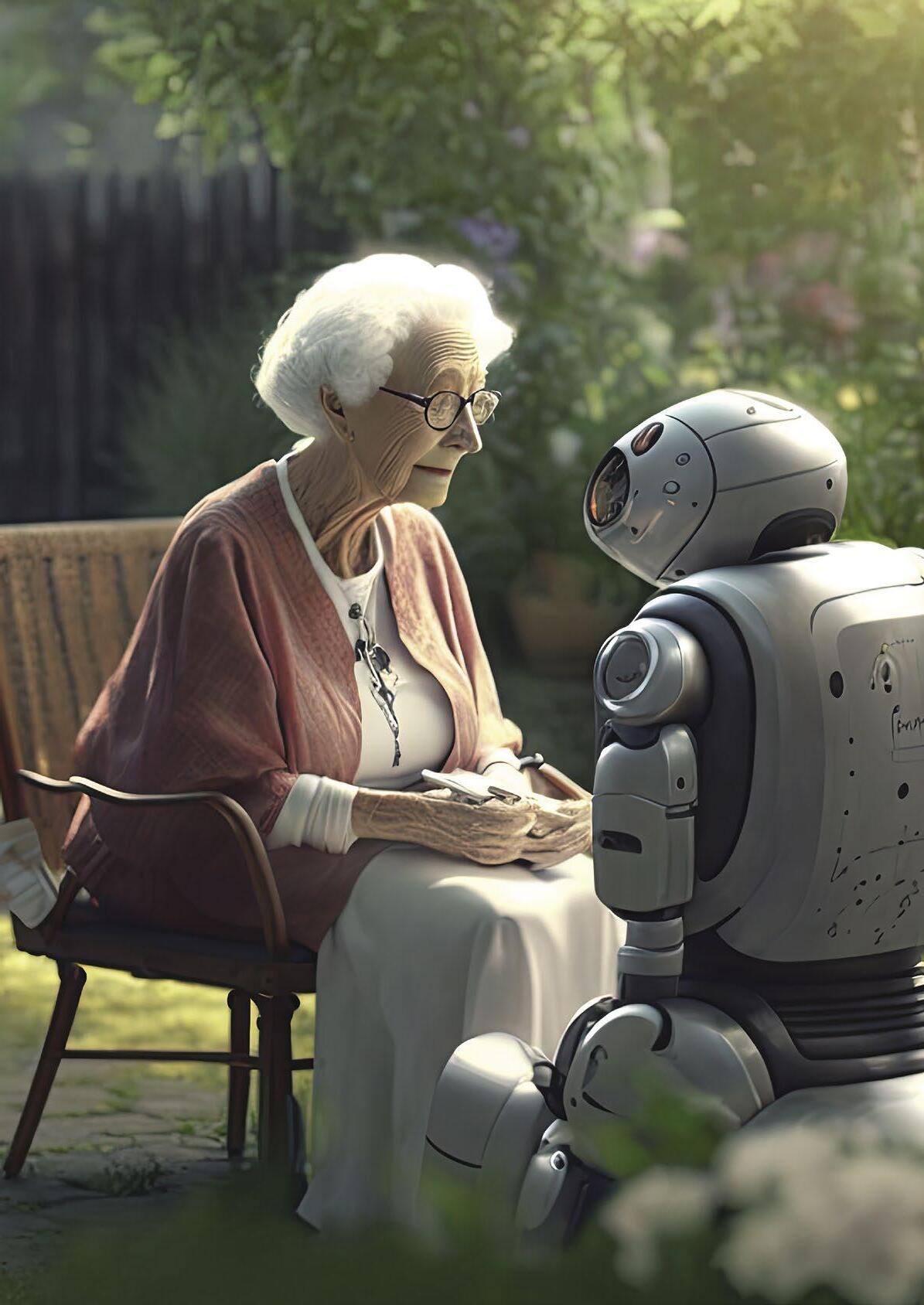
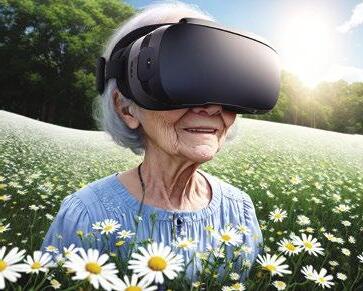
ISSN 2652-8282 9 > 772652 828004 03 NSW/ACT I SPRING 2023 I $9.95 JEAN KITTSON Helping a loved one with their finances australiancarersguide.com.au Plus MAGGIE BEER Spring Favourites Fun & Gamesquizzes,Puzzles,jokes, word games & delicious recipes Tips on INTRODUCING HOME CARE EVERYTHING YOU NEED TO KNOW ABOUT CARING FOR YOUR ELDERLY LOVED ONE How to make the most of MULTIGENERATIONAL holidays ARTIFICIAL INTELLIGENCE How AI will be used in Aged Care What makes a good RESIDENTIAL AGED CARE FACILITY? ❤ Colouring Competition Winners Inside Could laughterbe as beneficial as medicine? The many ways VR IS IMPROVING LIVES OF SENIORS VIRTUAL REALITY


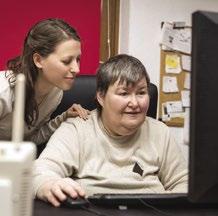




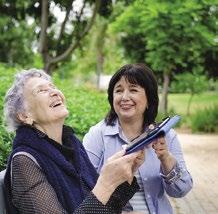



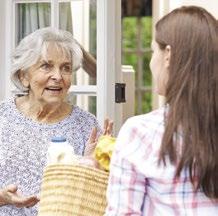



ANY AGE. ANY PLACE. SIMPLY HELPING YOU.




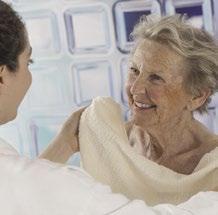





Victoria Melbourne Bayside & Peninsula 03 9574 0924 Inner & South Eastern Central & Northern Melb. 03 9661 0499 Greater Eastern 0448 225 177 North East 03 9001 8585 Outer South Eastern 0406 316 334 Regional Cntrl Hghlnds & Djerriwarrh 03 5341 8046 Geelong & Barwon 03 5261 4808 Gippsland South & West 03 9799 4676 Goulburn Valley 03 5795 1635 Loddon Mallee 03 5486 0203 South West 03 5381 2076 New South Wales Illawarra 02 4244 3470 Sydney West 02 9623 6655 Liverpool 0479 070 119 Queensland Cairns 0458 720 217 Western Australia Lower North Perth 08 9371 9115 South East Perth 0416 205 819

Nurse Next Door Home Care Services believes people can stay in their own homes, regardless of age or ability.
With a purpose of Making Lives Better, Nurse Next Door’s extraordinary family of nurses and caregivers empower you to keep living life to the fullest and maintain a sense of positivity and possibility as you age.
Nursing
Services Include: -
- High-Intensity & Complex Care - Alzheimer's & Dementia Care - 24/7 Caregiving - Respite Care - Palliative Care - Companionship Care - Personal Care - Medication Management
- Transportation
1300 100 247 www.nursenextdoor.com.au
EVERYTHING YOU NEED TO KNOW ABOUT CARING FOR AN AGING LOVED ONE
ABOUT
Australian Carers Guide is a valuable resource for everyone who is caring for an ageing parent, spouse or an elderly loved one. Out of the 2.7 million informal carers in Australia, 1.3 million care for an elderly family member or a loved one. Until now, there has never been anything in the mainstream market specifically for carers. Our guide delivers useful and practical information, all geared toward carers and their wellbeing.
EDITORIAL
PUBLISHER PAK ALLIED MEDIA
EDITOR IN CHIEF Paul Koury
SUB EDITOR Lucy Pearson
CREATIVE DIRECTOR Christine Schiedel
PRODUCTION MANAGER Kristy Hatton
CONTRIBUTORS
Maggie Beer
Jean Kittson
Maree McCabe AM CEO Dementia Australia
Rachel Lane Principal – Aged Care Gurus and Co Author of Aged Care, Who Cares
Anika Wells Hon MP Federal Minister for Aged Care and Federal Minister for Sport
Colin Pudsey - SilVR Adventures
Will Richardson Puzzles supplied by Richardson Publishing Group
COVER IMAGE BY: Freepik
ADVERTISING
ADVERTISING SALES PAUL KOURY paul@acguide.com.au
ADVERTISING SALES MARYANNE SCORRINGE maryanne@acguide.com.au
SUBSCRIPTION SALES AND ENQUIRIES
KYLIE MACKAY kylie@acguide.com.au
1300 717 515
DISTRIBUTION/CIRCULATION
STEVE BISSETT Are Media Pty Ltd
GET IN TOUCH
PUBLICATION OFFICE PAK Allied Media, PO BOX 6155 WANTIRNA, Victoria 3152
Tel: 1300 717 515 Email: hello@acguide.com.au
CARBON FOOTPRINT Printed in Australia using 100% recyclable paper
DISCLAIMER The views expressed in the Australian Carers Guide are the contributors’ and not necessarily those of the Australian Carers Guide and will not be legally responsible in contract, tort or otherwise for any statement made in this magazine.
PRIVACY NOTICE
ACN; 34 611 117 303 Publication Mail Sales Product
Agreement No. 72365477, Australian Carers Guide is published by PAK Allied Media on a quarterly basis. All rights reserved. Contents may not be reproduced without written permission of the publisher. Printed in Australia.
ACKNOWLEDGMENT
The Australian Carers Guide acknowledges the Wurundjeri People as the traditional custodians of the place we now call Bayswater, where this magazine is published. We pay our respects to their Elders, past and present and emerging.
PUBLISHER’S LETTER
Hello everyone!
Welcome to the Spring edition of the Australian Carers Guide. So happy that Winter is finally over. We adore spring for various reasons - especially because it signals new beginnings. The sun emerges, flowers begin to bloom, and most of us get a little extra spring in our step (pardon the pun).
This edition is brimming with positivity. You’ll find uplifting stories designed to lift your spirits, offering optimism to brighten your days and we hope they might even bring a smile to those of us carrying heavy loads.
Lots has unfolded over the past months, and one topic creating quite a buzz is the integration of digital technology and artificial intelligence in Aged Care. Hmmm...I hear you say. What exactly is AI, and how does it impact you and your elderly loved ones?
Our cover story delves into the world of AI (Artificial Intelligence) in Aged Care, uncovering how it addresses the fundamental needs of our beloved seniors in Aged Care facilities. I must confess, I started as a sceptic, but am now comforted to know that by the time I end up in a residential living facility, there will be a lot of digital inclusions to make life more comfortable.
Kudos to the winners of our Winter Colouring Competition! Your effort in meticulously shading birds and flowers in a complex picture is appreciated. A big thanks to everyone who participated. While there's only one winner per state, the champs are… Annie Carter from SA, Anna Killigrew from VIC, Sandra Kennedy from QLD, and Nichola Stibbard from NSW. Check out their winning entries in this edition.
And oh, don't miss out on Maggie Beer's delectable new recipes, sure to enchant your taste buds. Thanks for your ongoing support. Enjoy flipping through this edition of the Australian Carers Guide.
Warm regards,
Paul Koury
PAUL KOURY PUBLISHER

I WELCOME I
Join our community
be part of our community and stay in touch with us on Facebook.
com.au facebook.com/ Australiancarersguide Please send us an Email or write to us at: Editor@acguide.com.au or write to us at: PO Box 6155 Wantirna VIC 3152 General Enquiries: info@acguide.com.au
Call: 1300 717 515
Please
australiancarersguide
Free
AUSTRALIAN CARERS GUIDE I 7
Stay active in your community with an independent support worker.
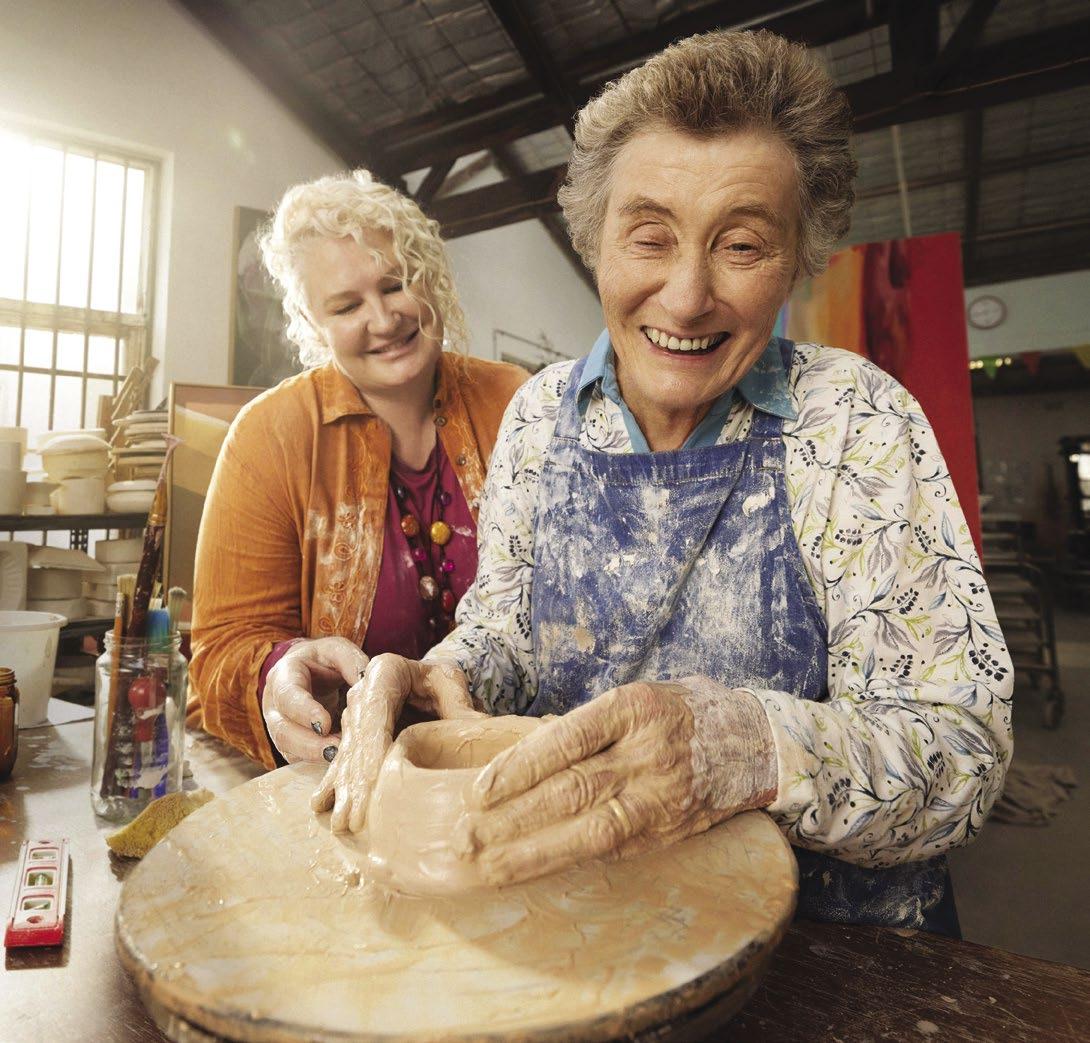
Mable is where you can find independent support workers in your community. Make it easier to keep up with your hobbies and home life by posting a job today.
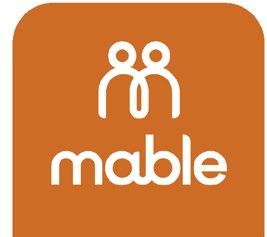
Find aged care support on mable.com.au
Spring

What is inside this issue Features
The healing benefits of humour 30 $
16 COVER STORY: Robotics in age care and how AI can help our elders
22 Cherish the memories: How to make multi-generational trips work for you
30 The importance of humour: Could laughter be as effective as medicine?
36 Caring 101: Everything you need to know about looking after an aged parent
46 At home care: Get seniors to accept in home care so you can take a break
52 Old Money, new tricks: Jean Kittson’s quest to become financially literate
58 Personal story: Dying through my mother’s eyes
64 Residential aged care: How to choose a good aged-care facility
80 Why your body loves moving: Exercising as you age
85 Colour me happy: Announcing our competition winners

AUSTRALIAN CARERS GUIDE I 9
Eat well. Age well.
At Lite n’ Easy, we believe the secret to ageing well is to simply eat well.
Lite n’ Easy is more than just a weight loss solution. We also offer affordable, tasty meals (there’s over 235 to choose from) designed to promote healthy eating, well-being and a better quality of life. There’s no need to shop, cook or clean as our meals are delivered to your door so you can enjoy more free time and independence.
We have even introduced a new range of ‘My Choice’ dinners, soups and desserts designed for people who have a reduced appetite or find it difficult to eat normal sized meals. They provide the same energy and protein as our standard dinners but in a smaller portion, making them easier to finish.
Lite n’ Easy also partners with most Home Care Package providers across Australia, so that seniors can have affordable access to healthy, delicious meals. If you’re eligible, you could save 70% off the cost of your meals.


Lite n’ Easy’s service is flexible with no lock-in contracts or subscriptions, so customers are free to order week-to-week as required.
Think you could benefit from Lite n’ Easy? Visit liteneasy.com.au or call 13 15 12.
Australia’s No.1 Healthy Meal Delivery Service 4 years in a row!
Aunty Barb & her daughter/carer, Yoni
SAVE 30%
Order online using promo code ACG30% or, if you are a HCP recipient, call us on 13 15 12 and mention this offer. Valid for new customers’ first delivery only. Cannot be used with any other offer.

Independence
| Choice | Happiness
“It’s given me back my independence. It’s given me back my health. It’s just wonderful.”


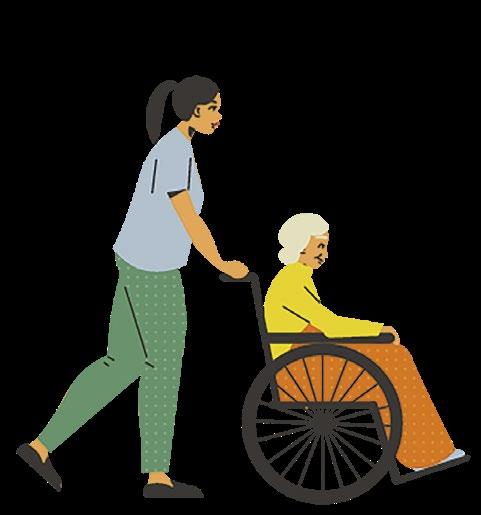

Regulars 12 The Scoop Useful tips and sage advice 14 Your Feedback We love hearing from you. 42 Dementia: Caring for someone with late-stage dementia 50 Q&A Your questions, answered 68 Aged Care Reform: Read about how the changes might affect you 72 Technology How VR technology can change the narrative of aged care living, 86 Comic corner Jokes to brighten your day 88 Residential respite care: Everything you need to know 94 Finance Rachel lane explores everything you need to know about seeking residential financial relief 97 News & Views What’s going on in the caring world 101 Maggie Beer Delicious recipes for you to try 107 Puzzles + Crosswords Games to exercise your brain 119 Editor’s Choice Our editor’s latest recommendations 120 Solutions 121 Helpful contacts All the numbers you might need $ 72 42 How is VR used to bring people together & stimulate and engage Early stage Dementia Rachel Lane, unpacks Financial Relief for those seeking Residential Care News & Views AUSTRALIAN CARERS GUIDE I 11 97
Scoop THE
The latest to keep you in the know!
Healthy habits for Spring

l Grow some seasonal vegetables
Scoop 8
l Enjoy spring’s longer days
l Get more steps in
l Eat fresh produce
l Dedicate some daily me-time
l Prioritize good sleep
l Drink more water
Group exercises, like yoga, tai chi, or Feldenkrais, are fun and social ways to improve flexibility and balance, which are key to preventing falls and maintaining mobility as you age.
Did You Know?
Vitamin D is the only vitamin that’s produced when your skin is exposed to sunlight –but it can be found also in food too – such as oily fish, eggs, butter, cheese and leafy green vegetables. A vitamin that keeps your bones, muscles and teeth healthy, spending just fifteen minutes a day in the sun is enough to get your daily dose!

foodsthatwill helpyoulivelonger
5
1UNSATURATED OILS such as olive oil, avocado oil and walnut oil

2NUTS such as unsalted peanuts and pistachios
3WHOLEGRAINS like quinoa and brown rice
4 FRUITS including bananas and apples
5 VEGETABLES like green beans and broccoli
 All images by freepik
All images by freepik
Tips for a good night’s

Try some cherry juice before bed: If you’re prone to waking up during the night, try sipping on some cherry juice before bed. Packed with high levels of sleep-promoting melatonin, sleep researchers have long praised it as an easy lifestyle tweak that will lead to both better and longer sleep. Avoid late-night sugar: Indulging in a late-night sweet treat might be wreaking havoc with your slumber, according to experts. Sugary foods tend to send your sugar levels spiking, which can go on to crash while you’re asleep. A good rule of thumb is to avoid surgery foods at least 2 hours before bedtime. Avoid napping: While an afternoon nap might seem like a pleasant way to while away a few hours, they can have a negative impact on your sleep hygiene. If you must take a nap, try and limit it to thirty minutes before two in the afternoon.


SUDOKU FOR SENIORS
If you’re looking to better your brain health, why not try to incorporate Suduko into your daily routine? Perfect for people of all ages, it’s great at reflecting and reinforcing a sense of establishing order and completing tasks. Working a Sudoku puzzle through from beginning to end and completing the grid by filling in the blank spaces, can be really a really fulfilling exercise.



TOMATO
5 5 5 4 4 4 4 4 4 1 1 1 1 9 9 9 9 9 3 7 7 2 2 2 2 2 2 8 8 6 6 6 6 3 3 power AUSTRALIAN CARERS GUIDE I 13
However you take them, tomatoes are a great addition to your diet. They boast an impressive number of vitamins, which help support the immune system, improve eye health, and help reduce rates of stroke and heart disease.
sleep
Mail We’ve got
COLOUR ME HAPPY
I wanted to write in and say how much I enjoyed the article in your winter issue about how colour can help us feel better. I was so inspired to read how different colours can promote positive moods to get us through the cold and dark months that I dug out some of my more colourful clothes and have been making a concerted effort to wear them more during winter. It’s made such a difference to my mood. Thank-you.
Ella, Sydney
■ EDITOR’S NOTE: Great to hear, Ella. At Australian Carers Guide, we love wearing brighter colours during winter, and we always notice a positive impact on our mood and mental health too –keep up the good work.

Hello fellow carers, We continue to receive so many emails and hand written letters with your feedback and stories. We enjoy reading them and again it was hard to choose which ones to publish. I think we might have to allocate an extra page to add more of the wonderful feedback we receive.
IN THE GOOD BOOKS
I’ve always loved reading, but I sometimes find it hard to know what to read, or whose recommendations to trust, so I wanted to let you know how very useful your reading recommendations are each issue. It’s often the highlight of the magazine for me, and I’m looking forward to much more good reads to come.
Mark, Orange
■ EDITOR’S NOTE: As big readers ourselves, that’s great to hear Mark! Keep an eye out for new book recommendations each and every issue.
WINTER WARMERS
Beer – and I had to write in to let you know they were absolutely delicious. The potato and leek soup was the perfect winter warmer over a very cold winter, and the warm gingerbread pudding was an indulgent treat. I’ve made them for several friends and family members and none of them could quite believe their luck. Bon appetite!
Mieke, Southern Highlands
■ EDITOR’S NOTE: We’re so glad to hear it Mieke – Maggie Beer certainly knows her way around the kitchen! We understand how hard it can be to come up with new recipe ideas when you’re caring for someone, so we’re thrilled you found these so useful.
IN TOUCH: Send stories, notes, comments and pictures to The Australian Carers Guide PO Box 6155 Wantirna, VIC, 3152, or email us at editor@acguide.com.au.
GET
8 I AUSTRALIAN CARERS GUIDE 14
Are you looking for aged care support?
Through our range of permanent and respite aged care services, we are committed to helping people realise their wellbeing goals and lead meaningful lives.
With almost 30 years’ experience, we know what it takes to care for someone you love. At Regis, we focus on every person as an individual so we can provide the best possible care and help them find the smile in every day.
To find out more about our aged care communities in New South Wales, call us on 1300 998 100 or visit regis.com.au
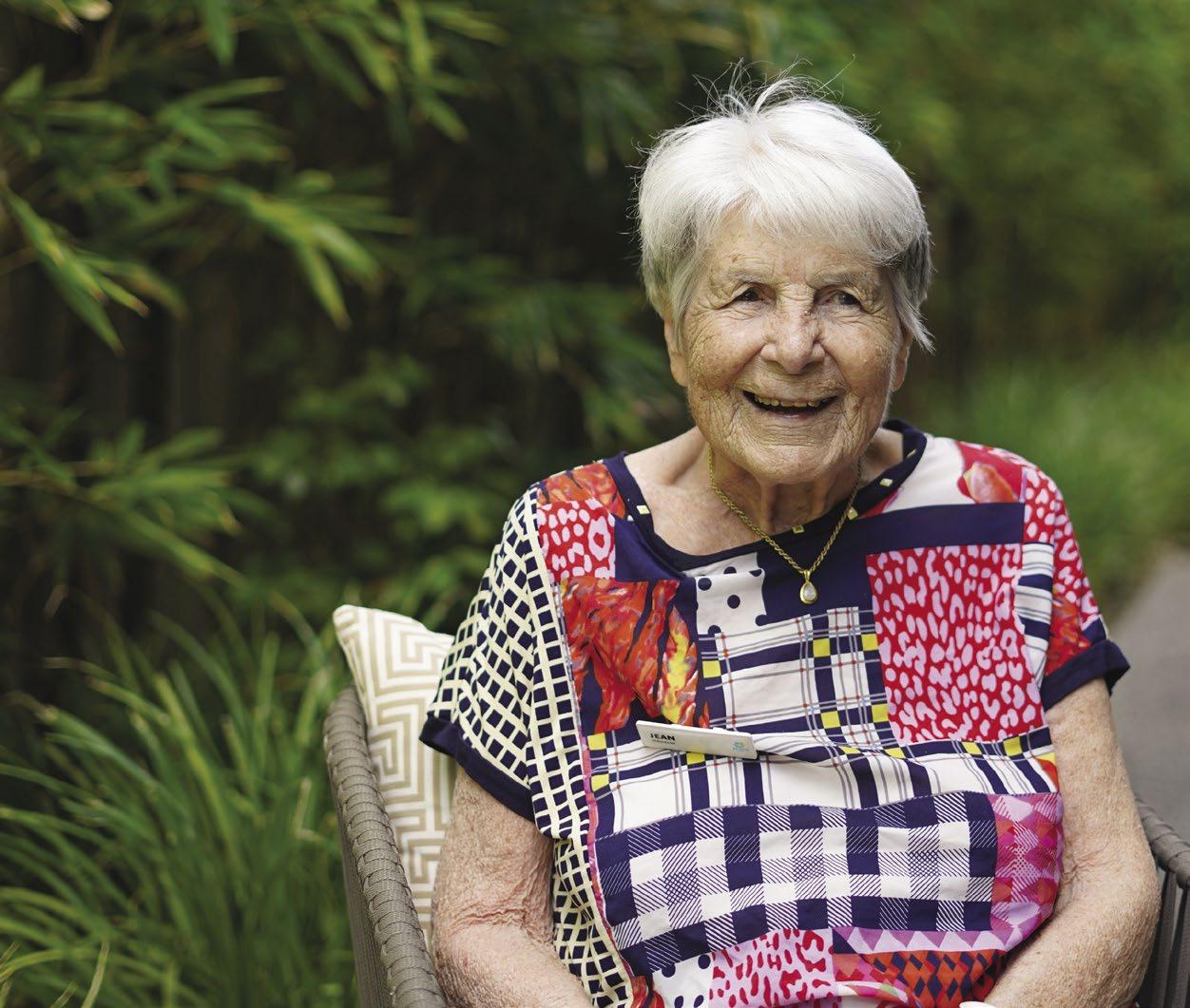
NSW Aged Care
Regis Elermore Vale 156 Cardiff Road, Elermore Vale NSW 2287
Regis Hornsby 245–247 Peats Ferry Road, Hornsby NSW 2077
Regis Hurstville 53–59 Gloucester Road, Hurstville NSW 2220
Regis Port Macquarie 10 Sherwood Road, Port Macquarie NSW 2444
Regis Port Stephens 40 Bagnall Beach Road, Corlette NSW 2315
Regis Rose Bay 84 Newcastle Street, Rose Bay NSW 2029
regis.com.au | 1300 998 100
SCAN TO LEARN MORE

I AUSTRALIAN CARERS GUIDE 16 I COVER STORY I
Could the future of aged care be found in artificial intelligence?
ROBOTICS AGED CARE
BY PAULK
IN
There’s no doubt about it: artificial intelligence is everywhere right now. From AI therapy to chatbots that book travel, it’s a new mode of technology that comes in many forms. And with AI impacting everything from how we shop to how we socialise, it’s important to know that there is a myriad of ways in which we can all benefit from its rapid rise.
Much like many other industries, elderly care is being impacted by this new wave of technology. Both robotic care systems and robot caretakers are being developed and researched with the aim of enhancing the lives of older individuals while reducing the burden on human caregivers.
Robotic care systems are designed to assist the elderly in various aspects of their dayto-day routines, ranging from mobility support to alleviating loneliness and providing cognitive stimulation. These elderly care robots are also equipped with features that ensure the safety and wellbeing of their users, such as fall detection and medication
management. Additionally, robot assistance has the potential to empower seniors to maintain their independence for longer, by allowing them to reside in their own homes longer than they might have otherwise been able to.
In recent years, there have been significant advancements made in robotics to cater to the needs of the ageing population. Robot caregivers have the potential to contribute to improved care quality, staff efficiency, and overall wellbeing for older adults. The integration of robots into aged care systems is an ongoing process, with promising results and a renewed focus on enhancing the golden years for seniors through innovative technological solutions.

AUSTRALIAN CARERS GUIDE I 17 I COVER STORY I
Robot caregivers have the potential to contribute to improved care quality
Benefits of care robots in elderly care
• REDUCED RELIANCE on human caregivers: by automating certain tasks, care robots can lighten the workload of human caregivers, freeing up time for them to focus on more demanding aspects of care.

• INCREASED SAFETY in the home: assistive robots can monitor the environment and help to mitigate any risks, ensuring that older adults can continue living safely in their own homes.
• ENHANCED SOCIAL interaction: While care robots cannot replace the companionship of other humans, they can provide some level of interaction and stimulation for elderly individuals who may otherwise feel isolated.
• ACCESSIBILITY: robot assistants can be available 24/7, providing continuous support to elderly individuals without putting excessive pressure on human caregivers.
The need for robotics in aged care
The global ageing population is increasing, which has led to a growing demand for caregivers and nursing homes. This imbalance between the number of older adults needing care and the availability of caregivers has made robotics in aged care an essential solution to address these challenges. With the advancements in technology, robot caregivers and robot caretakers have been developed, promising to assist and support elderly individuals.
Robotic assistance for elderly care is gaining more attention, as it has the potential to enhance the quality of life. Care robots can provide essential aid, such as carrying items, ensuring medication adherence, and offering emergency alerts to ensure the safety of older adults. These functions enable senior citizens to maintain their independence for longer and potentially reduce the need for higher levels of care.
Robots for elderly care also play a significant role in providing social interaction and companionship, tackling the issue of loneliness among the aged population. Socially assistive robots can engage older adults in conversation and cognitive activities, offering emotional support and reducing the feeling of isolation. This has been shown to have a positive impact on their mental well-being and quality of life.
Furthermore, robots in aged care can assist
All images by freepik
I AUSTRALIAN CARERS GUIDE 18 I COVER STORY I
professional caregivers by alleviating their workload. They can perform tasks such as patient monitoring, lifting, and moving items, making the job less physically demanding for the caregiver. By introducing robots into the caregiving process, it can potentially reduce staff turnover and provide a higher level of care for older adults.
While there is still progress to be made in the development and adoption of care robots, their potential to improve and innovate the landscape of aged care is undeniable. Addressing key ethical and practical concerns, robot caregivers and care robots have the potential to transform the future of aged care, ensuring the well-being and support of older adults in need.
Types of care robots and their applications
Care robots have emerged as an innovative solution to address the challenges faced by the ageing population. They offer various forms of assistance, from companionship to physical support, and are being increasingly used in nursing homes and other aged care facilities.
Paro is a renowned example of an interactive care robot specifically designed for elderly individuals with dementia, by providing companionship and emotional support to residents, aiming to reduce anxiety and loneliness. The technology behind this social robot allows it to respond to touch, voice, and light, creating a comforting
presence for older adults.
Service robots are another important category within the realm of aged care. These robots assist with daily tasks such as serving food, fetching medicine, and carrying items, helping improve the quality of life for senior citizens. Service robots' efficiency and untiring nature make them invaluable carers within a nursing home setting.
When it comes to physical assistance, certain care robots focus on areas such as mobility, exercise, and emergency support. Some robots aid in lifting older individuals who may have difficulty standing up independently, while others provide walking assistance to promote physical activity and prevent falls. Additionally, specific care robots can monitor vital signs and alert nursing staff in the event of a medical emergency, ensuring prompt assistance is provided when needed.
Care robots not only support residents and carers in nursing homes but also empower older adults living alone, offering both companionship and a vital safety net. As technology advances, we can expect to

see care robots catering to an even wider range of needs, seamlessly integrating into the lives of ageing populations and making a positive impact on their well-being.
Activities performed by care robots:
Care robots are becoming an essential part of aged care, assisting elderly individuals in various ways to improve their quality of life. These are some of the key activities performed by these robots.
1Assisting with daily activities: care robots can aid elderly individuals in completing day-to-day tasks such as preparing meals, helping with personal hygiene, and doing light housekeeping. These assistance tasks can promote a sense of independence and selfreliance for the elderly.
2Enhancing mobility and independence with robotic devices: robotic devices have been developed to offer support with mobility and stability. For example, some robots can help lift people in and out of chairs and beds, whilst others can provide physical support when walking or standing.
AUSTRALIAN CARERS GUIDE I 19
3Fall detection systems and preventing accidents: robots equipped with fall detection systems can monitor the movements of elderly individuals and send alerts when a fall is detected. This can help prevent accidents and enable timely medical intervention if required.
4 Cognitive training and rehabilitation through robotics: some care robots are designed to provide cognitive stimulation and rehabilitation. These robots can engage elderly individuals in activities like memory games, puzzles, and exercises, which can contribute to maintaining cognitive abilities and slowing down cognitive decline.
5Housekeeping: care robots can assist with housekeeping tasks, such as vacuuming, dusting, and folding laundry. This can help maintain a clean and organised living environment, which is particularly important for older adults.
6Medication reminders and management: ensuring medications are taken correctly and on time is crucial for the elderly. Care robots can be programmed to remind individuals of their medication schedule and, in some cases, even dispense the appropriate dosages.
7Cognitive stimulation: engaging in social and cognitive activities can help maintain mental well-being. Care robots can facilitate activities such as leading sing-alongs, playing games, or providing companionship for the elderly.
Impact on human care and relationships

The implementation of robotics in aged care has a significant influence on the nature of human care provided to the elderly, as well as their relationships with caregivers and their social environment. The use of personal robots, robot maids, robots in nursing and robotic nurses offers benefits in terms of enhancing the overall quality of care and reducing the workload on human caregivers.
However, there are ethical concerns and challenges that arise in the adoption of robotics within the aged care environment. Ensuring the safety and well-being of elderly patients is crucial, and care must be taken not
to undermine the power of human connection that elderly individuals require. Striking a balance between utilising robotic assistance and preserving human interaction is essential for maintaining meaningful relationships between patients, healthcare providers and caregivers.
Furthermore, the integration of robotics in aged care also raises questions around the ethical implications of delegating tasks to machines that were traditionally performed by humans. While robots can provide assistance with physical and cognitive tasks, it is important to ensure that the use of technology does not lead to a reduction in the quality of care provided to elderly patients.
Another ethical concern is the potential for elderly individuals to become overly reliant on robotic assistance, leading to a loss of independence and autonomy. It is important to ensure that the use of robotics in aged care is not seen as a replacement for human interaction and care, but rather as a complementary tool that can enhance the quality of life for elderly individuals.
It's important to remember that while robotics can have a beneficial impact on the quality of human care within the elderly care sector, the importance of human interaction and connection must not be overshadowed in the pursuit of technological advancements. ACG
I AUSTRALIAN CARERS GUIDE 20 I COVER STORY I
Paro is a renowned example of an interactive care robot specifically designed for elderly individuals with dementia.
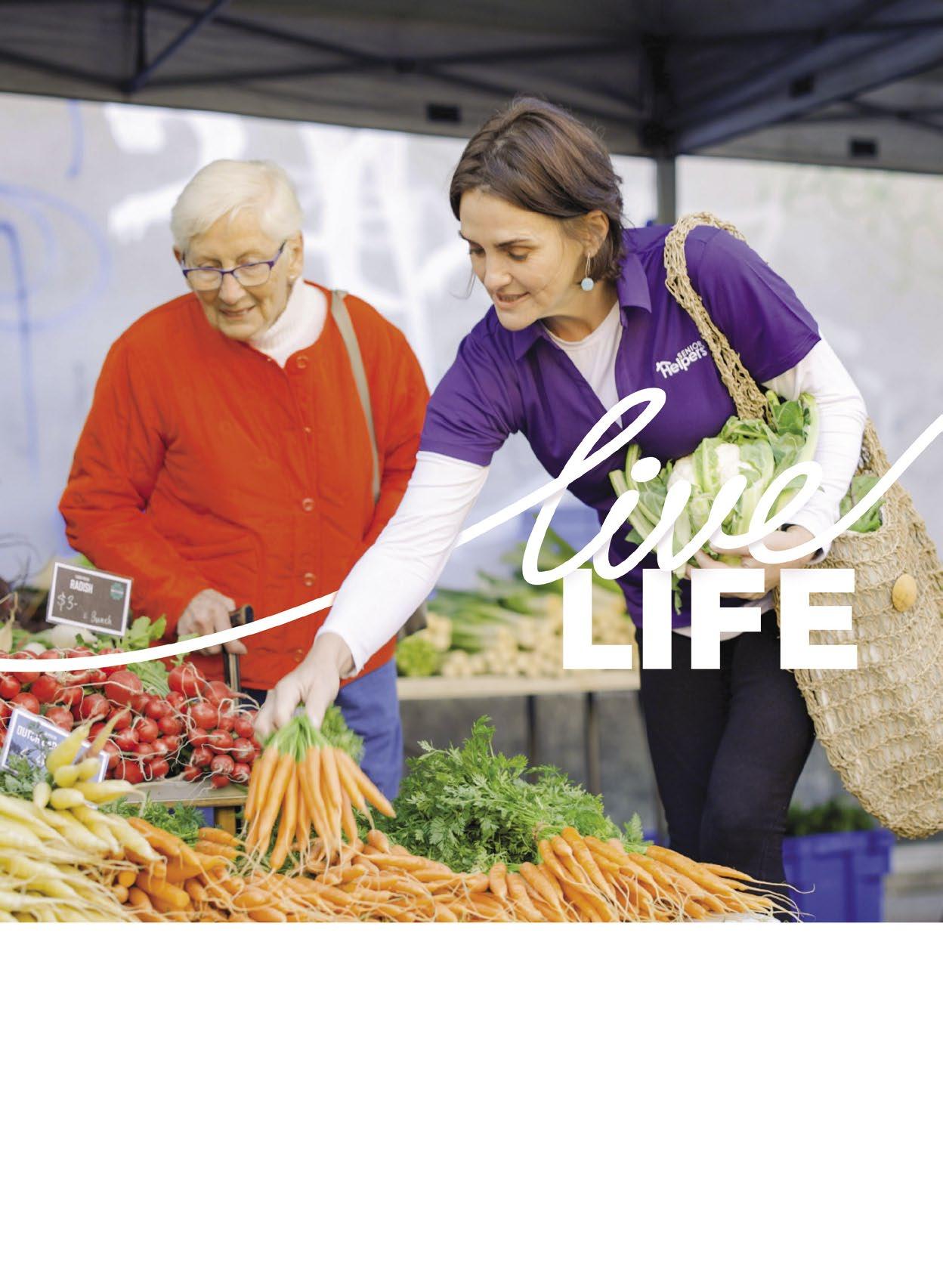


FAMILY HOLIDAY
Here’s how to make multi-generational holidays work for you

 BY PAULK
BY PAULK
I AUSTRALIAN CARERS GUIDE 22
tips
These days, a growing number of individuals are embracing the concept of multi-generational living. It’s a trend that has grown in popularity in recent years, as families strive to foster closer bonds and

cultivate memories that will last long beyond the end of the holiday. And while the number of generations travelling together show no signs of subsiding, there’s no doubt that travelling with a range of family members – from grandparents to newborns – will bring with

AUSTRALIAN CARERS GUIDE I 23
it a certain number of challenges.
Extra care must be taken when it comes to the organizational side of things. From sleeping arrangements - which require careful consideration - to modes of transport, to meal times and beyond, such factors, if at all possible shouldn’t be left to chance. But, with some prudent planning and thoughtful groundwork, it is possible to craft a trip that will allow all family members to rediscover the joys of the ties that bind them, and to enjoy a memorable experience for all the family.
The benfits of multigenerational travel
Multi-generational travel is a growing trend that essentially refers to trips that involve grandparents, parents, and children travelling together. These trips can be immensely rewarding, but they can also be more complicated to plan than other vacations. With more people (and ages) on the vacation than a typical family holiday, there are more travel interests to please and potential limitations to consider.
One of the most significant benefits of multi-generational travel is that it brings the entire family together. Spending quality time with family members can help build stronger relationships and create lasting memories. Multi-generational travel

provides an opportunity for grandparents to bond with their grandchildren and for both sets of parents to spent time with their children. It’s also a great way to reconnect with family members who live far away and to strengthen family ties. However, it is essential to plan the trip carefully to ensure that everyone is happy and at ease.
Multi-generational travel allows family members to share experiences and create memories together. It provides an opportunity to explore new destinations and try new activities as a family, which can create a sense of togetherness and provide a shared sense of adventure. It also allows family members to learn from each other and to appreciate different perspectives.
When planning a multigenerational trip, it is crucial to consider the needs and interests of everyone involved. For example, grandparents may prefer a more relaxed pace, while children may want to participate in more active pursuits. It is also important to consider any mobility or health issues that may affect family members.

How to choose your destination
A key consideration when planning a multi-generational trip is the destination. It’s crucial to choose a location that offers a range of activities and attractions that will appeal to everyone,

I AUSTRALIAN CARERS GUIDE 24
Multi-generational travel is a growing trend, which refers to trips that involve grandparents, parents, and children travelling together.
regardless of their age. All-inclusive resorts can be an excellent option for multi-generational trips as they tend to offer a range of activities and amenities that cater to different age groups and interests.
From beach resorts to national parks, there are a variety offer travel can activities
kayaking, and skiing or choose to relax on a beach or by the pool. Some destinations also offer experiences, such as museums, historical sites, and local opportunity for families to learn and explore together.
TOP ACTIVITES

HERE ARE SOME FUN IDEAS AND THE BEST FAMILY VACATION SPOTS THAT CAN BE ENJOYED BY FAMILY MEMBERS OF ALL AGES.
1
MUSEUM AND ART GALLERY
Museums and art galleries offer a wealth of educational and cultural experiences. Look for institutions that have interactive exhibits, audio guides, or guided tours designed to engage visitors of all ages. Some museums even have dedicated areas for children, making it a family-friendly activity. You can also immerse yourself in art and culture at the National Gallery of Victoria in Melbourne, where you can admire an extensive collection of Australian and international artworks.
2

BOAT TOURS AND CRUISES

Explore coastlines, rivers, or lakes through boat tours or cruises. These trips provide scenic views and opportunities for relaxation. Choose tours with options for shorter or longer durations, ensuring that participants can comfortably enjoy the experience. Enjoy a scenic boat tour along the Swan River in Perth, taking in the picturesque views of the city skyline, parks, and vineyards that line the riverbanks.
WILDLIFE AND NATURE EXPEDITIONS
Engage with nature by going on wildlife safaris, bird-watching tours, or nature walks. Many destinations have national parks, botanical gardens, or nature reserves where you can experience the beauty of the outdoors while learning about local flora and fauna. The whole family can experience a wildlife encounter at Kangaroo Island in South Australia, where you can see kangaroos, koalas, and sea lions in their natural habitats.
AUSTRALIAN CARERS GUIDE I 25
It’s crucial to choose a location that offers a range of activities and attractions that will appeal to everyone, regardless of their age.
5

4 BEACH AND WATER ACTIVITIES
Spending time at the beach provides opportunities for relaxation and fun. Engage in activities like swimming, building sandcastles, beach volleyball, or renting water sports equipment. Ensure that safety measures are followed, especially when children or elderly family members are involved.
OUTDOOR ADVENTURE PARK
Visit adventure parks or outdoor recreational areas that offer a variety of activities suitable for different ages. Options may include zip-lining, rope courses, hiking trails, and mini-golf. Such parks often have facilities for younger children and more challenging courses for older family members. One such adventure is the Great Barrier Reef in Queensland where you can snorkel or dive, exploring the stunning underwater world teeming with colourful coral reefs and marine life.
accommodation, make sure you choose a property that provides enough space for everyone to be comfortable. Family suites or villas with multiple bedrooms and bathrooms can be an excellent option for multigenerational travel.

Importance of planning multigenerational travel
Planning is crucial when it comes to multigenerational travel. It helps ensure that all members of family have a great time and that the trip runs smoothly. Multigenerational travel usually involves people ages, interests, and abilities. Planning helps to accommodate
I AUSTRALIAN CARERS GUIDE 26
everyone’s needs, ensuring that no one feels left out or uncomfortable. If you have an elderly relative who will be joining you, make sure that the accommodation is accessible and that there are activities that they can enjoy. By considering the diverse requirements of the group, you can create an itinerary that offers a variety of experiences and caters to the interests of all family members.

Multi-generational travel offers an enriching experience, providing an opportunity for families to bond, share experiences, and create lasting memories. From the best summer vacations for families to budget-friendly options, the possibilities are endless. The key is to plan ahead, consider the needs and interests of each family member, and most importantly, enjoy the precious time spent together. With careful planning and consideration, your next family vacation could very well be your best one yet. ACG
6
COOKING CLASSES
Culinary experiences can be enjoyable and educational for all ages. Consider taking a cooking class where everyone can learn to prepare local dishes or participate in a food-tasting tour to sample regional specialties. Look for classes that offer options for different dietary preferences or restrictions.

7
HISTORICAL SITES AND LANDMARKS

Visit historical sites and landmarks to discover the past of a destination. Many places offer guided tours that cater to different age groups, providing interesting stories and insights into the local history. Look for sites with accessible paths and facilities to accommodate all participants. One such option is exploring the convict history of Tasmania, by visiting Port Arthur Historic Site, a UNESCO World Heritage-listed destination that offers guided tours and fascinating insights into Australia’s colonial past.
8
THEME PARKS

Theme parks can be a source of excitement and entertainment for multi-generation. They typically offer a wide range of attractions, from thrilling rides to shows and performances. Consider parks with areas dedicated to younger children, as well as less intense rides suitable for older family members.
9
GUIDED CITY TOURS
Explore the highlights of a destination through guided city tours. These tours typically involve walking or taking a bus, allowing everyone to experience local culture, history, and landmarks. Choose tours with flexible itineraries and options for breaks, so participants can rest if needed. For example, you can explore the vibrant city of Sydney with a guided tour, visiting iconic landmarks such as the Sydney Opera House, Sydney Harbour Bridge, and the historic Rocks district.

AUSTRALIAN CARERS GUIDE I 27
Images by shutterstock and freepik, denamorado, kstudio, katemangostar, mrsiraphol, rawpixel, Racool_studio on Freepik
Do you need a break? We’re here for you
At Allity, we are here to support you through the planning of your loved one’s respite care.
As a carer, it is important to take time for yourself to rest and recharge.
Whether you are planning a break, have appointments scheduled or should an emergency arise where immediate care is required, we are here for you.
Who can benefit from respite?
• A carer who is unwell needing time to recuperate
• Carers feeling overwhelmed and needing support with a loved one
• GP, Hospital Social Worker or Allied Health Specialist needing a patient care solution
How do I access respite?
• Getting access to respite is as simple as contacting the Allity Home closest to you for more information or assistance
Our New South Wales Network
With 13 purposefully designed Homes located across New South Wales, the choice is always yours. Be it affordability, convenience, luxury or a combination, we are here to provide the support and services that are important to you
Allity is part of Bolton Clarke Group, Australia’s largest independent, not-forprofit provider of home care, retirement living and residential aged care.
• With Aged Care Assessment – Standard Respite Fees apply as well as additional services at the Home.
• Without Aged Care Assessment – Resident needs to be over the age of 65 and be likely to receive approval on Aged Care Assessment. Should they not qualify, Private Respite Fees apply

Bass Hill Aged Care
119 Robertson Road, Bass Hill (02) 9644 6122
Nestled in peaceful surrounds in Sydney’s South West, Bass Hill is designed on one level and offers single and companion rooms. The Home has a variety of social areas where residents can enjoy activities, relax or catch up with family and friends.
Bayside NSW Aged Care

136 Marconi Road, Bonnells Bay (02) 4973 6799
Bayside offers bright and spacious single and companion rooms, many with outlooks to landscaped gardens. The Home features a dedicated Memory Support neighbourhood providing a secure place for residents living with dementia.

Making every day the best it can be | www.allity.com.au
B16075
Beechwood Aged Care
3-17 Albert Street, Revesby (02) 8774 5400
Beechwood is well-established in the local community, with spacious single and companion rooms and a Memory Support neighbourhood, for residents living with dementia. A café, sunny internal courtyards and gardens provide space to enjoy privacy or the company of friends and family.
Brentwood Aged Care
28 Glebe Street, Parramatta (02) 9635 1114
Brentwood has a welcoming family-orientated atmosphere and long-standing, multilingual staff to support the culturally diverse resident community. The Home offers a selection of single and shared rooms and has a secure Memory Support neighbourhood for residents living with dementia.
Calare Aged Care
124 March Street, Orange (02) 6362 2311
Calare is an established Home, well known in the Orange community for its expertise in supporting people living with dementia. Residents have the choice of bright and spacious single or companion rooms, all with an aspect to external gardens.

Coastal Waters Aged Care

100 The Wool Road, Worrowing Heights (02) 4443 0077

Situated near Jervis Bay on the NSW South Coast, Coastal Waters reflects the relaxing environment of the coastal lifestyle. Offering single and companion rooms, the Home also has a dedicated Memory Support neighbourhood for residents living with dementia.
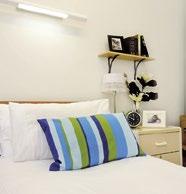
Greenwood Aged Care
9-17 Hinemoa Avenue, Normanhurst (02) 9372 3400
Located in Sydney’s leafy Upper North Shore, this Signature Home exudes sophistication yet projects the warmth of an elegant home. Greenwood offers a variety of spacious single rooms and suites across 5 neighbourhoods with a barista café, extensive outdoor areas and manicured gardens.

Gosling Creek Aged Care
1503 Forest Road, Orange (02) 6369 9800
Gosling Creek is positioned on spacious grounds and its design was inspired by the traditional Australian country homestead. The Home offers spacious single bedrooms with private ensuites, most with a veranda and direct access to courtyards or landscaped gardens.
Pemulwuy Aged Care
11 Pastoral Circuit, Pemulwuy (02) 8863 9000

Located in Sydney’s West near Greystanes, Pemulwuy is a purpose-built Premium Home. The private single rooms were designed with views to landscaped gardens or courtyards. The wide range of garden areas, lounges and the café are perfect for entertaining family and friends.
Pendle Hill Aged Care
2 Wyena Road, Pendle Hill (02) 9631 1066
Located in Sydney’s Western Suburbs, Pendle Hill has an unrivalled reputation for services to the community spanning 30 years. The Home offers all levels of permanent and respite care with a selection of single, double or companion rooms with courtyard views.


Redleaf Manor Aged Care
16 Flavelle Street, Concord (02) 8762 6000
Redleaf Manor is an Extra service Home that provides comfort and luxury. You can enjoy a pampering session at our hair salon or catch up with family and friends at the barista café. It offers single and companion rooms with a variety of indoor and outdoor spaces.


Rosemore Aged Care

18 Kingsgrove Road, Belmore (02) 9718 6156
Rosemore offers a variety of single and companion rooms all with an abundance of natural light. Residents can also enjoy the comfort and tranquillity of the sun-lit courtyard, ideal for entertaining or relaxing with friends and family.

Willandra Aged Care
19-21 George Street, Marrickville (02) 9569 4117
Centred around a sunny and charming courtyard, residents can enjoy their activities in a warm and tranquil atmosphere. Willandra offers bright and airy single and companion rooms. Multilingual staff are on-hand to assist with the needs of the culturally diverse residents.
Making every day the best it can be | www.allity.com.au




I AUSTRALIAN CARERS GUIDE 30
COULDlaughter
BE AS EFFECTIVE AS MEDICINE
BY PAULK
The healing benefits of humour
In our pursuit of health and wellbeing, we often turn to various medical treatments, therapies, and medications. Yet, amidst the complexity of modern healthcare, there is a simple, age-old remedy that has the power to uplift our spirits and heal us in ways we might never have imagined—laughter.

Laughter is a powerful and universal human experience. It has the ability to transcend cultural and language barriers, bringing people together in moments of joy and amusement. But can laughter also have tangible health benefits?
Could it be true that laughter is the best medicine?
While laughter cannot replace conventional medical treatments or therapies, it holds immense potential as a complementary approach to
healing based on studies. Let’s learn what laughter is, its influence on our brain and body, the benefits of laughing, and why laughter is good for you.
What is laughter?
Laughter is a complex physiological response that is often triggered by something humorous or amusing. It is a universal human experience that transcends language and culture, and has been studied by scientists, philosophers, and comedians alike. But what exactly is laughter, and why do we do it?
At its core, laughter is a form of communication. It is a way for us to connect with others, to share our emotions, and to express our feelings. When we laugh, we are sending a signal to those
AUSTRALIAN CARERS GUIDE I 31
around us that we are happy, amused, or entertained. This signal can be contagious, and can spread throughout a group of people, creating a shared experience of joy and happiness.
Laughter is a powerful tool for building and maintaining social connections. When we laugh with others, we are signalling our approval, agreement, and acceptance. This can help to create a sense of belonging and connectedness that is essential for our emotional well-being. Laughter can also be used to diffuse tension and resolve conflicts, as it can help to break down barriers and create a sense of shared experience.
But laughter is not just a social behaviour. It is also a complex physiological response that involves multiple regions of the brain and the body. When we laugh, our brain sends signals to our facial muscles, causing them to contract and produce the characteristic sound we all recognize as laughter.
10 Health Benefits of Laughter
So, is laughter good for you? Let’s take a look deeper at the ten health benefits of laughter:

1. Reduces stress hormones in the body



Laughing has been scientifically proven to lower cortisol levels, the primary stress hormone in our body. This reduction in cortisol helps alleviate stress and anxiety, providing a sense of calm and relaxation. By incorporating laughter into our daily lives, we can effectively manage stress and promote overall well-being. It’s no wonder that laughter therapy, also known as laugh therapy or laughing therapy, is gaining recognition as a powerful tool for stress reduction and emotional balance.
2. Boosts the immune system
When we laugh, our body experiences a surge of endorphins, often referred to as the “feelgood” hormones. These endorphins not only enhance our mood but also stimulate the activity of immune cells, bolstering our body’s natural defence mechanisms. A robust immune system is essential for fighting off infections, illnesses, and diseases. By indulging in a good belly laugh, we can give our immune system a valuable boost and improve our overall health.
3. Enhances mood
Laughter is a natural mood enhancer. It is a simple yet effective way to find happiness, and many of us look for ways to incorporate it into our daily lives. The release of endorphins during

Laughter is a powerful tool for building and maintaining social connections.”
I AUSTRALIAN CARERS GUIDE 32
laughter promotes feelings of happiness, contentment, and overall improved mood. These feel-good hormones create a sense of well-being and can help combat feelings of sadness, anxiety, or depression. Incorporating laughter into our daily routine, whether through watching a comedy show, sharing jokes with friends, or engaging in laughter exercises, can have a profound positive impact on our emotional state and overall quality of life.
4. Diminishes pain
Laughter has been found to have pain-relieving effects. When we laugh, our body releases natural painkillers, such as endorphins, which can provide temporary relief from physical discomfort. This natural analgesic effect of laughter can be particularly beneficial for individuals dealing with chronic pain conditions or recovering from injuries. It serves as a pleasant distraction, reducing the perception of pain and promoting a sense of wellbeing.
5. Protects from the damaging effects of stress






Chronic stress takes a toll on our physical and mental health. However, laughter acts as a buffer against stress, mitigating its harmful effects on our body and mind. Regular laughter helps regulate stress hormones, such as cortisol, and reduces the physiological responses associated with stress, such as increased heart

rate and blood pressure. By incorporating laughter into our daily lives, we can better protect ourselves from the negative consequences of chronic stress and maintain a healthier, more balanced lifestyle.
6. Lowers blood pressure
Regular bouts of laughter have been linked to a decrease in blood pressure. When we laugh, our blood vessels dilate, promoting better blood flow and reducing resistance in our arteries. This improvement in cardiovascular function leads to a decrease in blood pressure levels, reducing the risk of cardiovascular problems, such as heart attacks and strokes. Laughing truly does have a positive impact on our heart health, making it an enjoyable and effective way to maintain a healthy cardiovascular system.
7. Increases oxygen intake
Laughter is like a natural aerobic exercise for our respiratory system. When we laugh, our breathing becomes deeper and more frequent, resulting in an increased intake of oxygen. This enhanced oxygen supply benefits our lungs and body tissues, providing them with vital nutrients and promoting overall vitality. So, laughter not only feels good but also supports our body’s physiological processes, ensuring optimal functioning.
8. Stimulates the heart, lungs, and muscles
Laughing is not just a passive response; it actively engages our cardiovascular system and various muscle groups. When we laugh, our heart rate and blood circulation increase, delivering oxygen and nutrients to our muscles. Additionally, laughter stimulates our respiratory system, exercising our lungs and diaphragm. This stimulation of the heart, lungs, and muscles promotes a healthier cardiovascular system, improves lung capacity, and contributes to overall physical fitness. So, while it may not replace a rigorous workout, laughter does offer some physical benefits.
9. Releases endorphins of feel-good hormones
Laughing triggers the release of endorphins, our body’s natural feel-good chemicals. These endorphins
AUSTRALIAN CARERS GUIDE I 33
Regular bouts of laughter have been linked to a decrease in blood pressure.”
not only enhance mood but also create a sense of euphoria and a natural high. The release of endorphins during laughter can be invigorating and uplifting, providing a welcome respite from daily stressors and promoting an overall sense of well-being.



10. Improves cognitive function






Laughter has been found to have a positive impact on cognitive abilities. When we laugh, our brain releases endorphins and other neurotransmitters that improve focus, memory, creativity, and problem-solving skills. In fact, studies have shown that laughter can enhance cognitive function and may even improve academic or professional performance. So, the next time you’re
facing a challenging task or trying to think outside the box, taking a moment to laugh may just boost your cognitive abilities and make the process more enjoyable.

Laughter Therapy and Its Benefits

Laughter Therapy, also known as Humor Therapy, involves using laughter to improve a person’s wellbeing. It is based on the idea that laughing is not only enjoyable but also good for our health. Laughter Therapy involves activities that make people laugh. These activities could include laughter exercises, chatting in groups, or watching funny videos. One popular form of Laughter
Therapy is Laughter Yoga, which combines laughter with deep breathing exercises. The aim is to laugh not because something is funny, but as a form of exercise.
Where is Laughter Therapy Used?
Laughter Therapy is used in many places. Hospitals are
using it to help patients feel better and to improve their healing. Aged care homes use it to make the residents feel happier and more connected. Even companies are using Laughter Therapy in programs to reduce stress among their workers.
Laughter Therapy shows that laughter really can be the best medicine. Laughing helps both the body and the mind. It can make us feel better, help us deal with pain, and even help us make friends. This therapy is being used more and more in hospitals, homes for the elderly, and companies. Including laughter in our daily lives can be a simple but powerful way to improve our well-being.
In the present days where stress, anxiety, and various health challenges can sometimes overwhelm us, harnessing the power of laughter can be a simple yet effective way to take care of ourselves. Laughter goes beyond a simple expression of amusement. It has profound effects on our mental, emotional, and physical well-being. From reducing stress and boosting our immune system to strengthening relationships and enhancing cognitive function, laughter offers a myriad of health benefits. By incorporating laughter into our everyday lives, embracing humour, and seeking out opportunities to laugh, we can lead happier, healthier lives. ACG
All
images by Shutterstock and freepik
I AUSTRALIAN CARERS GUIDE 34
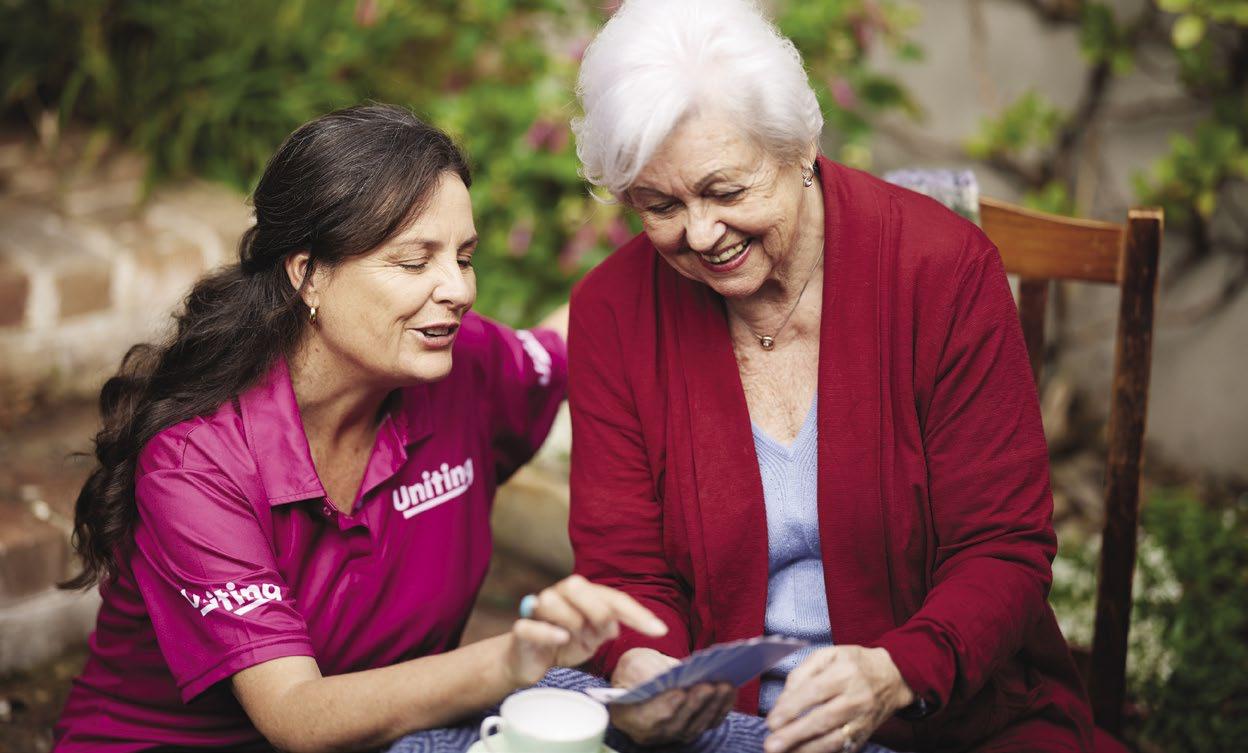
© Copyright Uniting NSW.ACT 2023 23-HCC-576.JUL23 When caring for a loved one, we understand that self-care may be the last thing on your mind, or on your list. Yet taking care of yourself is a necessity, not a luxury – it helps you to keep caring for others. Let us take on the caring for a while, so you can take some well-deserved time out. We can help with: Take the break you deserve. Call us 1800 864 846 Or visit uniting.org/aged-care Home and community care Support with cleaning, shopping, cooking, personal care and more. Respite care Support in your home or ours, for a few hours or a few days. Residential aged care 24/7 nursing and memory support in a homelike environment.
of caring for an THE CHALLENGES AGED PARENT
As our parents age, they may face a range of physical, emotional, and cognitive changes that can impact their independence and daily functioning. Tasks that were once simple and effortless for them may now require assistance or support. From managing medical appointments and medications to making the home safe, the responsibilities of caring for an elderly parent can be overwhelming.
As someone begins to advance towards old age, their body undergoes physical changes. Their strength diminishes, mobility may become limited, and chronic health conditions may arise. Simple tasks like getting dressed, walking up the stairs, or even preparing a meal can become arduous. Such changes often require caregivers to step in and provide practical assistance, adapt the living environment to ensure safety and facilitate access to necessary medical care.
Cognitive alterations are also part of the ageing process. Memory lapses, difficulty concentrating, and slower information processing become more common as individuals grow older. These changes can impact various aspects of daily life, such as managing finances, following medical instructions, or even recalling familiar faces and names. Understanding the cognitive challenges faced by ageing parents is crucial for caregivers to provide appropriate support, encourage mental stimulation, and implement strategies to enhance their overall well-being.
Recognizing and addressing these challenges can significantly enhance the caregiver's ability to
assist their ageing parent in navigating life's intricacies. By acknowledging the physical and cognitive changes, caregivers can approach their role with empathy and patience, fostering an environment that promotes dignity and independence for their loved ones. Additionally, understanding the specific needs and limitations of an ageing parent enables caregivers to identify appropriate resources and interventions, whether it's arranging for inhome assistance, exploring memory enhancement exercises, or seeking professional medical advice.
Common challenges of caring for an aging parent
Caring for elderly parents is a task that requires of love, patience, and understanding. As individuals age, they often encounter a range of physical and emotional changes, making it crucial for caregivers to be fully aware of these transformations.
From emotional support to financial implication, here’s how to make looking after an aged parent work
I AUSTRALIAN CARERS GUIDE 36
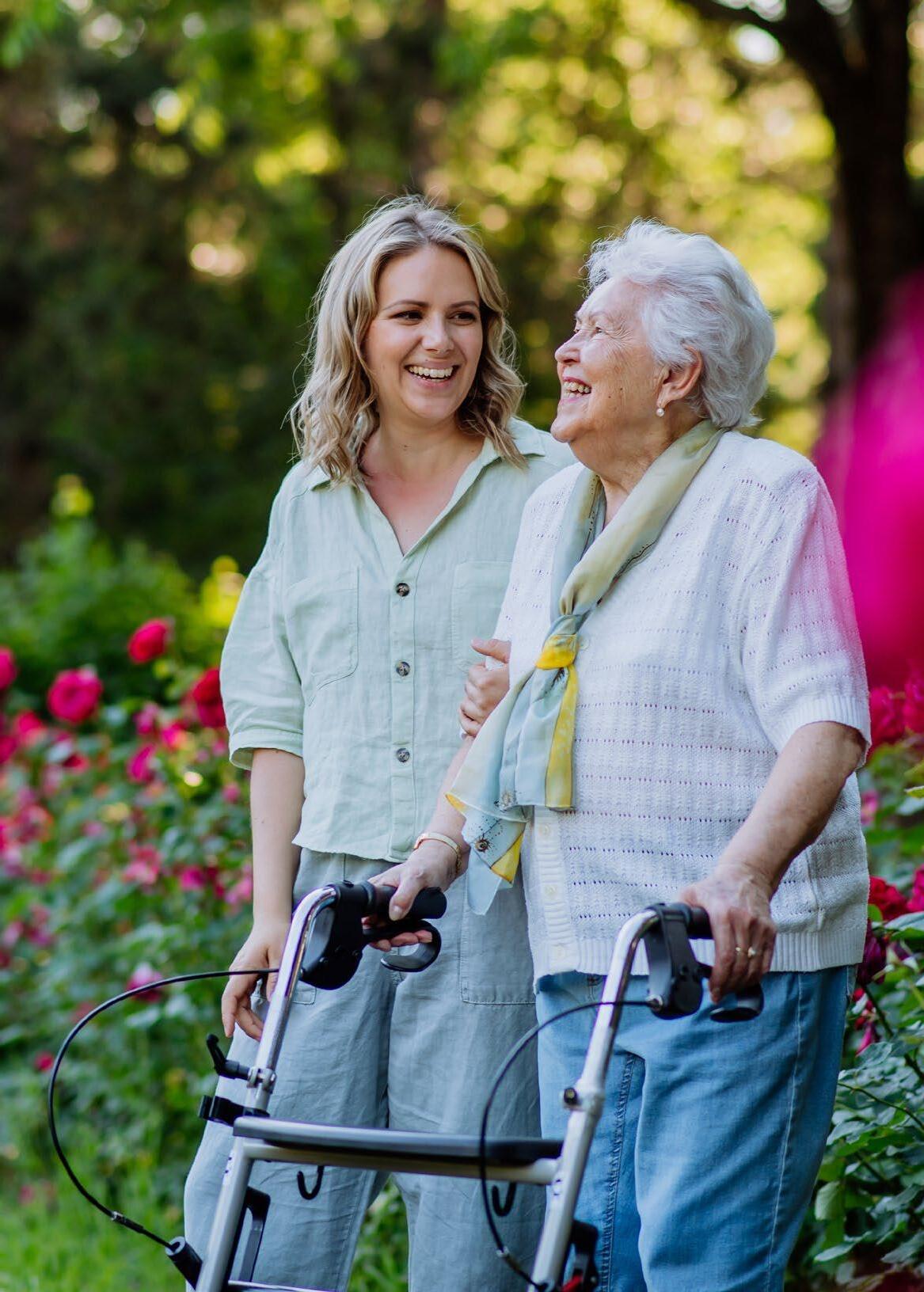
AUSTRALIAN CARERS GUIDE I 37
Caring for elderly parents is a task that requires of love, patience, and understanding.
PHYSICAL CARE NEEDS
As parents age, they may encounter a decline in physical capabilities, ranging from limited mobility to chronic health conditions that can significantly impact an individual's daily life. Caregivers must navigate these physical changes by ensuring a safe living environment, helping with tasks that have become difficult, and coordinating medical care to maintain their parent's overall health.
2 EMOTIONAL SUPPORT
The emotional wellbeing of ageing parents is a key concern. They might grapple with grief, loneliness, or the loss of independence. It’s essential to provide a listening ear, encourage expression of emotions, and validate their feelings. Additionally, fostering social connections and encouraging participation in activities that bring joy and purpose can greatly enhance their emotional well-being.
3FINANCIAL STRAIN
The financial aspect of caring for an ageing parent can pose significant challenges. Medical expenses, long-term care arrangements,
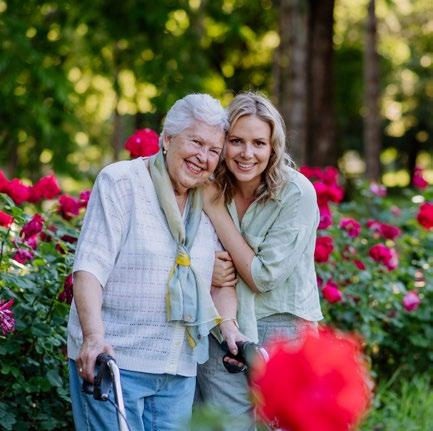
and medication can create a financial burden for both the elderly parent and the caregiver. Navigating complex insurance systems, exploring available benefits, and seeking financial assistance when needed are essential steps in managing this challenge.
4
TIME MANAGEMENT
Caregiving can be timeconsuming, and striking a balance between personal life, career, taking care of a parent and other responsibilities is a substantial challenge. Creating a daily schedule, delegating tasks where possible, and considering part-time caregiving support can prove helpful in managing time effectively.
5
LOSS OF INDEPENDENCE
One of the most significant challenges faced by ageing parents is the loss of independence
6
DEALING WITH NEGATIVE ATTITUDES
they may experience. Tasks they once handled effortlessly may now require assistance or delegation. This loss can be accompanied by feelings of frustration or a sense of burden. Caregivers should strive to empower their parents by involving them in decision-making processes, promoting autonomy wherever possible, and finding a balance between ensuring their safety and respecting their autonomy.
7
MEDICAL KNOWLEDGE AND COORDINATION
Caring for an elderly parent often involves managing medications, appointments, and communicating with healthcare professionals, which can be daunting if you’re not familiar with the
Ageing parents may sometimes exhibit a negative attitude and difficulty in dealing with anger and emotions. It's essential to approach these attitudes with understanding, knowing that they might stem from frustration or fear. Maintaining calm, providing reassurance, and seeking mental health support, if necessary, are strategies that can be employed.
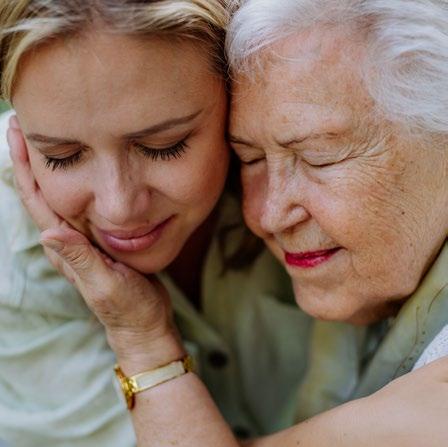
1
I AUSTRALIAN CARERS GUIDE 38
COMMUNICATION ISSUES
As parents age, they may experience cognitive decline. This can make communication difficult, as they might not be able to express themselves clearly or understand what is being said. Speaking slowly, using simple sentences, and employing non-verbal communication can facilitate better understanding. It's also crucial to practise patience and not rush them through conversations.
medical field. Keeping a record of medical history, medications, and upcoming appointments is beneficial. Communication with healthcare providers for clarifications and advice is also essential.
9HANDLING RESISTANCE
Elderly parents may sometimes be reluctant or resistant to receiving help, which calls for a delicate balance of assertiveness and compassion. To handle resistance, explain the reasons behind certain decisions and involve them as much as possible. Sometimes, involving a third party, such as a doctor or social worker, can also be helpful in these situations.
the signs of caregiver burnout and seeking support through respite care, support groups, or professional assistance is crucial to ensuring the caregiver's well-being and their ability to provide effective care.
When an elderly parent gives up, it can compound these challenges. It's important to encourage social interaction, involve mental health professionals, and sometimes make tough decisions on their behalf. Dealing with difficult elderly parents necessitates a well-rounded approach that considers the physical, emotional, and social aspects of their care.
caregiver is a complex one. Through compassion, understanding, and appropriate support, caring for an ageing parent can become a more manageable and fulfilling task.
The demands of caregiving can impact other areas of the caregiver's life, including their career, relationships, and personal well-being. Juggling work commitments while attending to the needs of an ageing parent can be overwhelming and may lead to stress. Maintaining healthy relationships and self-care often become neglected as the caregiver's focus shifts towards their parent's needs.
10
shutterstock
CAREGIVER BURNOUT
The challenges in caring for the elderly, especially if you’re taking care of both parents, are multifaceted and demand a comprehensive understanding of both the ageing process and the resources available. Whether it is navigating the emotional turmoil of a parent who feels they have lost their independence or dealing with negativity and sometimes outright resistance, the role of a All Images by
The demanding nature of caring for an ageing parent can take a toll on the caregiver's physical, emotional, and mental wellbeing. Balancing caregiving responsibilities with personal life, career commitments, and self-care can become overwhelming. Recognizing
Despite the numerous challenges involved, caring for an ageing parent can also be a deeply enriching experience. It offers an opportunity for personal growth, deepening the bond between parent and carer, and can also create cherished memories. By recognizing the difficulties and seeking support, caregivers can find ways to navigate the caregiving journey more effectively and enhance the quality of life for their ageing parents. ACG

8 AUSTRALIAN CARERS GUIDE I 39
Supported Independent Living with Afford Means enjoying friendships

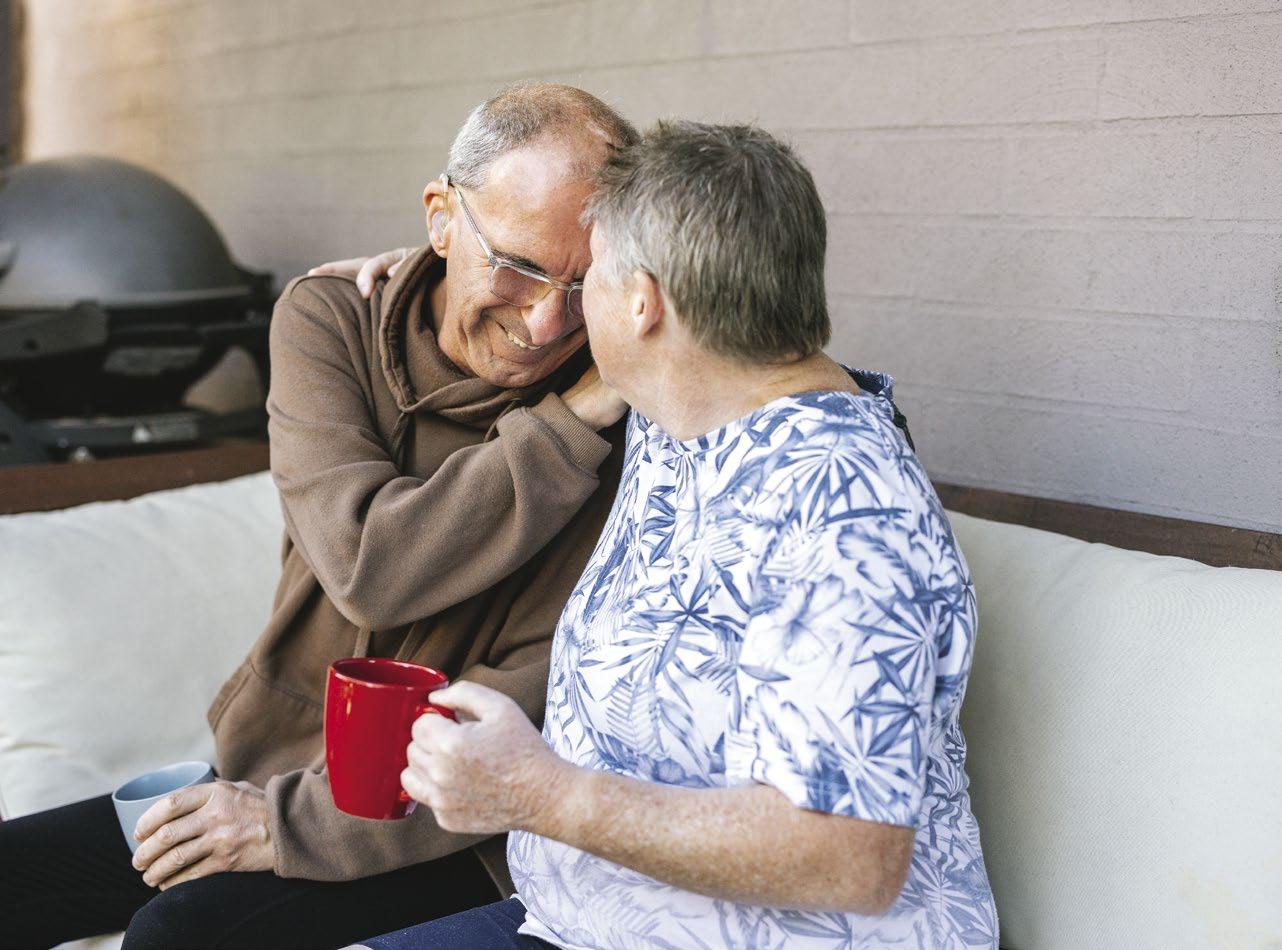
Living
– Jean
Meet Jean and Stephen!
Jean and Stephen have lived together in an Afford Supported Independent Living house for seven years. In their SIL house they enjoy each other’s company and have a better, stronger friendship.
Learn more about Jean and Stephen’s story.
together is awesome and it’s the best thing I’ve ever had.
673
1800 233
afford.com.au

Help after stroke Stroke Foundation StrokeLine: 1800 787 653 StrokeLine’s health professionals provide free information, advice and support. They can help you find the support and services you need www.strokefoundation.org.au
CARING FOR SOMEONE DEMENTIA with late stage
BY DEMENTIA AUSTRALIA
The later stages of dementia can be difficult for both the person living with dementia and the carer looking after that person.
At this stage, the person with dementia will often need full time care and support with all day-to-day tasks. As dementia is a progressive and terminal condition, it’s often helpful to understand what lies ahead.
In this article, we spoke to Dementia Advocate James about how he supports his wife Linda through the
changes and challenging behaviours as Linda’s dementia progresses.
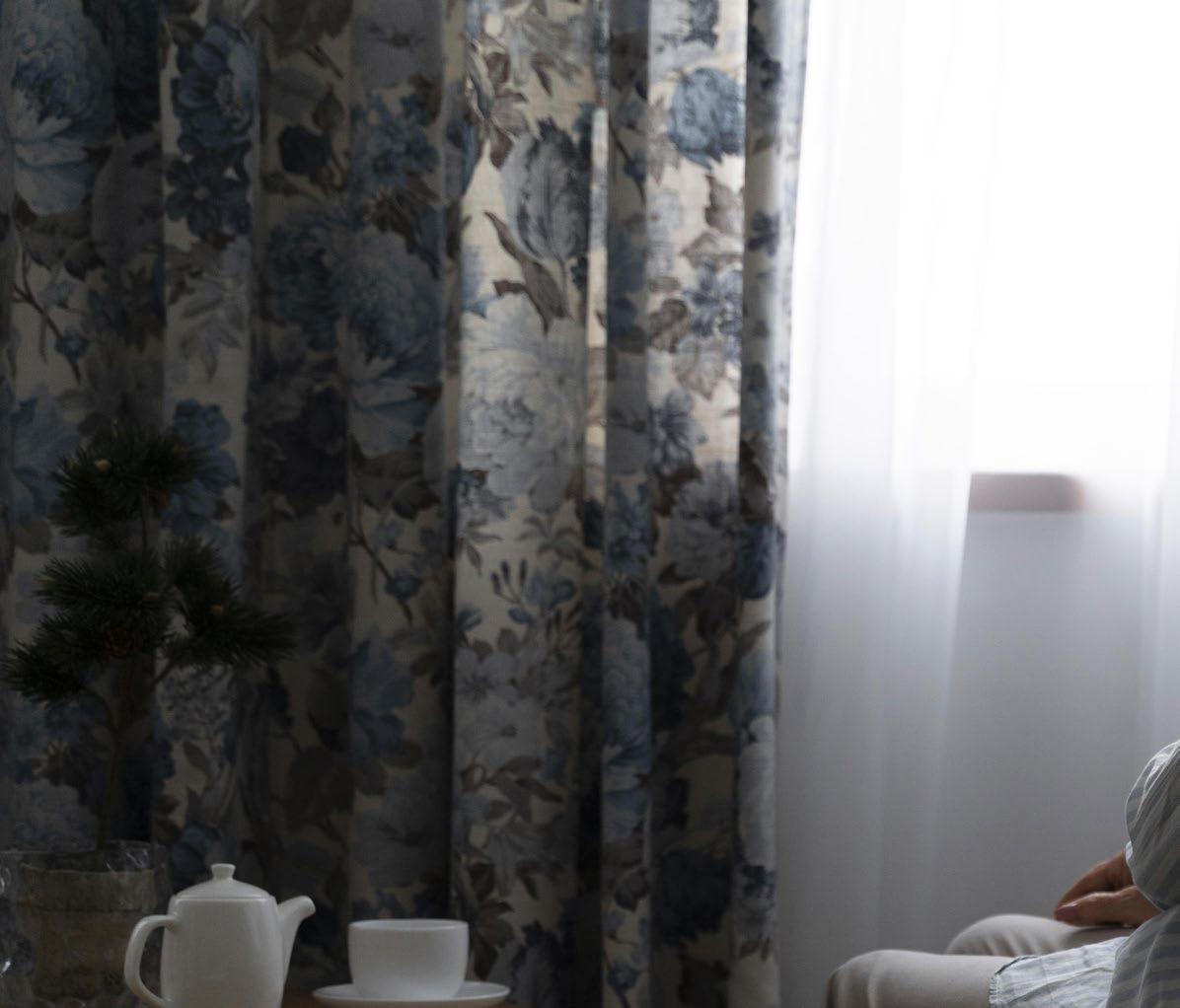
Note – this story discusses
the later stages of dementia which can be confronting for readers. If this article brings up any strong emotions, or you would like support, please call the National Dementia Helpline at any time on 1800 100 500. We are available 24 hours a day, seven days a week, 365 days a year.

Understanding and acceptance can change your perspective
It can be difficult for carers to watch changes happening to their loved one in the later stages of dementia, but
From accessing support to practising self-care, here’s everything you need to know
I AUSTRALIAN CARERS GUIDE 42 I DEMENTIA I
understanding and accepting that changes will come is an important step forward and ensures the person living with dementia receives the care and support they need.
For James, understanding and accepting that changes would come helped him to maintain a better outlook through the difficult times.
“Through getting an understanding Linda’s form of dementia, I knew that her condition would deteriorate,” James said.
“As Linda’s capabilities were diminishing, asking ‘why is this happening?’ was not going
to help either of us. Instead, when a challenging behaviour presented itself, I would ask myself ‘How can I best manage and support Linda through this?’
“This small difference in phrasing changes perspective and helped to work through one behaviour at a time. There were - without a doubt - hard times, and my daughters and I have had to make some incredibly difficult decisions. But, ultimately, acceptance and dealing with situations as they arose has benefited us all, and continues to help us navigate through each issue as and when it arises.”
Dementia causes
changes. Your loved one is still your loved one Symptoms in the later stages of dementia may be challenging. Remember these changes or behaviours are related to how dementia affects the person and are not deliberate or intended to hurt or offend anyone.
Despite a dementia diagnosis and the changes that it has brought, James shared the importance of always remembering your loved one for who they are.

When a challenging behaviour presented itself, I would ask myself ‘How can I best manage and support Linda through this?’
AUSTRALIAN CARERS GUIDE I 43 I DEMENTIA I
“Upholding the dignity of the person is of utmost importance – that person is still a person,” James said.
“Even though Linda’s capacity has diminished, she is nevertheless an intelligent person and still requires forms of stimulation that are of interest to her.
“She loves stories and poetry, and when others engage with her through reading and conversation, she lights up and you can just see that she thoroughly enjoys that connection.”
“Being empathic through the changes of dementia can make a huge difference – asking who is this person? What is their history? What lights them up?
“I encourage others to avoid assumptions and not to
presume that changes due to dementia means the person doesn’t need stimulation or engagement. They are still a person who can feel emotion and need fulfilment.”
Caring for yourself is also important
Caring for someone with dementia can be rewarding. It can also be difficult, emotional and at times, overwhelming. Looking after your own wellbeing is just as important as caring for a loved one.
James has experienced a huge sense of grief and loss throughout his experience caring for Linda. He said sitting with his emotion and finding ways through it has made him a better carer.
“In the later stages of dementia, while one is working through the challenges of dementia, there is an immense loss and grief issue,” James said.
“I describe it as a relational rupture. Of course, grief and loss make sense, but for
me the relational rupture is the uncoupling of a 40 year companionship.
“You can’t stop the grieving; it is a natural process and one that you must work through.
“What enables a carer to come through that overwhelming emotion, is to truly feel emotion, doing something for themselves and identifying what one is grateful for. I have been writing things down and writing poetry about what Linda and I have shared over our 40 years.
“Profound gratitude and being grateful, has helped to move through the overwhelm.”
How do I get support?



Caring for a loved one with dementia can be challenging at any stage.

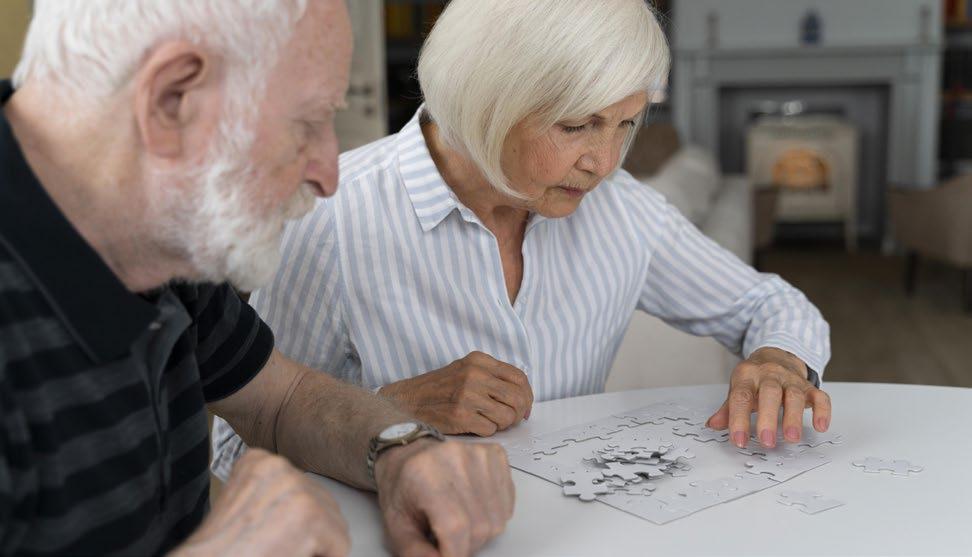
If you need support, information or just someone to talk to, we are here for you. Call the National Dementia Helpline on 1800 100 500. We’re here 24 hours a day, seven days a week, 365 days a year. ACG

44 I DEMENTIA I
Photos by Freepik
What you need to know for better aged care

Do you or someone you care for receive or need governmentfunded aged care services, either at home or in residential care?
We can assist with information and resources on:

• how to speak up for better care


• aged care provider fees and services








• transitioning between packages

• help with decision-making
• moving to residential care.
Our advocates assist you with free and confidential support and advocacy
• we listen carefully to what you have to say

• we do not talk to other people about you without your permission
• we are independent of the government and providers
• our goal is to ensure older people are treated with dignity and respect.
Chat with us 1800 700 600






Seniors Rights Service is a member of the Older Persons Advocacy Network. If you live in ACT you will be redirected to our local member organisation ADACAS To find out more visit opan.org.au or scan the QR code
Supported by funding from the Australian Government Department of Health and Aged Care
WHEN THEY SAY NO
ways to introduce in-home care for seniors 8
insult to their abilities, or an invasion of privacy. We found excellent advice from Family Caregiver Alliance with 8 ways to make the transition easier.
There are helpful tips on how to overcome this challenge and make inhome care for seniors more acceptable – even if your older adult initially said no.
Here, we highlight the key points from the article and include additional insights and suggestions.
2LISTEN TO YOUR OLDER ADULT’S FEARS AND REASONS THEY DON’T WANT IN-HOME CARE
Instead of shutting down objections right away, let your older adult express their feelings.
They’re more likely to cooperate when they’ve been heard and know that their opinion matters.
Understanding their concerns also helps you address those fears. Even better, involve them in the hiring process so they can help choose the person who will be caring for them.
You desperately need regular breaks, but your older adult absolutely refuses an in-home caregiver. What can you do?
Seniors often won’t admit they need help, even if they’re struggling with everyday tasks. In-home care can be a sensitive subject that leads to arguments or an immediate shutdown when you bring it up.
Your older adult might see it as a waste of money, an
to ease into inhome care for
8 ways
seniors 1START SLOWLY AND ALLOW TIME FOR THEM TO GET USED TO THE IDEA
Your older adult might need time to adjust to the idea of having someone in their house.
To ease the transition, start off slowly. At first, have the aide only come a few hours each week and focus on less personal tasks. Then, add hours and additional tasks as your older adult becomes more comfortable with the idea and that person.
I AUSTRALIAN CARERS GUIDE 46
by
Get seniors to accept in-home care so you can take break
6USE HOUSEKEEPING NEEDS AS AN EXCUSE
Pretending that you need help with housekeeping and other chores is another way to ease an in-home caregiver into the house. That makes it seem like it’s about your needs rather than theirs.
7INTRODUCE THE CAREGIVER AS A FRIEND
3
HELP THEM RETAIN DIGNITY BY SAYING IT’S FOR YOU, NOT THEM If you present the idea of in-home care as something that helps you rather than them, seniors might be more receptive.
That way they’re less likely to feel that they’re losing independence or aren’t capable.
4USE THE DOCTOR’S AUTHORITY AND SAY THAT IT’S A PRESCRIBED SERVICE
Many older adults respect authority figures like doctors and may be more willing to accept home care if they think the doctor has prescribed it. Consider booking a consultation with your loved one’s doctor so they can chime in with supporting advice.
5
PRETEND THAT IT’S A FREE SERVICE
If your older adult isn’t
directly paying for in-home care, you could pretend that it’s free. That makes it more likely that they’ll be open to it since they’ll be taking advantage of a free service.
Another approach is to introduce the inhome caregiver as a friend of yours who needs some company.
That takes away the stigma of needing help and helps them trust the caregiver.
8
TELL THEM IT’S A TEMPORARY ARRANGEMENT
It may be more acceptable to start using in-home care if your older adult thinks it’s only temporary.
Once the in-home caregiver becomes a part of their routine and they adjust to the idea, it’ll be easier to continue using the services.
ACG
Image
pch.vector on Freepik
Instead of shutting down objections right away, let your older adult express their feelings.
Residential Care
As your care needs change, Anglican Care is here to accommodate them. We value genuine care, respect and compassion and strive to deliver the highest standards of aged care.

Anglican Care offers ten homes across the Hunter, Mid and Central Coast. Our homes offer:
24-hour assistance

Award winning Lifestyle and Wellbeing Programs
Chaplaincy, Pastoral and Spiritual care
Dementia specific care and secure areas (*specific homes)
A variety of room options
Communal areas to entertain with family and friends
Bus outings and social events
Plus, we can arrange additional services such as hairdressing, physiotherapy and more (fees may apply)
For more information on how we can support you or your loved one, call our friendly team on: or visit:
1800 733 553

www.anglicancare.com.au
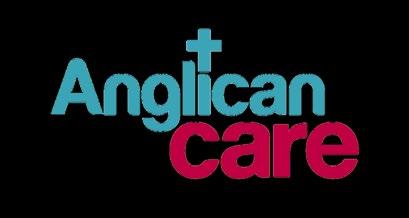
CAN YOU SOLVE THE CRIME?





CATCH THE CULPRIT AND ANSWER A BONUS QUESTION BY 31/03/2024 FOR A CHANCE TO WIN $ 90 0*



























































A bumper book of over 90 crime-themed visual, code, logic, number and word puzzles to solve.
































































Can you help amateur crime solvers Ben, Gladys, Emily and Harold discover who dunnit?





$19.99, paperback, available from all good book retailers.








*MO R E DETAILS AT LITTLERIDDLE WOOD.COM /MOMM
IT'S HOT IN HERE
QI’m helping to care for an elderly relative, but whenever I visit, their home feels like a sauna. Apart from the obvious cost implications, is such a hot house good for them?
ANSWER: It’s important to remember that elderly people are much more sensitive to cold temperatures, which may be why they have the heating cranked up so high. While it’s important to keep a room warm, it shouldn’t go above 25 degrees. Keep an eye on the thermostat when you’re at their home, and encourage other family members to do so too. And ensure they have plenty of blankets to hand, should they need a bit of extra warmth.
STAY CONNECTED
QHow can I feel more connected to my community?
ANSWER: There are myriad of ways to foster a better sense of connection in your local community. Take the opportunity to learn more about your neighbourhood and any issues or concerns your neighbours might have. This could be through lending a hand to those in need who live locally, and, if you’re politically minded, why not offer your support to the next candidate running in your local election?

AN UNHAPPY RETIREMENT
QI was looking forward to my retirement, but it’s not turning out quite as I had expected. My dreams of sitting on a tropical island have been replaced with the realities of caring for a loved one. What can I do to ease the burden?
ANSWER: 1. Keep an optimistic attitude and a good sense of humour; doing so will go a long way towards increasing your enjoyment of the world.
2. Take care of your health – if you’ve got a loved one relying on you, it’s essential that you have a robust routine that comprises of a healthy diet, adequate exercise, and ample rest to help you prioritise staying active, healthy, and alert.
3. Surround yourself with loved ones and friends – whether that looks like joining a local book club or meeting up with an old friend for a delicious homecooked meal each week, carve out dedicated time in your calendar to ensure you’re connecting with those around you.

Q
Where our experts answer your questions. ‘You don’t know what you don’t know until you know what you don’t know!”
A
and
I AUSTRALIAN CARERS GUIDE 50
Images by Freepik
MY SLEEPLESS NIGHTS
QI have trouble sleeping, what can I do to ensure a more peaceful night’s rest?

ANSWER: The jury’s in: driving drowsy is as dangerous (if not more so) than driving drunk. And yet millions of us do it every day. There are several things you can both cut out and incorporate into your daily routine for an optimum night’s sleep. Cut out caffeine if you can, and if you can’t imagine life without your daily cup (or two) of coffee, make sure your last sip of the stuff is before 2pm. Eating late at night can be another culprit, so try having your evening meal at least two or three hours before you go to bed. Finally, while vigorous exercise is good for both your metabolism and keeping your heart healthy, try and make sure any physical exertion is completed by late afternoon.
ENGAGED ACTIVITIES
QMy father has arthritis. What can I do to support him?

ANSWER: Although you can’t take away your loved one’s pain — or arthritis — your support can help soothe the matter at hand. Help him look for online or in-person support groups for people living with arthritis to meet and share experiences. If appropriate, offer to drive him to meetings. Don’t assume he doesn't feel up to doing the activities you once enjoyed together — they will have good days and bad days. Finally, help him stay active. Try suggesting you sign up together for something gentle like a yoga or tai chi class, to make physical activity a regular occurrence.
FEELING BLUE
QI’ve been feeling very low recently, what steps can I take to improve my mental health?
ANSWER: First of all, well done on asking for help –that’s the first, and most important step you can take. A good way to improve your mental wellbeing is to get in the habit of connecting more with, perhaps by making small talk with someone new while you’re waiting in a queue. Those brief encounters, such as smiling and exchanging pleasantries, can also help to make you feel happier and improve your sense of belonging. Start - or re-establish a self-care routine – which can be as simple as ensuring eight hours of sleep a night and introducing more vegetables to your diet. Lastly, try moving regularly - when you exercise, your brain makes chemicals called endorphins that make you feel happy. It also increases your sense of wellbeing and helps you to feel more relaxed.
GOT A QUESTION YOU WANT ANSWERED?
Then let us know either by email:hello@acguide.com.au or write to us at The ACG P
O Box
AUSTRALIAN CARERS GUIDE I 51
43 Wantirna Vic 3152
BY JEAN KITTSON
OLD MONEY
Ihave super, but I have no idea where it is, or what it’s doing.
I have a credit card which I can’t bear to look at too closely because I will see nothing but ‘discretionary spending’whatever that means.
According to my accountant it means things you don’t absolutely, need to purchase.
According to my accountant food is discretionary, even if I shop at

Aldi, but particularly if I go to the cafe and buy a pizza.
I just don’t get it. Numbers,
percentages, formulas, financial rules and regulations are all a foreign language. I tell myself I get it when the accountant patiently and slowly explains the way finance works, but the moment I leave the room it is as if Tommy Lee Jones and Will Smith from Men In Black have used their Neurolyzer on me; my brief comprehension is obliterated and I find myself looking for a bar.
No matter how often I have tried to improve my financial literacy - over quite a number of years, I might add - I am still illiterate. The good news is that I’m not alone. (Or maybe that’s the bad news.)

Most of us are as qualified to manage our finances as we are to remove our own spleens and that applies to the people we care for too.
My parents have managed
I AUSTRALIAN CARERS GUIDE 52 I JEAN KITTSON I
Most of us are as qualified to manage our finances as we are to remove our own spleens
Illustrations by Patrick Cook
Finances are a topic I find difficult because I don’t have a financial mind. I get anxious just thinking about finances, especially my own.
their finances their entire lives and we have only ever had to sell the family home once, to pay for food, and that was due to a crook ripping my father off, but that’s another story. However, no matter how well or not you have managed to get by, finances in later life can be very complicated.
Every decision you make about aged care has a financial component; from pensions to home care packages, from Carers Payments and Carers Supplements and Carers Allowances, to retirement villages and residential aged care.
To help your loved ones make any decision about any of these things and to be eligible for any government support at all, the first thing you need to know is where they sit financially. What are their income and assets now? How can you make an informed guesstimate about their future costs and cash flow? Are they entitled to any government assistance? And if so, are they getting it?
MyAgedCare and Centrelink will both demand they do a Means Test, and suffice it to say a Means Test is mean. It can be difficult and complicated, it can feel punitive and unfair, and what is counted as means in a Means Test can change from government to government and month to month. The way the government assesses assessable and non-assessable assets and income, is - to use a financial expression - nuts.
No-one designed aged care support and funding from the ground up, so the rules are as overwrought and incomprehensible as a Homer Simpson designed car. New rules are created and bolted on to try to cover every new government policy and all the situations that could possibly occur.
Trying to decipher these rules is not an algorithm, it is second-guessing at bestand a professional financial advisor told me that!
The good news is, there are people who love this stuff, who are very good at it and are here to help.
My top tip of all time, when it comes to helping your parents with their finances, and, importantly, making sure their future care costs are met, is to pay someone who devotes their professional
lives to keeping up with the changes in fees, entitlements and choices in the aged care sector.
A GOOD FINANCIAL ADVISOR WILL:

1
Keep your elder’s assets safe and accessible
For example, an important part of planning is integrating aged care costs and making sure that, if there are investments, they are appropriate for the stage of life people are at. It may not be appropriate to have savings in the stock market in your nineties. You may want something less risky and volatile.
2
Ensure their assets are used to benefit their ongoing care and comfort.
In other words, keep their
AUSTRALIAN CARERS GUIDE I 53 I JEAN KITTSON I
assets out of the hands of unscrupulous people. This might include a discussion about the perils of plastic money. The difference between debit and credit cards, all of which look alike. The possible issues with PayWave. Someone once told me police were going to residential aged care homes to advise people to be careful of their plastic cards because grandkids were ‘borrowing’ them.
My kids have my card on their phone for emergencies. They seem to have lot of emergencies.
3
Help them protect their home
Many elders panic about having to sell their homes to help finance aged care. There are rules and regulations around when your home is considered as an asset and when it isn’t. A good later life financial planner will be able to explain the financial impact of an elder going into aged care but keeping the family home or renting it out or not renting it out and keeping it empty. Or giving it away or passing it on. All these decisions have numbers that can be crunched.
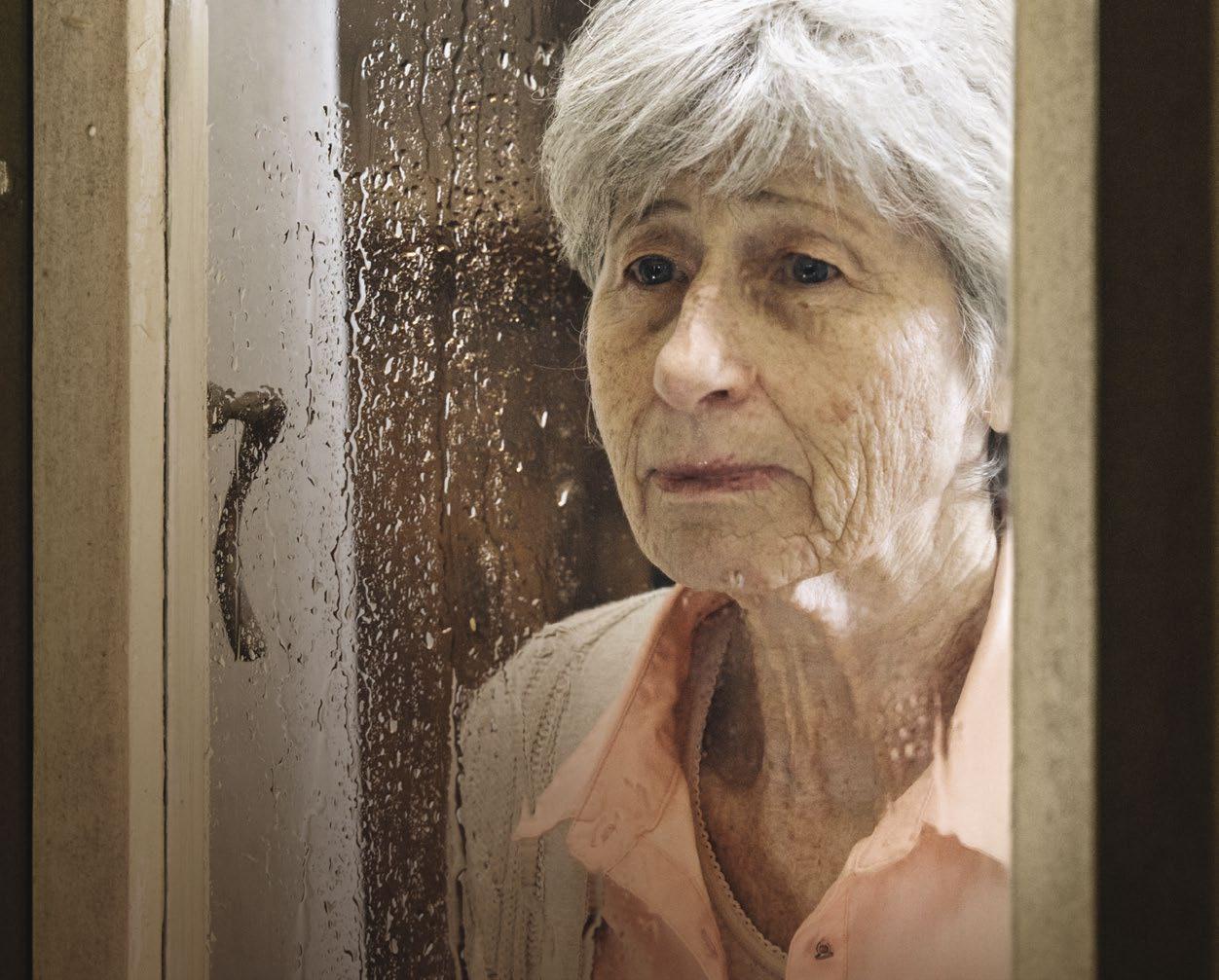
4 Ensure government assistance is maximised.
Our elders might not have been eligible for a pension when they retired but changes in their circumstances might mean they are now eligible for a part pension. For example,
if they use some of their assets as RAD (see next bit) they have fewer assets and might then be eligible for a Part Pension. If they receive just $1 of the pension this will enable them to access around fifty subsidies, supplements, concessions, and programs.
5
Work out the costs
of Residential Aged Care

When a person goes into care, the government’s key question is how much that person can contribute to the cost. The amount they contribute is called a Means Tested Fee. I have been told that working out this fee is more complex than the Age Pension Means Test, or possibly quantum physics.
For example, the meanstested care fee must not only consider any government subsidies and supplements for which your loved one may be eligible, but also their
financial assets, including superannuation, business income, rental income and any ‘deemed’ income. Deemed income is income the government assumes you are receiving from banks or other financial investments - not the income you are actually receiving, which, in the majority of cases is a lot less.
And then on top of this Means Tested Fee, there is also the Basic Daily Fee and Accommodation Costs. Costs and fees are different, and as I have said this calculation is willfully indecipherable. The process is like solving a Rubik’s Cube in a darkened room when you are colour blind.
Depending on the outcome of this calculation, your elders pay nothing, or a ‘contribution’, or the full amount.
This is called an Accommodation Payment
I AUSTRALIAN CARERS GUIDE 54 I JEAN KITTSON I

We’re here to help. Dementia can affect us all. Dementia Support Australia provides support to health care professionals, carers and people living with dementia who are experiencing behaviours and psychological symptoms of dementia. Free 24/7 dementia support 1800 699 799 dementia.com.au
and you will need to agree on the amount directly with the aged care home before they move in.
You can also negotiate how you might like to pay, either through
• a lump sum ‘Refundable Accommodation Deposit’ (RAD).
• rental-style payments called a ‘Daily Accommodation Payment.’ (DAP)
• Or a combination of both.
• (Remember if you pay the RAD for your elder, when they die the money will go into their estate. Therefore, you need to have a Loan Agreement drafted because if you have a dodgy sibling, your money may well go to them and there will be nothing you can do about it.)
There are also fees for
Additional Services, or upgraded services; better linen, better food, a glass of wine.
If your loved one has little or no means and you are wondering if they can afford a simple bed and room, then there is good news. You can get a ‘Supported Bed’ where the government will subsidize your costs. Naturally they are limited and not available everywhere.
You can also apply for Financial Hardship Assistance if you are struggling to find the money for aged care costs. Once again you must fill in a lot of forms.
The other thing a good financial planner will always do is: 6 Keep your parents at the centre of the discussion

This ensures that your loved ones have an understanding of what happens when things change and have control over
all their financial decisions.
Frankly, the whole system feels like it is designed to confound you.
I have scoured so many government websites and burst small veins around my forehead trying to translate bureaucratic blather that I sometimes wonder who is actually in charge.
You can see why my top tip of all time is to get a professional to help you make the best decision.
It’s certainly worth spending the $400 on a professional to give you a snapshot of your elder’s financial position.
Finally, in order for you to help your parents effectively your parents will need to have all their legal documents in place; Power of Attorney, Enduring Power of Attorney, Enduring Guardianship, a Will and an Advance Care Directive. That’s my next column - how to avoid a nightmare. ACG
I AUSTRALIAN CARERS GUIDE 56 I JEAN KITTSON I
If your loved one has little or no means and you are wondering if they can afford a simple bed and room, then there is good news.
Enjoy quality care and comfort when you need it
We understand that looking after someone requires an incredible amount of commitment and dedication and there will be a time when you need to take time away for appointments, a holiday, or just a short break to look after yourself.
Our network of homes across New South Wales provide you with the opportunity to do this, knowing that our experienced clinicians, carers and hospitality teams will look after all aspects of your loved one’s care, including clinical, social and overall wellbeing.
Our short-term respite care includes:
Round-the-clock care: short-stay respite residents are cared for by professional nurses on duty 24/7, providing a safe and supportive environment for residents to feel at home.
Nutritious food: we understand fresh, nutritious food is vital for our residents’ care and wellbeing. At each home freshly cooked meals are prepared daily by our chefs. We listen to each resident’s preferences so we can offer meals we know they’ll enjoy.
Engaging activities: a wide range of activities are offered in our homes. From games, cooking, craft, painting, gardening and visiting entertainers, our weekly activity calendar has something for everyone to enjoy.
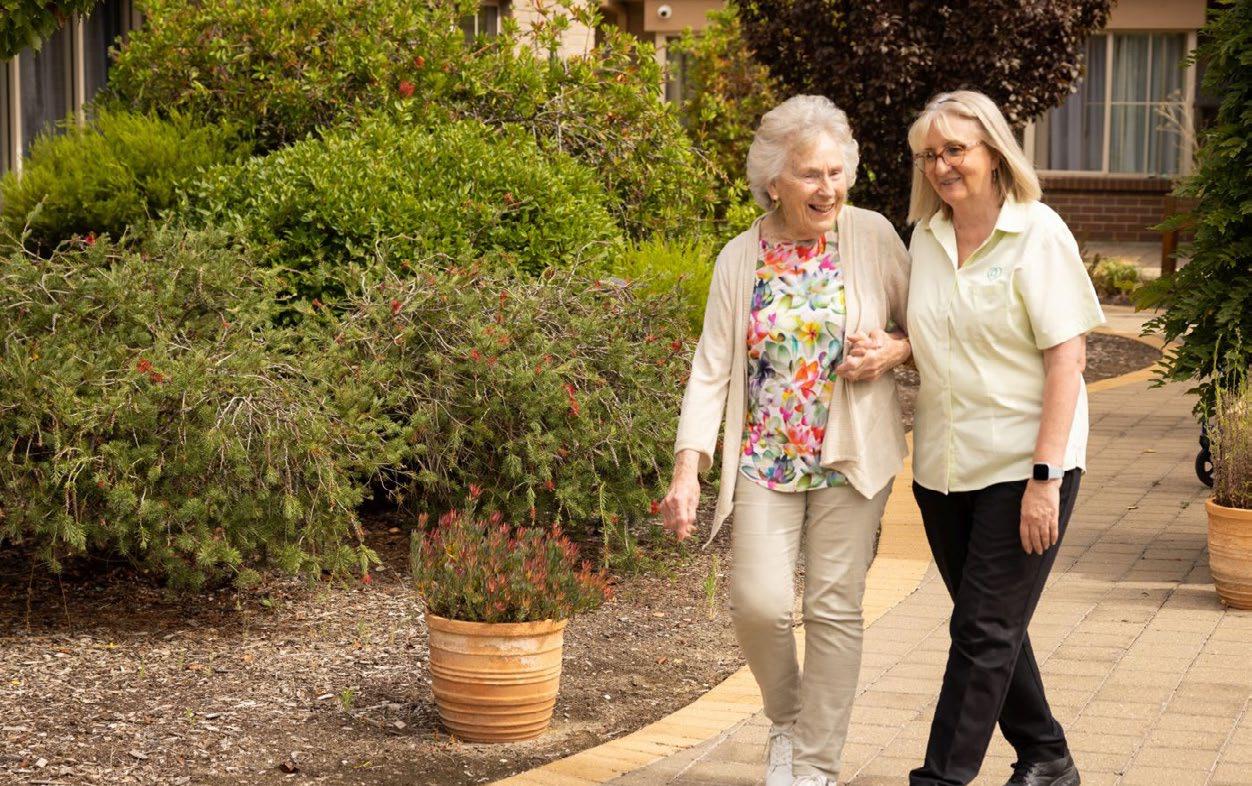
friendly
more or visit estiahealth.com.au/respite-care
Call our
team on 1300 682 833 to find out
Enriching and celebrating life together
DYING THROUGH MY
Melbourne from Malaysia. They were most looking forward to seeing Jordan, my son and their beloved grandson.
But it was two weeks before their trip here that mum discovered blood in her urine. Mum was immediately diagnosed with Stage 4 kidney cancer that spread (metastasized) to the lungs.
And just like that, everything fell flat.
that night. As she sat on the wheelchair, she complained that she hated being so helpless. In her frustration, she yelled at my dad. That triggered me and I raised my voice, telling her to calm down.
My mother and I had a bumpy relationship. We were very different, yet similar. Mum was stubborn and opinionated like me, but the difference was that she often had a point!
Life stops momentarily when you become a sudden or accidental carer.
When you think everything is fine, this unexpected event can easily knock even the strongest and most resilient individual off course.
This happened to my mum in 2019 and our world was tossed upside down.
It was early December and mum was excitedly packing her bags with dad as they were coming to visit us in
In less than one week after being diagnosed, mummy, who everyone took notice of, who kept her appearance and always dressed to the nines, became bedridden and lost her vitality and will to live.
Reality bites and it hurts
By late January 2020, I was back in Malaysia with Jordan to see her.
On my first day back, I was shocked to see my mother lying on the bed with oxygen tubes below her nose and her legs bloated. Her breathing was compromised from the cancer, and that explained her continuous coughing in the months prior.

Dad and I gave her a bath
We hardly saw eye to eye and would often argue about everything, like her excessive buying and how I should take care of Jordan as a baby, to name a few.
But at the end of the day, we always had each other’s backs and she wanted the best for me (but couldn’t express it in a way that I understood at the time).
The next day after her bath, something overcame me and I threw up a few times and came down with a fever. The same thing happened in 2006 when she was diagnosed with breast cancer.
I believe that mothers and daughters are always connected and even though
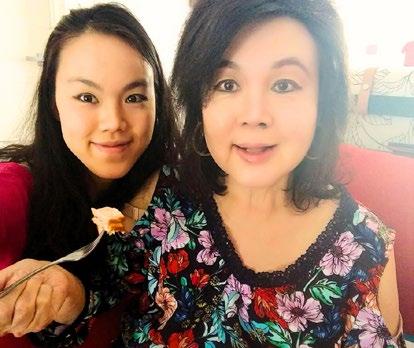
Spending the last 6 weeks as a sudden carer for my mother became the most saddest, challenging yet precious time of our lives
Left: Karina and mum in better times
I AUSTRALIAN CARERS GUIDE 58
Right: Young mum in her 20s. All images courtesy of the author
MOTHER’S EYES
BY KARINA FOO
their relationships can be tumultuous, it stems from a deep and profound love.


Mum’s army of carers

The three of us - My dad, aunty Rosa (mum’s sister) and I shared the load as carershelping mummy from the bed, going for numerous hospital visits, making food and overall, trying to provide her with the best quality of life. Mum’s other brothers and sisters helped out when they visited too.
Aunty Rosa was the “Administrator” who made sure that everything was clean and in order.
My father, who's also the most patient man in the world, became the “Everything carer”. Even though exhausted, he would sleep next to mum and insisted on night duty. My dear parents were married for almost 45 years and had been through so much. It made me both happy and sad to see my dad so absolutely dedicated to her right to the end.
I’d often peep at them at the door and they would be sleeping, talking, watching
TV, and sometimes, just holding hands.
Despite thinking I was the “Miracle carer” - as the one to annihilate the bloody cancer, I was probably being the annoying carer.
better because she was prepared to go.
But sometimes, she’d also tell me that she wanted to live as long as possible to see Jordan grow up.
Sheet happens
I made a sign and stuck it on the wall next to her bed. It said: “By April, I’ll be better and will be in Melbourne to see Karina and Jordan!”
Everyday I did some gentle exercises with her (despite her not wanting to, and yes, we’d argue about it), but I was determined to get her walking again. I’d also humour her to make her smile. Both of us actually shared the same quirky jokes, (when we were not banging heads!)
She would sometimes tell me - “I’m ready to go and be with my Pa (father)”. But hearing that troubled me and I dismissed it by saying: “You’re not going anywherethe only place you’re going is Melbourne once you’re better”.
During one challenging incident, I helped her up from bed and she defecated on herself with some stool getting on my legs and all over the sheets.
I knew she was humiliated but she remained stoic because she wanted to maintain her dignity.
My heart sank whenever she’d asked me why I was so adamant to help her get
My poor mother just dropped her head and
Left to right: Young mum and dad, Mum and Jordan as a baby and Mum and dad - wedding 1975.
My heart sank whenever she’d asked me why I was so adamant to help her get better because she was prepared to go.
AUSTRALIAN CARERS GUIDE I 59
quietly muttered “Sorry…”
I said nonchalantly: “It’s ok, ma. S**t happens!”
She looked at me with a slight smirk.
We went to see another oncologist hoping to hear encouraging news and explore other treatments.
But when my mum asked the doctor nervously: “How many months do I have?”
He shook his head and said: “You don’t have months. You only have weeks.”
The room went silent and the air became dense.
I swallowed hard and placed my hand on mum’s shoulder as she sat very still. Till this day, I don’t know what she or my dad felt at that point, but I was stunned, catatonic.
My father and aunty didn’t say anything.
What could we say?
How can you even digest this?
I became furious.
But we should have seen the signs. Mum had diabetes that she didn't want to manage, instead, she was a serial pill popper and had been complaining of aches and pains for 2 years before her diagnosis. We kept persuading her to see a specialist but she constantly refused, afraid that her breast cancer had recurred because she was losing weight too.
I cannot imagine what

she felt when she was finally diagnosed with terminal cancer. Her nightmare had come true, but 10 fold because she knew it was incurable and she quietly succumbed to it.
I cried alone many times but you can't hide anything from your mother. She knew from looking at my swollen eyes.
Saying goodbye
Early March arrived - my final week in Malaysia. In my last resort of finding alternative healing therapy, I managed to get pure CBD oil. I gave it to my mother and in a few hours, she sat upright by herself!
(I tried some CBD too and it took me to a happy place, temporarily).
But I became hopeful when mum sat up and i was convinced that this was the start of her recovery. When I asked how she felt, she said “I’m fine,”
We were leaving the next day and I hugged mummy tightly telling her for the first time in a long time, “I love
you, ma” (we don’t often verbalise our love as an Asian family). She just nodded and watched my son and I leave the house to the airport.
I remained optimistic and reminded my dad and aunty - “Keep giving her CBD every day and we’ll see her in April!”.
Separated by lockdown
When Covid19 became a pandemic, my mother also took a turn for the worse.
One week after returning to Melbourne, she lost her ability to talk and soon went into a coma. Mummy passed away peacefully at home in the second week.
She was gone within three months of her diagnosis.
The hardest moment was not being able to attend my own mother’s funeral due to the global lockdown. I was alone and watched everything on my phone. When the coffin was lowered underground, I went completely ballistic and felt that a part of me died with her.
My brother placed my note in her coffin (that she’ll be better in April to see us in Melbourne). In the days that followed, I felt like a lost soul and cried out for her like an abandoned child.
In hindsight
It’s been more than three years since, and I think of mummy every day. My dad and I often share humorous stories about her, such as how her handbag would give anyone a hernia if they snatched it and other memories that remind us about her colourful and gregarious personality.
“You only have weeks”
The hardest moment was not being able to attend my own mother’s funeral due to the global lockdown.
I AUSTRALIAN CARERS GUIDE 60
Caring for you every step of the way Volunteer
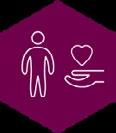
CARE AT HOME RETIREMENT LIVING
RESIDENTIAL CARE


Royal Freemasons’ Benevolent Institution (RFBI) is a not-for-profit aged care provider operating 22 residential care villages, 20 retirement villages and offer a comprehensive range of home care services across NSW and ACT. Every day we work with older Australians to live well and guide them through their aged care journey, supporting them every step of the way.
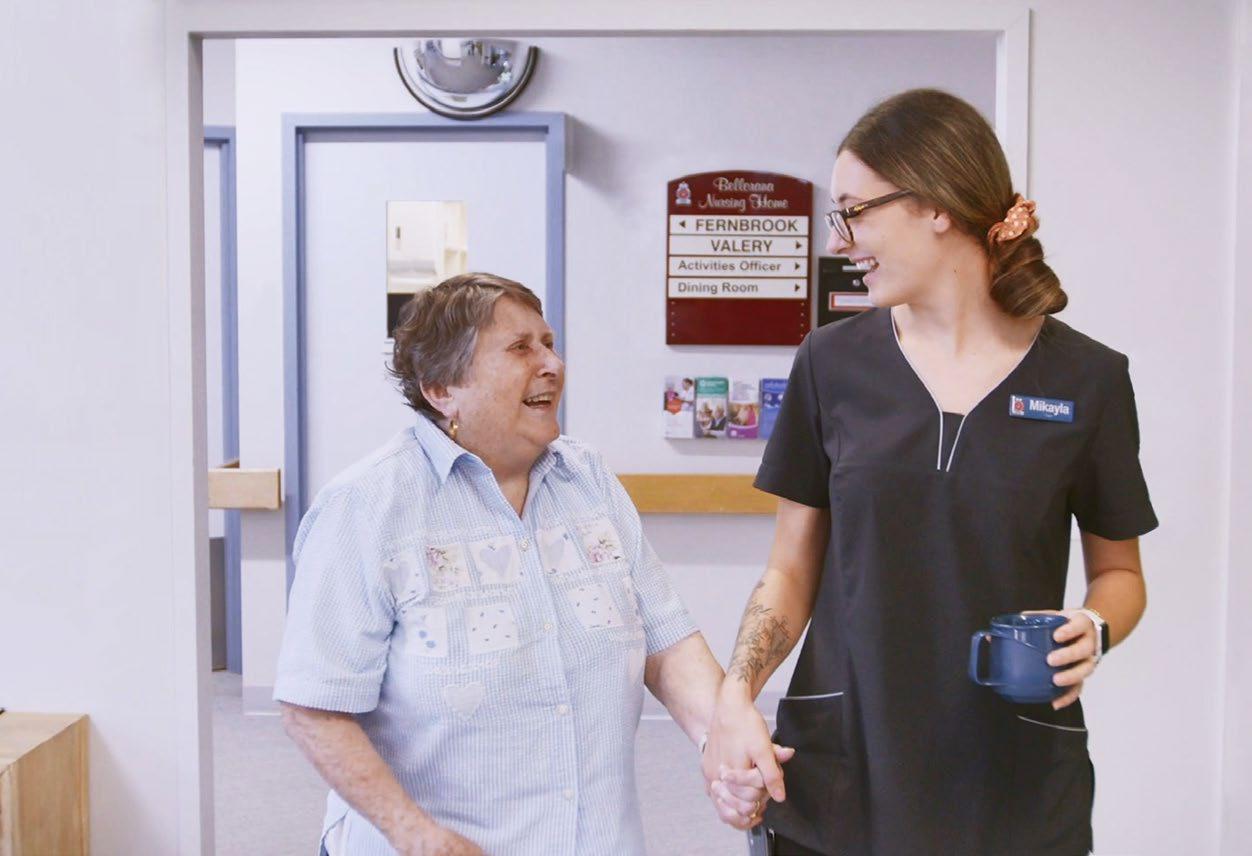
To find out more about how we can help you, visit our website rfbi.com.au or contact us on 1800 181 959.
Become an RFBI
RFBI also welcomes volunteers of all ages into our residential care villages, and values the skills they bring to enhance the live of our residents. To discover volunteering opportunities near you, please contact your nearest RFBI Village or visit our website.
To find out more, scan the QR code
I believe this experience has brought me full circle to my current work at Homage, an organisation that helps people find good carers through a specific needs matching system. But it’s the stories of their care recipients and care professionals that give my job so much meaning.
If I could do things differently when helping to care for mummy, it would be to emulate my father’s ways - be patient and have no expectations. Just be supportive and yes, laughter helps.
However, I still battle with regret and anger because she went too young at 68 and she should be here to enjoy her grandson and see him grow up.
I’ll be traveling to Malaysia for the first time since seeing mum when she was sick. This time, I’ll visit her resting place. It won’t be easy, so I’m bringing the tissues that she bought from the supermarket during her last trip to Melbourne four years ago, (yes, it’s that many), thanks ma!
"To be loved by and to live in the hearts of those you leave behind is not to die." ACG
Navigating the stages of grief
The stages of grief were first introduced in 1969 by psychiatrist Elisabeth Kubler-Ross in her book “On Death and Dying.” She identified these five stages of grief: denial, anger, bargaining, depression, and acceptance.
1
DENIAL: I spent a lot of time in denial and this would be the initial response to loss. It’s a defense mechanism that helps protect us from the overwhelming emotions that come with grief.
2ANGER: Anger is the second stage of grief and is a natural response to loss. Anger can be directed towards oneself, others, or even towards the situation itself. This explains why I often bought stickers that said “Screw you cancer!”
4DEPRESSION:
Depression is the 4th stage of grief and can often be the longest and most difficult stage to navigate. I quickly submerged myself in work soon after mum’s passing and safe to say, never really slipped into depression. I was probably dealing more with the anger and denial stages (even till now).
AUTHOR:
Karina is a former journalist and a team member at Homage Australia, an organisation that matches healthcare professionals with care recipients based on language, skill sets and location.
3BARGAINING: Bargaining is the third stage of grief and is often characterized by the “what-if” or “if only” statements. It’s an attempt to regain control or make sense of the loss - I wanted to feel like I was in control, but you can’t control the inevitable.
Right: Mum - sick. I placed my hands on her back trying to battle my conflicting thoughts
5ACCEPTANCE: Acceptance is the final stage of grief and is often seen as a sense of peace or resolution. Acceptance can be a gradual process anbut I’ve not quite reached this stage even after 3 over years. ACG

I AUSTRALIAN CARERS GUIDE 62
Since 1911, not-for-pro t RSL LifeCare has been developing connected and vibrant communities, for veterans and seniors with personalised care and services that suit your lifestyle.

Throughout our 28 Retirement Villages, 28 Residential Aged Care facilities, and via Home Care services across NSW and ACT we help you stay independent and safe in your own home or one of ours.
RSL LifeCare remains true to its mission – to provide peace, security and care to veterans and all senior Australians.
Home CareRetirement LivingResidential Aged CareVeterans Services SERVICES WE OFFER INCLUDE:
564
QLD ACT Port Macquarie Newcastle Toukley Nowra Lyneham Tura Beach Merimbula Eden Curtin Dungog Kandos Dubbo Condobolin Narrandera Yass Kaleen Page Wagga Wagga Hawks Nest Tea Gardens Ballina Lismore Narrabeen Galston North Richmond Penrith Picton Thirlmere Austral Cherrybrook The Lakes of Cherrybrook SYDNEY Hom e Care Residential Aged Care Retirement Living Australian Carers Guide | SPRING 2021 73
Call 1300 232
or visit rsllifecare.org.au
RESIDENTIAL AGED CARE WHAT MAKES A GOOD AGED CARE HOME 1
As our population continues to age, the demand for quality aged care facilities in Australia becomes increasingly important. Aged care homes play a vital role in ensuring the well-being, safety, and dignity of our elderly population. But what exactly makes a good aged care home in Australia? From compassionate staff to a supportive environment, read on to find out the most integral factors to providing the best possible care and support for our seniors.

I AUSTRALIAN CARERS GUIDE 64
Here’s everything you need to know to choose a good residential aged care facility
Safe and supportive environment
Safety is paramount in any aged care home. A good facility must maintain a safe and secure environment, which includes fall prevention measures, proper medication management, and regular health assessments. The facility should be designed to be accessible for all residents, including those with mobility challenges or disabilities. Additionally, the layout and amenities should encourage social interaction and engagement to reduce feelings of isolation and loneliness among residents.
Nutritious meals and special dietary support
Proper nutrition is critical for maintaining good health and vitality in elderly individuals. A good aged care home should provide well-balanced and nutritious meals that cater to residents' dietary requirements and preferences. The facility should be equipped to handle special dietary needs, such as diabetes, allergies, or specific cultural or religious requirements. Mealtimes should also be a social and enjoyable experience, encouraging residents to dine together and foster a sense of community.
Engaging activities and programs
Qualified and compassionate staff
The quality of care provided in an aged care home heavily relies on the competence and compassion of its staff. A good facility hires qualified healthcare professionals, including registered nurses, care aides, and allied health workers. These professionals should possess not only the necessary skills and knowledge but also a genuine passion for working with older adults. Adequate staff-to-resident ratios are also crucial to ensure that each resident receives the attention and care they require.
Keeping residents mentally and physically active is an essential part of their overall wellbeing. A well-rounded aged care home offers a variety of engaging activities and programs that cater to the interests and capabilities of its residents. These activities might include exercise classes, arts and crafts, gardening, educational workshops, music therapy, and outings to local events. Meaningful engagement not only enhances the quality
of life for residents but also promotes cognitive function and emotional well-being.
AUSTRALIAN CARERS GUIDE I 65
2 3 4
Open communication and family involvement
Effective communication between staff, residents, and their families is vital in an aged care home. Families should feel welcomed and encouraged to participate in care planning and decisionmaking processes. Regular updates and feedback mechanisms keep families informed about their loved one's well-being and allow them to address any concerns promptly. Transparency and open communication build trust and create a supportive environment for everyone involved.
Tailored care
The cornerstone of a good aged care home is its commitment to tailored care. Each resident should be treated as an individual with their own unique needs, preferences, and life stories. Aged care providers should adapt their services to respect the residents' autonomy and encourage their independence, while helping when needed. This approach fosters a sense of dignity, respect, and empowerment among the elderly, making them feel like valued members of the community.
Agood aged care home in Australia is more than just a facility; it is a nurturing community that values and respects its residents, providing a safe, supportive, and engaging environment. By prioritizing tailored care, employing qualified and compassionate staff, prioritising safety, offering engaging activities, providing nutritious meals, and fostering open communication with families, these facilities can truly enhance the lives of our senior citizens. As our society continues to age, it is crucial that we invest in and support aged care homes that prioritize the well-being and dignity of our elders. ACG
Images by Freepik
I AUSTRALIAN CARERS GUIDE 66
5 6



Get more out of your Home Care Package with HomeMade • Low flat fee • No hidden fees • Complete control Are you a Home Care Package recipient? Start your journey into self-management with HomeMade. We will design a support plan that suits you with support workers you choose. To find out more, scan this QR code or visit: homemadesupport.com.au Alternatively, you can call one of our friendly team on: 1300 655 688. Is your sleep as good as it should be? For over a decade, Pacific Sleep has been your local provider for sleep health solutions. Our specialist clinicians assist you at every step of your sleep health journey. Proudly independent, we offer advice and support for all major brands of sleep equipment. We won’t sleep until you get the sleep you deserve. Contact Pacific Sleep today for: • Home sleep testing • CPAP trials and rental • CPAP or BiPAP equipment and support • Home oxygen therapy solutions, including AIRVO ™ Visit pacificsleep.com.au or call (02) 4339 1222. North Gosford | Toukley | Hornsby | Blacktown Newcastle | Cowra | Parkes | Gympie Pacific Sleep is an approved DVA supplier and an NDIS accredited provider. Australian Carers Guide | SUMMER 2021 1
Over 2 years ago, the Royal Commission into Aged Care Quality and Safety’s final report was tabled in Parliament. Since then, we have been achieving meaningful outcomes in reforming aged care in Australia.

AGED CARE REFORM
I AUSTRALIAN CARERS GUIDE 68 I AGED CARE REFORMS I Updates
BY AGEING AND AGED CARE GROUP AUSTRALIAN GOVERNMENT DEPARTMENT OF HEALTH AND AGED CARE INFORMATION CORRECT
The reforms present us with a unique opportunity to go beyond the recommendations of the Royal Commission to meet the expectations of the next generation. We also want to make sure the reforms enhance the lives of older people, giving them agency, choice, and control over the care they receive.
The Star Ratings and Quality Indicator programs are tools to help when it comes to choosing aged care that is right for you or the people you care for.
Compare aged care homes with Star Ratings
Choosing an aged care provider is an important decision to make when you or a loved one can no longer stay living at home.
In December 2022, we launched Star Ratings, a system which allows you to make better informed decisions when choosing an aged care home. This was a key milestone in the aged care reforms and delivers a range of benefits, including:
• Consistent quality measures to monitor, compare and improve aged care
• Transparency in the quality of care provided by aged care homes
• An easy way to compare the quality of aged care homes online
• Engagement from providers to improve their rating = better quality of care for older people.
The Star Ratings and Quality
you care for.
How Star Ratings work
Aged care homes are given an Overall Star Rating and ratings for 4 sub-categories between 1–5 stars:
• Residents’ experience – at least 10% of aged care residents are interviewed about their overall experience.
33% of Overall Star Rating
• Compliance – based on regulatory decisions by the Aged Care Quality and Safety Commission, including compliance with the Aged Care Quality Standards.
30% of Overall Star Rating

AUSTRALIAN CARERS GUIDE I 69 I AGED CARE REFORMS I
TIME
PRINTING
AS AT
OF
Indicator programs are tools to help when it comes to choosing aged care that is right for you or the people
• Staffing – the amount of care minutes delivered by registered nurses, enrolled nurses, or personal care workers/ assistants in nursing to each resident.
22% of Overall Star Rating
• Quality measures – information about 5 crucial areas of care (pressure injury, physical restraint, unplanned weight loss, falls and major injury, and medication management).
15% of Overall Star Rating
The latest update to Star Ratings was published on 31 July 2023.
Each of these sub-categories are updated regularly, with the Overall Star Rating automatically recalculating as new data becomes available. Every quarter of Star Ratings provides an opportunity for providers to show improvement across two or more of the sub-categories.
You can search and view Star Ratings using the ‘find a provider’ tool on the My Aged Care website: myagedcare. gov.au/find-a-provider
What if your aged care home has a low rating?
Speaking with your provider to help you understand why they have that rating is a great first step. From here, they can tell you what actions they are taking to improve.
However, we understand that conversations with
providers can be difficult. If you would like advocacy support, please contact the Older Persons Advocacy Network (OPAN) on 1800 700 600. Alternatively, if you have a concern or complaint that you have not been able to resolve by talking to your service provider, the Aged Care Quality and Safety Commission can support you to resolve your complaint.
Complaints can be made by:
• calling 1800 951 822
• lodging online at agedcarequality.gov. au/making-complaint/ lodge-complaint
• writing to Aged Care Quality and Safety Commission, GPO Box 9819, in your capital city.
You can use Star Ratings to explore other options for aged care if you are considering changing providers. More information on changing aged care providers is available:
• online at myagedcare. gov.au/node/1623431
• by calling My Aged Care on 1800 200 422.
New Quality Indicators
Quality indicators measure important aspects of quality of care that affect a resident’s health and wellbeing.
Reporting on the quality of care helps:
• Aged care providers improve the quality of their service, based on results
• Older people and their families and carers to make informed decisions when it comes to quality aged care for themselves or a loved one
• The government to make policy decisions based on the quality of care delivered by aged care providers.
In April this year, 6 additional quality indicators were introduced to residential aged care. These indicators measure important areas of care affecting older people’s health and wellbeing and include:
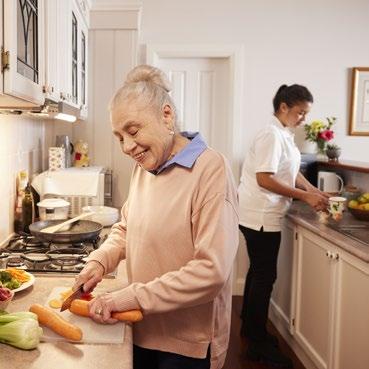
• Activities of daily living
• Incontinence care
• Hospitalisation
• Workforce
• Consumer experience
• Quality of life.
Importantly, the last two of these six new quality indicators highlight the voice of older people. This is what this reform journey is all about: to make sure older people are consistently placed front and centre of the system and that we’re listening to them.
These new quality indicators add to the five already existing indicators:
• Pressure injuries
• Physical restraint
• Unplanned weight loss
• Falls and major injury
• Medication management.
I AUSTRALIAN CARERS GUIDE 70 I AGED CARE REFORMS I
Free resources for carers and families
If you are a family member or carer of an older person, you may be interested in new free online modules about aged care.
The Equip Aged Care Learning Packages, developed by the University of Tasmania’s Wicking Dementia Centre, provides practical and relevant information to carers or family members of older people.
The learning packages covers topics such as:
• Supporting people living with dementia
• Prevention of falls
• Palliative and end of life care.
Modules covering ‘The Australian Aged Care System’, and ‘The Aged Care Quality Standards’ may also be helpful in providing families with a better understanding of how aged care works in Australia.
Each module takes around 10 minutes to complete, and the modules are accessible from your phone, tablet or computer.
Visit the Equip Aged Care Learning Packages website for more information: equiplearning.utas. edu.au
We plan to introduce more quality indicators including:
• New staffing-related quality indicators in residential aged care
• Quality indicators for in-home aged care including consumer experience and quality of life measures.
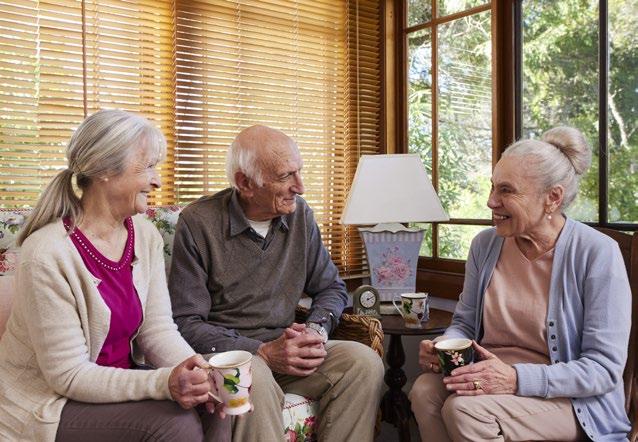
To find more out about the Quality Indicator program, visit: health.gov. au/ our-work/qi-program
Have your say about aged care reforms
We are consulting with older people, their families, and carers as we develop, trial, and deliver these changes to make sure our aged care system meets their needs.
Thousands of people have been involved in shaping the reforms so far – through surveys, webinars, online workshops, consultation papers and in-person events.
There are plenty of opportunities for you to have your say about the changes to aged care:
• Register to be kept up to date on consultation opportunities and outcomes or sign up to receive our monthly
newsletter for older people in Australia –EngAged. Visit the Aged Care Engagement Hub: agedcareengagement. health.gov.au/getinvolved
• Call 1800 318 209 to find out more about the reforms and progress, open consultations and for assistance in completing consultation activities.
• Talk with us in person at one of the many upcoming events around Australia that we’re attending, including:
• COTA ACT Spring Seniors Festival –Canberra, ACT
21 September 2023
• Disability, Ageing and Lifestyle Expo
- Adelaide, SA
13–14 October 2023
• Care Expo – Sydney, NSW
10–11 November 2023
• Have a Go Day –Perth, WA
15 November 2023
ACG
I 71 I AGED CARE REFORMS I
of
Information correct as at time
printing
Photos supplied by Ageing and Aged Care Group Australian Government Department of Health and Aged Care

I AUSTRALIAN CARERS GUIDE 72 I TECHNOLOGY I
HOW IS

VR
USED TO BRING PEOPLE TOGETHER & STIMULATE AND ENGAGE
With Australia’s over 65’s population growing rapidly, the need for progressive establishments offering socially and emotionally fulfilling programs for residents is fast becoming the number one focus for both care providers and families alike. Debilitating lockdowns during the pandemic shone a spotlight on the effects that social isolation and loneliness can have on our wellbeing, and indeed how those effects can be amplified for residents in care homes.
In many cases, we’ve seen that technology can play a part in enriching the lives of older adults who may be feeling isolated. Virtual reality
Gone are the days when the thought of aged care facilities conjured up images of drab, beige hallways, deserted common rooms and a gloomy atmosphere hanging heavy in the air.
AUSTRALIAN CARERS GUIDE I 73 I TECHNOLOGY I
Image by Freepik. This image is NOT associated with SilVR Adventures. It is is used to portray the subject matter of the feature only.
technology can really change the narrative of aged care living, and SilVR Adventures is leading the application of Virtual Reality to the ageing population.
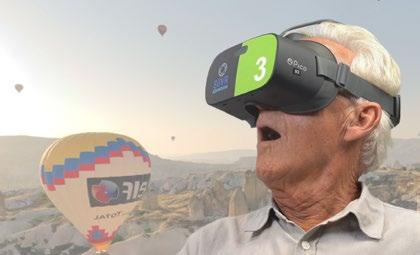
Virtual reality (VR) is a simulated environment that looks and feels incredibly realistic. Unlike a computer or tablet which has a fixed field view, virtual reality headsets adapt to your head movements. This means that the wearer is immersed in a rich 360-degree, 3D environment. Users have access to an ever-growing library of immersive stories specifically tailored to older adults which include landmarks, nature, bucket list experiences, music, history, wellness and reminisce therapy.
Sullen common rooms transform into vibrant landscapes and the seven wonders of the world - take a walk through any of the residential care homes using this new technology and sombre silence is replaced with ‘ooh’s, ‘aaah’s’ and animated chatter –
“It reminds me of when my late husband and I travelled many years ago.. this was such a happy time.”
Whether it’s a trip to see
the spectacular Great Wall of China or something more personal like a childhood home, the virtual experiences allow users to visit new places and relive memories. Connections are created, experiences are shared, and emotions are stimulated –this is much more than an entertaining novelty, and the numbers back it up.
Over a 12-month pilot program across multiple sites with UnitingCare Queensland, SilVR Adventures’ VR solution proved a huge success: 85% of customers have said that the use of virtual reality sessions as therapy has helped to significantly drive
social engagements. 89% of residents said they would like to use VR again, and 91% would recommend it to their friends.
SilVR Adventures’ Founder Colin Pudsey is dedicated to building technologies and services that improve the lives and wellbeing of ageing people and their caregivers. ‘Our mission has always been to reduce feelings of loneliness and isolation among seniors while driving social engagement.’
Following a successful introduction of their VR platform into residential aged care facilities across ANZ, Singapore and the UK, SilVR Adventures continues to expand in 2023 with upcoming research into the benefits of VR Therapy on dementia in collaboration with Deakin university, and expansion into disability/community care and hospice settings.
Virtual reality is not just for gamers anymore. It’s lighting up the faces and hearts of our most vulnerable citizens - bringing joyful, meaningful experiences to those who are in desperate need of connection… and it’s here to stay. ACG
Virtual reality (VR) is a simulated environment that looks and feels incredibly realistic.
To
I AUSTRALIAN CARERS GUIDE 74 I TECHNOLOGY I
find out more information, please visit: www.silvradventures.com.au
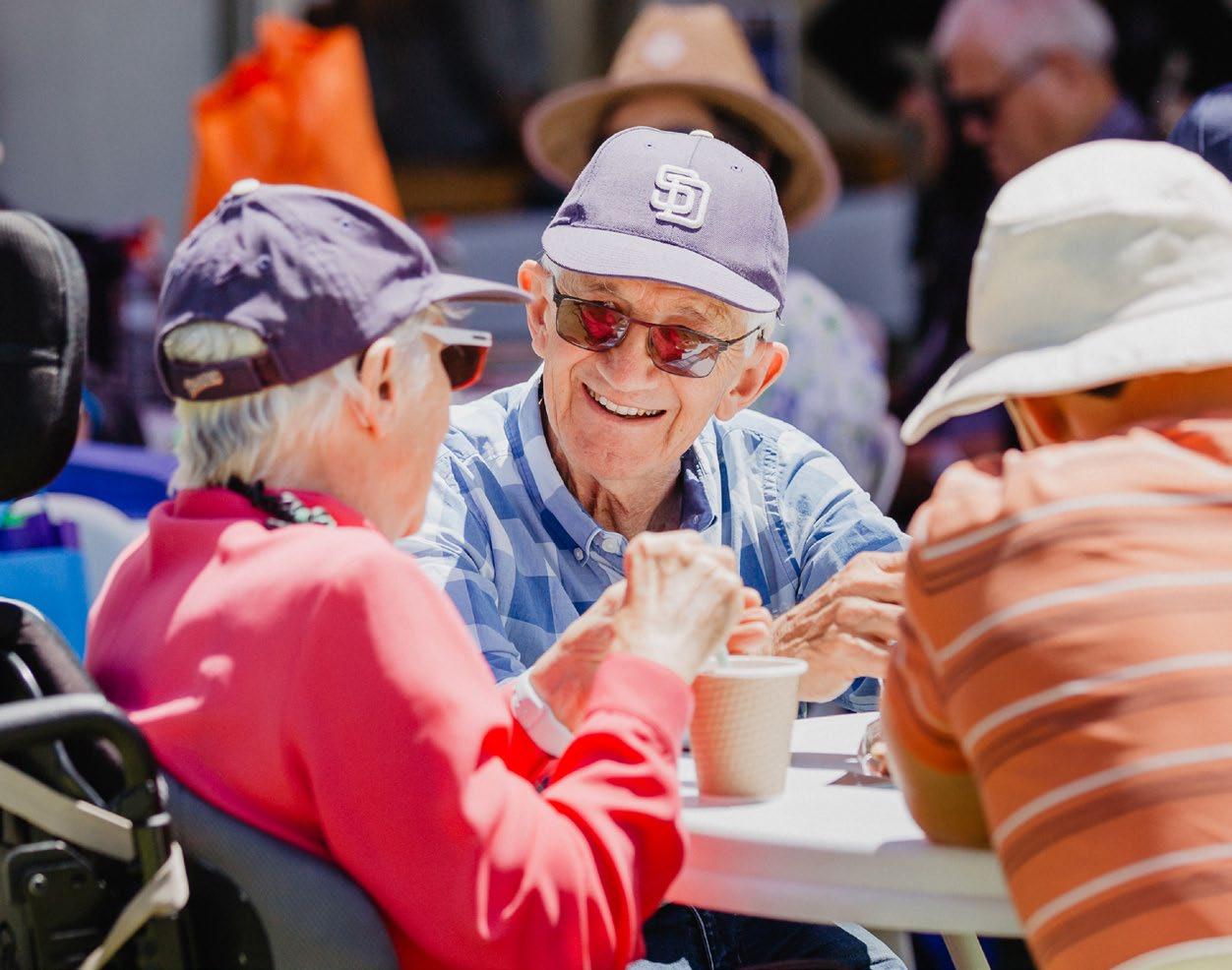
Funded by the Department of Health and Aged Care, LiveUp is a free healthy ageing guide designed to help older people maintain or regain their indepdence. LiveUp provides the impartial expert advice, personalised support, and community connections people need to age their way. Welcome to the
ageing Talk to a Navigator for free on 1800 951 971 or discover more at liveup.org.au SCAN ME TO LEARN MORE
upside of
How
Commonwealth Home ProgrammeSupport(CHSP)
helps while waiting for your
Home Care Packages (HCPs)
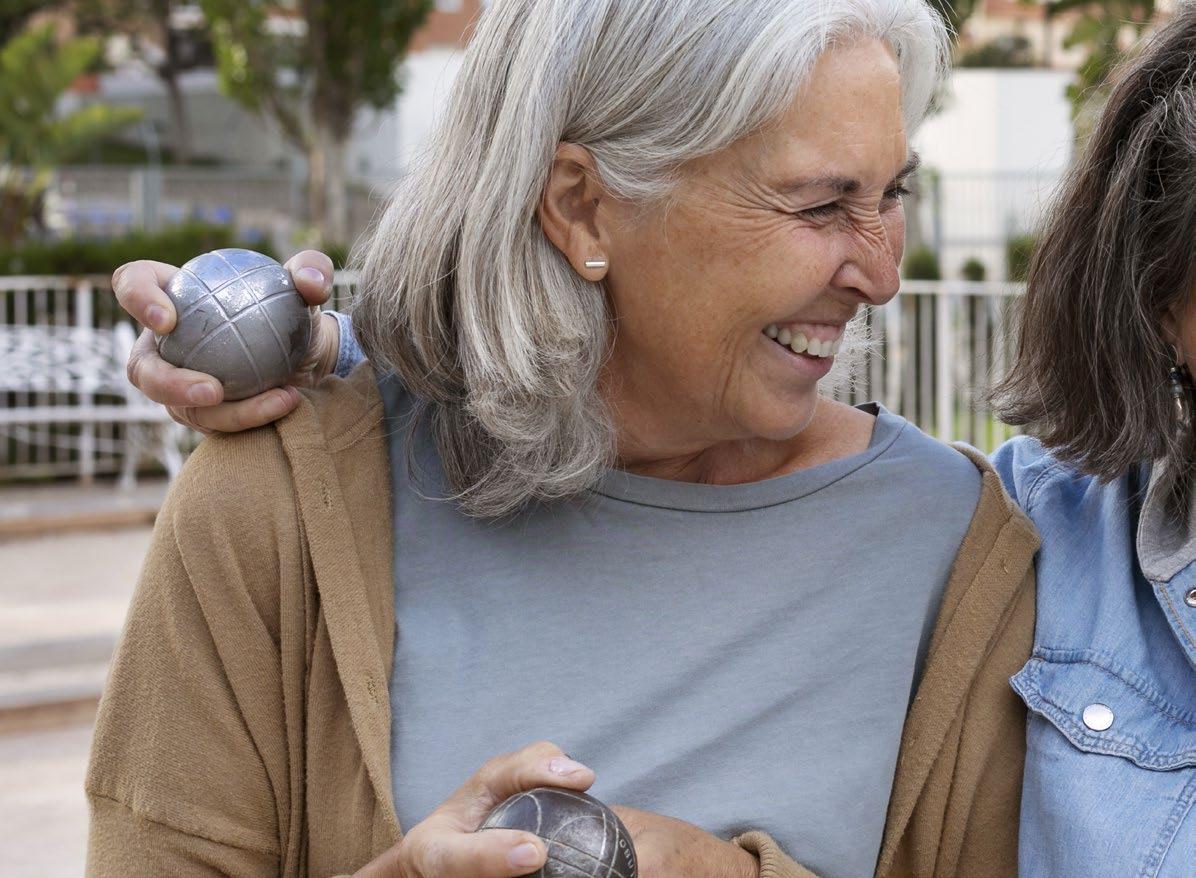
I AUSTRALIAN CARERS GUIDE 76
Australians are living longer and healthier lives. On 30 June 2020, Australia’s population was comprised of approximately 16% of people over the age of 65. By 2066, this figure is expected to grow to up to 23% (ABS 2019).
To support older people to live independently in their own homes, the Commonwealth government introduced several significant reforms to home care in the 201516 Budget with the key objective to provide choice to those who remain in their own homes.
Consumers of these programs can choose where they live – perhaps in the original family home or a downsized, easy-to-maintain residence. They may reside with family, or even live in a retirement community setting – and still access care. The care comes to them, rather than in residential aged care.
Unfortunately, the demand for these services often exceeds supply. A common theme throughout the Royal Commission into Aged Care established in 2018 found that waiting times for these services ranged from seven months for lower-level supports, all the way up to 34 months with the highest levels of need (Royal Commission into Aged Care Quality and Safety Final Report 2021).

AUSTRALIAN CARERS GUIDE I 77
Image by Freepik
At We
Plan Aged
Care, we often get asked about the differences between the Commonwealth Home Support Programme (CHSP), and My Aged Care Home Care packages, level 1 – 4. There are some key differences between the Commonwealth Home Support Programme and My Aged Care Home Care packages that consumers need to know about before making a decision.
COMMONWEALTH HOME SUPPORT PROGRAMME
The CHSP is designed to assist consumers with basic care needs. It’s an entry-level service focused on supporting older people to maintain independence, health and safety at their home of choice and allow recipients to continue to be connected to their own community. These supports are generally in areas such as
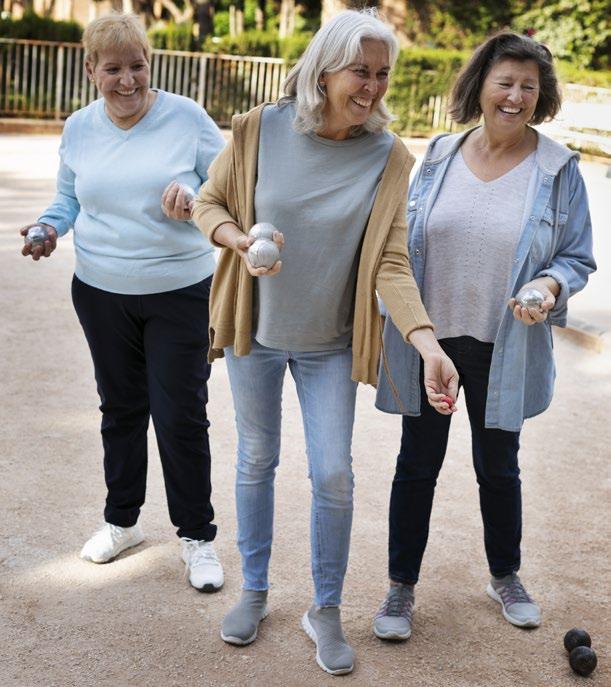
housework, personal care, meals, shopping, allied health, social support, and planned respite, although it’s important to note that both programs currently offer limited allied health support.
COSTS FOR CHSP
Providers of CHSP services receive funding from the Commonwealth which they use to provide subsidised services to their participants. Most people in receipt of these services will pay a contribution towards the cost of their care if they can afford to do so. CHSP services are provided by a range of organisations such as community services, local government councils, and private operators. It is important to note that there are far more users of CHSP than Home Care Packages. According to the Royal Commission Findings, the most used service in 2018-19 was CHSP (841,000 people),
compared to residential aged care (243,000 people) and Home Care Packages (133,000 people).
HOME CARE PACKAGES
For more complex needs, a Home Care Package may be more appropriate. Home Care Packages operate under the tenets of ‘Consumer Directed Care’, meaning that people can choose their own provider to deliver their services. They can also choose to change providers. There are four levels of assistance from basic care needs to high care needs. The objective of Consumer Directed Care aims to provide consumers with greater flexibility in determining what supports they need on a more personal basis, and they are encouraged to draw up a care plan with their provider.
Recipients of Home Care Packages can also choose to self-manage their packages. A range of co-ordinated services can be provided under a home care package, including assistance with personal care and activities of daily living, support services (such as cleaning, gardening, transport, home maintenance, social support, and respite care), some aids and equipment, and clinical care. Home care level 3 and 4 packages have a greater emphasis on delivering complex care in the home, including more clinical care where required. In essence, a Home Care Package is designed for people who may require assistance beyond what the CHSP can provide.
It is important to note that
I 78
a Home Care Package cannot be used for items that are considered private or domestic in nature, or services that can be accessed through other programs that an individual might be eligible for.
COSTS FOR HOME CARE PACKAGES
The costs of home care packages can be complex and confusing to understand. Will you have an income-tested fee to pay? What will you be left with to spend on services once you pay the various administration and plan management costs? Which provider will you select? These are all areas that We Plan Aged Care can assist with, however the basic budget amounts are shown below:
There are four levels of home care package, with level 1 being for consumers with low-level needs, to level 4 for consumers with higher or more complex needs.
Once a package and level has been assigned to you, you will need to engage with a home care provider to administer the package funds – these aren’t given directly to the recipient.
The total budget amount assigned is comprised of government subsidies and client contributions, such as the basic daily fee and incometested fee. These amounts are current on 17 August 2023:
It is important to note that some providers may choose to waive the Basic Daily Fee. If this happens, this will reduce the budget amounts above. We have simplified the budget amounts below, however it is imperative you seek further information from Services Australia prior to taking up a home care package to see if you may have to contribute based on your income.
ACCESSING SERVICES
Older people who need support in home are encouraged to phone My Aged Care on 1800 200 422 to start the process. You can also register online at www. myagedcare.gov.au/applyonline
Eligibility criteria for supports in home are as follows:
• The applicant must be 65 years or older (or 50 years and older for Aboriginal or Torres Strait Islander people), or
• 50 years or older and on a low income, homeless, or at risk of homelessness (or 45 years and older for Aboriginal and Torrs Strait Islander people), and
• Have an assessment that will determine what
specific services you need assistance with.
The registration process takes around 20 minutes and will consist of various questions about the needs of the individual, such as health and safety concerns, what support they have currently, and how the person is managing at home. You can have a friend or family member assist, or another representative that understands your situation and needs. You will generally need your Medicare card handy as well.
From here, this will either result in a referral to a Regional Assessment Service (RAS) to assess entry-level needs such as the CHSP and referral codes for allied health programs, or may progress to an Aged Care Assessment Service (ACAS/ ACAT) referral for a home care package.
At We Plan Aged Care, we can assist you or your loved one with this process. Feel free to contact us on 03 8526 8961 for support or by visiting our website at www. weplanagedcare.com.au. ACG
AUSTRALIAN CARERS GUIDE I 79 Level Total budget per annum Level 1 – Basic $14,242.30 Level 2 – Low $22,261.35 Level 3 – Intermediate $43,628.45 Level 4 – High $64,024.65
Australia’s population was comprised of approximately 16% of people over the age of 65
YOUR BODY LOVES
Everyone needs to exercise. Medical evidence provides overwhelming support for the benefits it provides for every condition under the sun, from arthritis to cancer. The Canadian Physical Activity Guidelines for Older Adults recommends that those aged 65+ should accumulate 150 minutes of physical activity per week. But for many people living with disease or injury that affects their mobility, increasing exercise can be an intimidating idea. For those caring for loved ones with pain and disability, messages can be confusing, and it is not always clear who or where to turn for advice.
Who should I be asking about exercise?

A good starting point is your family physician, who will know about any underlying conditions that may limit your activities, or any changes that need to
be made to your therapy as a result of a new exercise regimen. But beyond general guidelines, many doctors lack the time and perhaps even the knowledge, to prescribe exercise in a way that is specific, detailed and clear. Physiotherapists are specialists in the treatment of diseases and conditions affecting mobility, so a great starting place might be to make an appointment for an assessment. Even if you don’t have a specific injury, a physiotherapist can help you identify potential injuries and give you specific exercise advice based on your situation and your particular strengths and weaknesses. Personal trainers are another oftenused resource. However, they are not regulated health professionals, so you don’t always know how experienced or knowledgeable they are in dealing with specific diseases or injuries. In some cases,
the physiotherapist will work with the patient’s personal trainer, Pilates or yoga instructor, or other exercise specialist, to ensure that the exercises are appropriate.
How hard should I exercise and how do I know when to stop?
The short answer is simple: Start very slowly, increase very gradually, and pay attention to cues from your body along the way. If you have pain during an exercise session, ask yourself if it is simply muscle fatigue or if a specific area is giving you a problem. You may notice your pain actually decreases as you continue with the exercise. This is a green light to continue, although if you are trying a new activity, keep the session short and lowintensity. If the pain seems to get worse as you exercise, first try modifying the activity (by reducing the intensity, speed, amount of weight lifted or range of movement).

Why I AUSTRALIAN CARERS GUIDE 80
A fit 70 year-old who remains active can be as strong as an unfit sedentary 30 year-old.
MOVING
Myth 1
THERE’S NO POINT TO EXERCISING. I’M GOING TO GET OLD ANYWAY.
Fact: Exercise and strength training help you look and feel younger and stay active longer. Regular physical activity lowers your risk for a variety of conditions, including Alzheimer’s and dementia, heart disease, diabetes, colon cancer, high blood pressure, and obesity.
If that doesn’t help, stop the exercise for that session. You can try it again another day to see if it still increases your pain. Whether or not you feel pain during exercise, pay attention to any soreness in your body that night, and for the next day or two. Some muscle soreness is normal— but pain, redness or swelling in your joints are signs you have overdone it.

AUSTRALIAN CARERS GUIDE I 81
Stretching should never be painful
STRENGTH TRAINING:
What should I try?
STRETCHING: keeps your joints and muscles flexible, and should be a part of any exercise program. One proviso: Many of us grew up being told to stretch before any activity, holding the limb in a position so the muscle group is lengthened for some period of time. In fact, this “static stretching” temporarily weakens a muscle, making it more prone to injury, so it should be done after, not before or during exercise. Hold each stretch for a minimum of 30 seconds, and then repeat each stretch once. Stretching should never be painful.
WATER EXERCISE: may be the right choice if you have any type of arthritis or joint injury. Aquafit classes add some strength training to your cardio workout, while swimming is a wonderful way to get a cardiovascular workout without putting wear and tear on the joints. If you have shoulder or joint issues, you may find swimming difficult; work with a swimming expert or physiotherapist to modify your technique or to find alternative moves. A note for those with osteoporosis: although water exercises and swimming are beneficial, they will not improve your bone density, so you should also include some higherimpact walking and/or strength training in your weekly exercise program.

is especially important if you have osteoporosis or if your doctor is concerned about your bone density. Those with osteoarthritis can reduce the amount of wear and tear on joints by strengthening the muscles around them. Small dumbbells, and elastic tubing with attached handles, offer good resistance exercise. If sore or stiff hands make gripping difficult, you can purchase cuff weights that attach with Velcro around your wrists and ankles.

Myth 2
EXERCISE PUTS ME AT RISK FOR A FALL
Fact: Regular exercise, by building strength and stamina, prevents loss of bone mass and improves balance, actually reducing your risk of falling.
 Swimming is a wonderful way to get a cardiovascular workout
Swimming is a wonderful way to get a cardiovascular workout
I AUSTRALIAN CARERS GUIDE 82
Elastic tubing with attached handles, offer good resistance exercise.
WALKING:
is one of the simplest forms of exercise, and it’s free! This low-impact cardiovascular exercise will be especially helpful for anyone who has high blood pressure or is overweight. A pedometer can help you track how many steps you take each day, and help you chart increased activity. If you find walking difficult, try using a gait aid such as a cane. A Rollator walker is a walker with four wheels and a seat, and brakes that you can set so the walker won’t move if you sit to have a rest. Whichever way you decide to walk, make sure you wear supportive footwear with nonskid soles, and choose a route that is flat and free of obstacles.
Start with simple exercises such as balancing on one foot


BALANCE EXERCISES
are important because poor balance and frequent falls are one of the most common complaints of seniors and their caregivers. People with a neurological disease or injury will almost certainly have problems with their balance, as will anyone with reduced sensation in their legs from diabetes, or who has experienced a lower body sprain, broken bone or surgery. But luckily, balance is something that is relatively easy to improve. It is important to have something to hold on to, and someone else nearby, while you are practising. Start with simple exercises such as balancing on one foot or slowly marching in place with your knees high.
Myth 3
I’M DISABLED. IT IS IMPOSSIBLE FOR ME TO EXERCISE SITTING DOWN
Fact: Chair–bound people face special challenges but can lift light weights, stretch, and do chair aerobics to increase range of motion, improve muscle tone, and promote cardiovascular health.
Myth 4
ELDERLY PEOPLE SHOULDN’T EXERCISE. THEY SHOULD SAVE THEIR STRENGTH AND REST.
Fact: Research shows that a sedentary lifestyle is unhealthy for the elderly. Inactivity often causes seniors to lose the ability to do things on their own and can lead to more hospitalizations, doctor visits, and use of medicines for illnesses.


AUSTRALIAN CARERS GUIDE I 83
Walk a route that is flat and free of obstacles.
What if it hurts?
One unfortunate result of a new exercise regimen is often joint and muscle pain, or swollen or painful joints, which can last from one to three days. This is a sign that, even if you tried to start slowly, you have overdone it. Wait a few days for the pain and swelling to mostly subside, and try again more gently and for a shorter duration. In the meantime, here are some ideas to relieve the soreness.
First 12-24 hours
• Apply a bag of crushed ice or frozen vegetables for 10 to 15 minutes (or “gel” ice pack for eight to 10 minutes) to the sore area, immediately after exercise if possible.
• Cover the ice with a slightly damp towel to avoid frostbite.
• Reapply if needed once skin has returned to its normal temperature (about 30 minutes).
After the first day
• Take a hot bath or shower, or apply a heating pad or hot water bottle for no more than 15 to 20 minutes.
• Never use an electric heating pad in bed, and try not to lie on top of it. If you fall asleep, you could be seriously burned.
Other measures
• Your doctor or pharmacist may recommend an overthe-counter or prescription pain reliever or anti-
Myth 5
IT’S TOO LATE. I’M TOO OLD TO START EXERCISING
Fact: You’re never too old to exercise! If you’ve never exercised before, or it’s been a while, start with light walking and other gentle activities.
inflammatory medication.
• If the pain persists for more than a week or two, a physiotherapist may help you recover from your injury, and offer more specific guidance on an appropriate exercise regimen.
Coordination exercises that challenge your dexterity are especially important for those with neurological impairments. Coordination impairments can result after a stroke, or with neurological disease such as Parkinson’s or multiple sclerosis. Improving dexterity in your hands can be as simple as touching your thumbs to the tips of each finger, one at a time; for more of a challenge, increase the speed at which you tap. For lower extremity coordination, stand at the bottom of a staircase and tap alternate feet on the bottom step. Make sure to keep a firm hold on the railing. Increase the challenge by moving more quickly and relying less on your hands to stabilize you.
Other exercise programs

Exercise options are virtually unlimited in most communities. If you are interested in a class, speak briefly with the instructor beforehand, being honest about any injuries or diseases that may limit your abilities. Ask about class size; a smaller group will mean more oneon-one attention when needed.
Pace yourself and reap the rewards
It cannot be emphasized enough: start slowly! If your body is not accustomed to doing much, then start on alternate days, to give yourself a day in between to rest and recover. Try introducing one new activity at a time. A resolution to drastically change your exercise habits can be disappointing and frustrating if injury occurs. Keep your family and healthcare team “in the loop” about your exercise plans and results. Keep a journal of your activities and note any changes in your body that arise. Don’t forget to track the positive changes—improved activity tolerance, faster walking speed, less shortness of breath and increased energy. Even if the changes are negative, take heart— after all, having a “sports injury” sounds so much better than having the aches and pains of a sedentary lifestyle! ACG
I AUSTRALIAN CARERS GUIDE 84
All images by Shutterstock and © Can Stock Photo / Pichunter / ayo88
ANNOUNCEMENT
Last month we asked readers from across Australia to enter our competition for their chance to win a copy of Large Print Colour & Frame, published by Richardson Publishing.
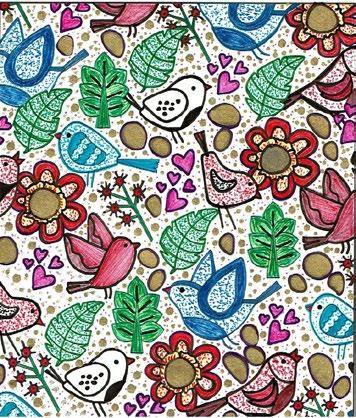

And while we were inundated with entries, and it was a very tough decision, we’re thrilled to announce our four winners, all of whom will be receiving their prize in the mail very soon In no particular order, a big well done to Annie Carter, Anna Killigrew, Sandra Kennedy and Nichola Stibbard!
$14.99, paperback, published by Richardson Publishing. Large Print Colour & Frame - Calm available now from com/product-category/colouringrichardsonpuzzlesandgames. and all other good book retailers. Mindfulness and Relax available September 2023.

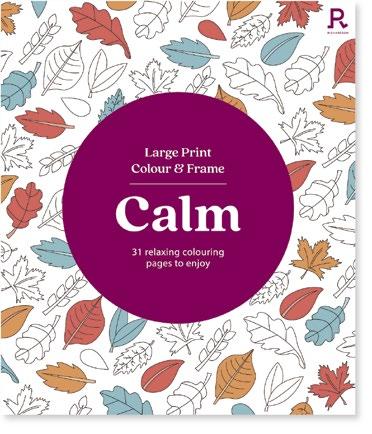
Stibbard, NSW

BURSTWINNER'S BURST
Anna Killigrew, VIC
Annie Carter, SA
Sandra Kennedy, QLD
Nichola
• illustrations. • Perforated enable your • Pages 25cm picture Designed be Large Colour Calm
Select page 1 Tear out & colour 2
BURST AUSTRALIAN CARERS GUIDE I 85
Comic CORNER
If you need a laugh or just want a shift in mood the Comic Corner is for you

How many times could old Noah go fishing? Only twice. He only had 2 worms.
What did the ocean say to the beach? Nothing, it just waved.
"My doctor told me to avoid any unnecessary stress, so I didn't open his bill."


Hey Joseph, you're so lucky that you found Mrs Right and you were able to marry her. Yeah, but what I didn’t know was that she was going to be Mrs Always Right.

I AUSTRALIAN CARERS GUIDE 86
Sorry son, I couldn't find your ball. But look at the bright side, I just saved the family money on my funeral expenses

Hey Edwina, can you believe it?

I called the incontinence hotline the other day and they asked if I could hold. What kind of a question is that I said. Would I be calling you if I could?

How far can a dog run into a forest? Only halfway because after that, it would be running out of the forest. Hehehe
Sorry, Mavis I can't remember which shopping bag has your medications
Why do seagulls fly over the ocean? Because if they flew over the bay, we'd call them bagels.

AUSTRALIAN CARERS GUIDE I 87
ULTIMATE GUIDE TO The
RESIDENTIAL RESPITE CARE
Taking some time out from your usual care routine lets you refresh, relax and recharge, and it can also enhance the wellbeing of the person you’re caring for.
Aged Care Decisions is Australia’s leading free service that helps families find respite and they’ve shared their ultimate guide to using residential respite care to take a well-earned break.
What is residential respite care?
Residential respite care is a temporary stay, either in an aged care facility, or a nursing home.
A short-term placement in a nursing home offers access to quality, professional care 24 hours a day, 7 days a week. You can be confident your loved one is being well looked after, so you can thoroughly enjoy your break!
Residential respite care is usually offered for a minimum of two weeks at a time, and the government subsidises up to 63 days per person, per financial year.
The four main benefits of respite care:
1. Everybody gets a wellearned break. A respite care stay gives everyone a bit of time out, allowing both the carer and the person receiving care to step away from daily routines.
While carers can become overwhelmed and exhausted, despite their desire to help, those being cared for can feel crowded, frustrated by lack of independence, and tired of relying on loved ones for help with daily tasks.
A break from the everyday can have a positive effect on long-term relationships, enabling better care and
While caring for a loved one is rewarding, it can be physically and emotionally demanding.
All images shutterstock
I AUSTRALIAN CARERS GUIDE 88
more harmonious ongoing care arrangements.
Absence really can make the heart grow fonder!
2. A new experience for your loved one
Residential respite care lets your loved one experience a new and different environment. They will meet similarly aged people, join fun group activities, try new things, and start new friendships. A temporary nursing home stay offers a change of scenery, and a bit of an adventure.
3. An opportunity to trybefore-you-buy.
Choosing a nursing home is a big decision. How do you know your loved one will like it? Short term residential
respite lets them ‘try-beforethey-buy’ as they experience nursing home life first-hand.
During a respite stay they will receive the same care as permanent residents, including a room, meals, nursing care, housekeeping, laundry services and access to a program of social activities. After their experience in residential aged care, they’ll know what questions to ask, and what
positives and negatives to look for when they’re ready to look for a permanent placement.
4. Respite care can be used for regular breaks.
Residential respite care is fantastic for older people who need regular short-term care because it can be used in short bursts. Your loved one may be eligible for up to 63 days of government subsidised nursing home care (including emergency care) which can be spread across each financial year.

How to access government-funded respite care
To make residential respite care affordable for everyone who needs it, the
AUSTRALIAN CARERS GUIDE I 89
A break from the everyday can have a positive effect on long-term relationships
Australian Government funds up to 63 days in a nursing home per eligible person per financial year. The 63 days ‘resets’ on 1 July each year. This respite care allowance can be used to access in home care, community respite programs, and shortterm residential respite care stays.

Who is eligible?
Most Australians aged over 65 (over 50 for Aboriginal and Torres Strait Islander people) who need assistance with everyday living, will be able to apply for subsidised respite care.
How to apply for subsidised care
An ACAT assessment is the first step you need to take to access governmentfunded residential respite care. ACAT stands for Aged Care Assessment Team. (In Victoria the term used is ACAS, or Aged Care Assessment Service). ACAT assessments are coordinated by government organisation My Aged Care. You can apply for an assessment online or call My Aged Care on 1800 200 422. The assessment process
considers the applicant’s care needs and will also evaluate their financial situation to determine how much they must contribute to the cost of their care.
How to find respite care vacancies

This is where Aged Care Decisions can help, by saving you time and lots of running around.
Aged Care Decisions is a 100% free service that helps tens of thousands of Australian families find aged care vacancies that suit their needs.
Their custom-built software takes your location,
budget, specific care needs and personal preferences, and creates a tailored aged care Options Report for you. This report narrows your search down to only include vacancies and available providers that match your needs.
Aged Care Decisions can help you at every stage of your aged care journey, whether you’re looking for urgent respite care or are planning for respite care in advance.
Make the most of residential respite care by getting organised in advance.
Pre-planning makes it more likely that you’ll find a good match:
By taking the time to carefully consider factors like location, availability, qualifications, experience, personality traits and service costs, you’ll have
I AUSTRALIAN CARERS GUIDE 90 You can apply for an assessment online or call My Aged Care on 1300 096 200
a better chance of finding a nursing home that closely matches your loved one’s respite care needs. More planning can mean more choices. As they say, the early bird gets the worm.
How to find a respite care vacancy that suits you
suitable nursing home vacancies.
You’ll
avoid stress in an emergency:
By investigating respite care options before you need them, you can avoid scrambling if there’s an emergency or sudden need for care. Getting organised in advance can be particularly important in busy metropolitan areas such as Melbourne, Sydney, and Perth, where demand for respite care services is high.
You can better manage your loved one’s expectations.
Considering respite care options in advance can give both you and your loved one something to look forward to. By ensuring plenty of time for two-way conversations, you’ll be better able to manage your loved one’s expectations and frame a short stay in a nursing home as a positive experience.
Researching residential aged care facilities in your area involves many phone calls and lots of running around. A fantastic alternative is using a placement service to do the hard work for you.
Aged Care Decisions is Australia’s largest, 100% independent aged care placement service. They help over 15,000 Australian families find suitable nursing home vacancies, Home Care Package Providers and respite care options each month.
Aged Care Decisions’ matching service is 100% free for families and can take the stress out of finding a respite care vacancy that suits your loved one.
When you speak to an Aged Care Decisions Placement Specialist on the phone they will take your loved one’s location, budget, care needs and personal preferences, and use custom-built software to match them with current,

From there you’ll receive a customised list of vacancies, an introduction to the nursing homes you prefer, and support throughout your journey to secure and make the most of residential respite care.
You can get started by visiting www. agedcaredecisions.com.au or call Aged Care Decision on 1300 775 870.
Caring for the carers
As a carer it’s important that you make time for you. Time away from your day-today caregiving routine lets you recharge your batteries, relax, refresh, and focus on your personal goals outside of your carer role. You deserve it.
Aged Care Decisions’ FREE aged care & respite placement service can help you find residential aged care vacancies, Home Care Package Providers and respite care options that perfectly suit you. Visit www. agedcaredecisions.com.au to find out more. ACG
AUSTRALIAN CARERS GUIDE I 91
As a carer it’s important that you make time for you.






Presented by 10th - 11th November 2023 International Convention Centre WIN AN ADJUSTABLE QUEEN BED worth $5,000 FREE TO ATTEND REGISTER ONLINE WANT TO EXHIBIT? OR FREECALL 1800 671 588
you care community Connecting to the
When connecting and forming your care community, you deserve to select from only the best.



Outstanding care stems from putting people first and nurturing great connections, and the 2023 Care Expo Sydney is ready to showcase the absolute best in care.


Held at the International Convention Centre, the 2023 Care Expo Sydney is a diverse industry and consumer exhibition, showcasing products, services, and facilities in an established environment where you are heard, valued, and celebrated. Have more choice and more control as you speak one-on-one with approachable exhibitors and integrate care into your life, your way. More than anything, 2023 Care Expo Sydney is about bringing people together to share successes, innovations, and stories.
Be informed and confident when it comes to your care, with the Care Expo Sydney empowering you to live your best life. This event is a must-attend event for carers, clients, and families looking to discover and connect with providers. Now is the time to reach out and discover your care community.

The Care Expo Sydney will provide unparalleled opportunities for business, organisations, providers, and government agencies within care sectors to reach out to event visitors, professional networks, and the wider community. An event like no other - meet the experts ready to transform your care and allow you to embrace life to the fullest!

CareExpo.com.au
f CareExpo i CareExpoAus
PLUS AN SPEAKERSINSPIRING PROGRAMfeaturingKim McCosker from 4 Ingredients& Jean Kittson
SEEKING RESIDENTIAL CARE






In Australia, most aged care facilities are required to have beds for residents with lower financial means. These individuals are often referred to as "low means residents." The government mandates that a certain percentage of residents in aged care facilities fall into this category.
Let’s start with how the cost of aged care is calculated and then look at an example of what that means for someone with low levels of assets and income.
There are five components to the cost of living in aged care: the cost of accommodation, the basic daily fee which covers day to day costs such as facility management, meals and laundry, the means tested
care fee which is used to offset the government funding for your care, the cost of extra or additional services which cover things like entertainment or a glass of wine and your own personal expenses such as medications, birthday presents and clothing.
Regardless of means everyone can pay the basic daily fee, which is set at 85% of the Age Pension, currently $59/day.
The amount you can pay towards your accommodation and means tested care fee are calculated based on a formula that combines an asset tested amount and an income tested amount. For a single person
by
Financial Relief for those $





with assets below $57,000 and income below $31,504/year the accommodation contribution would be zero and there would be no means tested care fee.
The income threshold is based on the income of a full Age Pensioner so assuming you are a full pensioner your income tested amount would be zero. Once your income exceeds the threshold your ability to contribute is assessed at 50c per dollar.
If your assets exceed the $57,000 threshold but are not greater than $193,219 then you can still be classified as a low means resident. Your ability to contribute is based on your assets between the two thresholds calculated at 17.5%.
Determining if you qualify is based on the combined total of your asset and income tested amounts, if it is less than $65.49 per day you are classified as a Low Means Resident.
The amount calculated under the means test is your Daily Accommodation Contribution (DAC). You can pay less than your calculated amount where the government funding
Image
Freepik I AUSTRALIAN CARERS GUIDE 94 I FINANCE I
by
RACHEL LANE FROM AGED CARE GURUS
for accommodation in the facility is less. You can also choose how you pay for your accommodation, you can choose to pay the Daily Accommodation Contribution (DAC) or pay a Lump Sum, known as Refundable Accommodation Contribution (RAC) or pay a combination of the two.
Your Daily Accommodation Contribution (DAC) is converted to a lump sum equivalent using a government set interest rate, currently 7.90%p.a. For example, if your DAC was $20 the equivalent lump sum would be $92,405.
Let’s look at an example: Shirley
Shirley is a full pensioner. She has a home worth $800,000 which her daughter Judy lives in. Judy has been Shirley’s carer for the last 8 years and qualifies as a protected person, exempting Shirley’s home from her aged care assessable assets. Outside her home Shirley has $100,000 in investments and $5,000
in personal assets. The aged care home Shirley is moving to charge $10 per day additional service fee to have a choice of meals, activities, a resident cafe and daily newspapers.

Here’s how Shirley’s cost of aged care would be calculated:
Under the income test Shirley is a full Age pensioner so her income tested amount is zero.
Under the assets test Shirley’s assets are $105,000 (investments + personal assets)
The assets above $57,000 are assessed at 17.5%, which is $23.08 per day.
You may think that $33,600/ year is not enough for an aged care home to provide all of your accommodation, care and services and you would be right! The government provide funding for your accommodation and care directly to the provider. The funding for accommodation depends on the standard of the buildings and the number of low means residents, the maximum funding is $65/day ($23,904/year).
Funding for your care will be provided to your aged care home through what is known as the AnACC
If Shirley pays by DAC
If Shirley pays by RAC
per day/$37,252 a year
per day/$28,828 a year
AUSTRALIAN CARERS GUIDE I 95
There are lots of myths when it comes to aged care, one of the most common ones is “If I don’t have any money, I won’t get in”, it’s simply not true. The Australian aged care system is designed to ensure that people with limited financial means can access aged care.
Daily Accommodation Contribution (DAC) OR Refundable Accommodation Contribution (RAC) $23.08 $106,635 Basic Daily Fee $58.98 Means Tested Care Fee $0 Additional Service Fee $10 Personal Expenses $10
$102.06
$78.98
Shirley’s Cost of Aged Care
(Australian National Aged Care Classification) which will determine your cost of care based on your individual care needs, the shared expenses across all residents based on location and provider and a one off entry payment which could be $130,670/year.
You should feel reassured that you can access quality aged care and while you may not be paying for all of it the cost is being covered.
What if you don’t qualify as low means but can’t afford to pay?
If you don’t qualify as a low means resident but you are unable to pay for your cost of aged care you may qualify for financial hardship assistance.
You can apply for financial hardship assistance with the basic daily fee, meanstested care fee and/or accommodation contribution/ payment. Financial hardship does not apply to extra or additional service fees or lump sum accommodation payments.
To work out if you are eligible for financial hardship assistance the government will look at your assets, your income and your essential expenses.
You can apply for financial hardship if you:
• Haven't gifted more than $10,000 in the last 12 months or $30,000 in the last 5 years.
• Have assets less than $41,496 (unless they are unrealisable or unreasonable to sell or
borrow against) and;
• Have submitted a means test assessment for aged care to Services Australia (Centrelink) or the Department of Veterans' Affairs (DVA).
Assets that may be considered unrealisable include:
• a house that has been on the market for 6 months or more
• a house that has been occupied by a near relative for at least 10 years or occupied by a child with a disability.
• a jointly owned property and the other owner does not want to sell
• a farming property/ies
• a retirement village property
• a compensation payment paid to a spouse/partner
• a misappropriation of funds by a Power of Attorney
• a frozen asset.
In addition to your assets, you will need to provide details of your income and essential expenses, in
$
assessing the application the department will examine if you have 15% of the Age Pension after meeting essential expenses.
Essential expenses include:

• Residential Aged Care expenses, excluding extra or additional services
• Rent or mortgage expenses where a protected person occupies the former home
• Medical and pharmaceutical expenses, including private health, ambulance cover, mobility aids and dental care.
If you are assessed as qualifying for financial hardship there will normally be a timeframe placed on your application for review, typically 12 months. You also need to advise the department within 14 days of any change to your circumstances. If your financial hardship ends then your aged care costs will be re-calculated.
It’s important that you get the care you need. If you find that the cost of your aged care is placing you under financial stress don’t compromise your care, speak to someone about whether you can qualify as a low means resident or for financial hardship support.
* figures in this article are current as at 1 July 2023. ACG

I AUSTRALIAN CARERS GUIDE 96 I FINANCE I
& News VIEWS 8
FIRSTThePRIZE winner will be rewarded $1000with
Annual public art competition, ART AGAINST AGEISM is now open


A competition designed to challenge the negative stereotypes of ageing through art, Australian Multicultural Community Services believes there’s no better way to challenge negative stereotypes of ageing and promote inclusivity than through an exhibition celebrating the beauty and diverse capabilities of older people.
The essence of the competition lies in using art as a medium to combat ageism and embrace the wisdom and experiences of older adults. People from all walks of life are invited to help break stereotypes and promote a more compassionate society. Do your bit to encourage talented people to participate and unite to challenge ageism, fostering a world that values and respects individuals

regardless of their age.
KEY DETAILS ABOUT THE COMPETITION:
Categories: Painting, Drawings, Photography, Graphic Design, or AIgenerated Imagery.
Submission: All are encouraged to apply. Upload your artwork on the Australian Multicultural Community Services website, amcservices.org.au/ artagainstageism/.
NEWS & VIEWS I NEWS & VIEWS I NEWS & VIEWS I NEWS & VIEWS I NEWS & AUSTRALIAN CARERS GUIDE I 97
Trophy illustration by juicy_fish on Freepik
Alternatively, you can e-mail your artwork to marketing@ amcservices.org.au.
Rewards: The first prize winner will be rewarded with $1000 , and the second prize winner will receive $500 .
The winners will not only receive recognition for their exceptional artwork, but all finalists will also have their pieces proudly displayed in public exhibitions. The Australian Multicultural Community Services will continue to promote their mission to combat ageism and celebrate life in all its vibrant forms. The submission deadline is 10 September 2023.
This year the judging panel is made up of people from the following organisations:
• Australian Multicultural Community Services
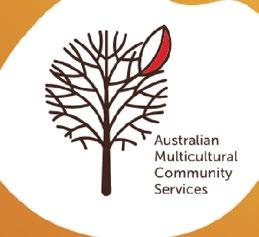
• National Seniors Australia
• Elder Rights Advocacy
• EveryAge Counts
• Municipal Association of Victoria (MAV)
• Australian Communities Foundation (ACF)
PEAK AGED CARE ADVOCACY BODY
24/7
nursing numbers will deliver better aged care
Older
Persons Advocacy Network (OPAN) welcomed the Australian Government’s announcement that most residential aged care homes have successfully met the 24/7 nursing requirements.
“Round-the-clock nursing is key to safe, high quality aged care, including safe, high quality dementia care, which older people and their families have been demanding,” OPAN CEO Craig Gear (OAM) said.
“According to data released today, 86 per cent of providers have met the 24/7 nursing in residential aged care mandate in the first month since it was introduced.

“And on average, there is a registered nurse onsite at a residential aged care home 98 per cent of the time.
“These figures suggest we can now build to significantly improve care for older people living in aged care homes, who now have rapid access to the right level of clinical support.
“We know health-related incidents can occur at any time of the day or night. Round-theclock nursing is also crucial in the delivery of timely and
appropriate palliative care.
“OPAN congratulates the sector, and in particular aged care providers, on achieving this positive outcome in the face of significant workforce challenges.

“We know there has been a focus on the 1 July deadline and this reporting period. A continued focus on retaining and valuing staff will be required to ensure we can sustain and further build upon this successful model.”
Mr Gear noted that the government had granted exemptions to a small number of providers who were struggling to achieve the required staffing levels.
“We acknowledge that rural, regional and remote aged care homes face additional challenges, but the timeline for these exemptions must be clearly defined and regularly reviewed,” he said.
“In such circumstances, older people must have access to alternative arrangements and there must be rigorous oversight of the efficacy of these arrangements.”
Nurse imagee by Freepik
NEWS & VIEWS I NEWS & VIEWS I NEWS & VIEWS I NEWS & VIEWS I NEWS & I AUSTRALIAN CARERS GUIDE 98
News VIEWS &
Innovative ‘STAYING AT HOME’ program launched
Resthaven has launched a new governmentfunded program which aims to support older South Australians living with dementia to stay at home for as long as possible.
The ‘Staying at Home in Regional South Australia’ program forms part of the Government’s response to the Royal Commission into Aged Care Quality and Safety, and aims to provide vital education and support to carers whilst their loved one is cared for in the same location by experienced staff. Resthaven Project Officer, and Dementia Education Specialist, Gillian Schulze, explains, ‘It is estimated that up to 70% of people with dementia are living at home in the community with a family carer.’
‘Unfortunately, carer stress has been identified as reducing quality of life for
both the carer and a person living with dementia.’
‘To address this, the Staying at Home in Regional South Australia program invites small groups of carers and the person they care for to a short-stay retreat.’
‘There, carers receive information and support, whilst the person they care for is supported by trained Resthaven staff 24/7. All meals and activities will be tailored to individual needs and preferences.’
‘By introducing education, and a wide range of support mechanisms, including regular and planned use of respite, Resthaven hopes to address the barriers that carers may face, and improve their access to and experience of respite.’
‘The first Resthaven ‘Staying at Home in Regional South Australia’ program is planned for 28-30 August. It is free for carers and the person
they care for, as the program is funded by the Australian Government Department of Health and Aged Care.’
Further programs will be held from 17-19 October and 20-22 November.
To enquire, email SAHRSA@resthaven. asn.au, or phone 8198 2088.
Established in 1935, Resthaven is a South Australian not-for-profit aged care community service associated with the Uniting Church in Australia.
Every day, Resthaven shares the lives and wisdom of older people and their carers, opening doors to the full range of aged care service options available.
Services are provided throughout metropolitan Adelaide, the Adelaide Hills, Murraylands, Riverland, Fleurieu Peninsula, lower Barossa region and the Limestone Coast of South Australia.

VIEWS I NEWS & VIEWS I NEWS & VIEWS I NEWS & VIEWS I NEWS & VIEWS AUSTRALIAN CARERS GUIDE I 99
It is estimated that up to 70% of people witharedementia living at home










Nutritious Meals, Wellness Checks, Peace of Mind EXCLUSIVE SPECIAL OFFER FOR CARERS: The first 100 people to make a referral and request more information about arranging meals via the QR code will receive a FREE cooler bag gift pack valued at $25! Independence Meals on Wheels helps keep people independent in their own home for longer, where they are happiest Community Assistance We have relationships with other community organisations and can make referrals when necessary Pioneers in Meal Delivery We have been an integral part of local communities for 70 years Nutrition Meals are made by Chefs and developed in conjunction with dietitians. We strive to meet the National Meal Guidelines Wellness Checks Meals on Wheels staff and volunteers ‘check in’ and monitor client wellbeing, escalating any health changes At the Heart of the Local Community We deliver to all Local Government Areas across NSW A U S T F I NA N CI A L SE RVI C ES LICENCE N O. 47 3 14 1 A CN 6 0 2 4 5 8 61 3 Phone now on 1300 853 875 or 0414 535 888 F INANC I A L PL ANNI NG P T Y. LT D . AU S T. F I N AN CI A L S E R V IC ES LIC E NC E N O. 4 7 3 14 1 AC N 6 0 2 4 58 6 1 3 Independent Aged Care Specialist Northern Rivers, NSW or Online consultations! How do we help? Tailor affordable aged care solutions Maximise your pension & concessions Minimise your aged care fees How to keep your home Illustrate your downsizing options Explain the best Home Care outcomes Suppor t you through the maze enquire@primecarefinancial.com.au • primecarefinancial.com.au Litsa Makrangelos can guide you through a range of aged care options to to suit your needs VIDEO & PHONE CONFERENCING AVAILABLE We have a fixed flat fee to complete the aged care financials in a comprehensive 2-hour consultation plus telephone support afterwards AW7226584 Find a stockist near you www.thewondersheet.com.au 07-55 911 629 NDIS, HCP & DVA approved
WINTER FEAST
with Maggie Beer

One of Australia’s most well-known and much-loved cooks, Maggie Beer, has been on an important mission – a food mission for older Australians that is.

For more than five decades, we have grown to witness and experience her unbridled passion and joy around food. Maggie’s grassroots, no-nonsense approach to wholesome and local produce, have been the catalyst for creating
hundreds of mouth-watering recipes which have been embraced in homes all around Australia. To learn more about her online training modules, please visit The Maggie Beer Foundation Website maggiebeerfoundation.org.au
AUSTRALIAN CARERS GUIDE I 101
MUSHROOM & LENTIL
sausage rolls

I AUSTRALIAN CARERS GUIDE 102 I RECIPES I
Images courtesy of Maggie Beer Foundation and illustrations by vectorpocket on Freepik
Maggie takes the familiar sausage roll, incorporates flavour, and wellbeing, adding ingredients.
Preparation 30 minutes
Cooking 30 minutes
Makes 24 pieces
INGREDIENTS
25ml extra virgin olive oil
1 onions (130g), chopped
2 garlic cloves, minced

0.5 Tblsps (2g) fresh thyme leaves
15g butter
150g mushroom, cut into 6
1 (80g) carrots, grated
20g flat leaf
parsley chopped
90g cooked brown lentils
80g rolled oats
¼ cup (20g) bread crumbs or ground almonds
80g Persian fetta
1 eggs
Sea salt flakes & ground black pepper
2 sheets butter puff pastry
1 egg yolk, splash of milk
Sesame seeds (optional)
Tomato chutney to serve TIP
METHOD
1. Pre heat a fan forced oven to 220c
2. Line 2 oven trays with parchment paper.
3. Place a medium saucepan over medium heat, add olive oil and chopped onion, cook for five minutes
4. Add garlic, thyme, some salt and butter, cook for a further three minutes until the onion is translucent and soft.
5. Increase the heat to high, add chopped mushrooms and cook until soft, reduce the heat to medium low, stir occasionally until all the liquid is evaporated.
6. Remove from the heat and place mix into food processor, along with remaining ingedients - pulse until the mix is brought together, keeping some texture, check the seasoning.
7. Place sheets of puff pastry onto a lightly floured surface and cut in half, so you have 4 pieces in total.
8. Brush each top and bottom edge of the pastry with egg yolk and milk mix.
9. Place ¼ of the mushroom and lentil mix in a long even line. Using pressure, roll the puff pastry around the filling, finishing so the yolk brushed edge is on the bottom of the roll,
10. Place on prepared tray and repeat with the remaining rolls - you should have 4 rolls in total.
11. Brush tops with egg yolk and milk mix (and sesame seeds if using).
12. Place into preheated oven and bake for 20 minutes until lovely and golden, reduce the heat to 190c and cook for a further 10 minutes.
13. Transfer to a cooling rack, cut and serve with chutney.
AUSTRALIAN CARERS GUIDE I 103 I RECIPES I
Make ahead and freeze raw, simply defrost on trays and bake on the day
KALE &


with Chickpea
Delicious, nutritious and packed with flavour.
1.5 cups cooked chickpeas (135g dried chickpeas, soaked in cold water overnight, cooked)
35g brown rice flour
2 Tablespoons Cornflour
½ teaspoon sea salt
½ teaspoon baking powder
¼ cup Extra Virgin olive oil
FOR THE FILLING
¾ cup currants
½ cup verjuice
¼ cup extra virgin olive oil
40g butter
4 round shallots
½ tsp crushed garlic
¼ cup verjuice
½ cup pine nuts- toasted
1 Tablespoon preserved
lemon rind- finely chopped

2 bunches cooked kale
4 eggs
Sea salt and pepper
¾ cup sour cream
TO GARNISH
100g crème fraiche
100ml Extra Virgin Olive Oil
¼ cup reserved verjuice
soaked currants
¼ cup toasted pine nuts
I AUSTRALIAN CARERS GUIDE 104 I RECIPES I
PINENUT TART
crust & Lemon Crème Friache
METHOD
1. Soak the currants in ½ cup (125 ml) of the Verjuice overnight to soften. Alternatively, place the currants and verjuice in a microwavesafe container and microwave on low for 4 minutes, then set aside for 20 minutes to reconstitute.
2. Drain and rinse the soaked chickpeas. Place in a medium sized saucepan and cover with 4 times the amount of water to chickpeas. Bring to the boil, turn down to a simmer and cook for 30minutes or until tender (not falling apart). Skim any foam that rises to the top of the pan off. Once cooked drain well and set aside to cool.
3. Pre heat a fan forced oven to 180c.
4. Place the pine nuts on a tray and roast for 6 minutes or until golden.
5. Place the chickpeas in a food processor and pulse until finely ground. In a bowl combine the brown rice flour, cornflour, salt and baking powder, add to the food processor with
the chickpeas, pulse. Add the olive oil and just bring together, turn mix onto the bench and shape into a rectangle 20x10cm.
6. Grease 35cmx 13cm rectangular non-stick fluted tart dish, place the rectangular shaped crust inside and press evenly across the base and up the sides of the pan. Once the tart base is evenly covered with the crust, place into the pre heated oven and cook for 8-10 minutes, until light golden. Don’t be tempted to cook too long as the pastry will start to crack.
7. Meanwhile, blanch the kale in a large saucepan of boiling water for 5–10 minutes or until softened (the cooking time will depend on how coarse the kale is). Drain and set aside until cool enough to handle, then squeeze excess water from the leaves and roughly chop.
8. Melt the butter with the Oil in a large frying pan. Add the shallot and garlic and cook, stirring occasionally, over low–medium heat
for 5 minutes or until softened. Increase the heat to high, then add ¼ cup verjuice and cook, stirring, until the verjuice has evaporated.
9. Transfer this mixture to a food processor, add the chopped kale and any remaining liquid and blend to a puree.
10. Place the kale puree, ½ cup of the verjuice soaked currants, ¼ cup of the toasted pine nuts and Preserved Lemon in a large bowl and stir until well combined.
11. In a small jug, whisk together the sour cream, eggs, salt and pepper, then stir into the kale mixture.
12. Carefully pour the filling into the tart shell and bake for 25 minutes or until just set in the centre.
13. Remove from the tin, slice a piece approximately 6cm across and place on the plate. Serve straightaway scattered with a few extra pine currants, a generous tablespoon of crème fraiche and a drizzle of Extra Virgin olive oil. ACG
AUSTRALIAN CARERS GUIDE I 105 I RECIPES I
Images courtesy of Maggie Beer Foundation and illustrations by vectorpocket and brgfx on Freepik


wellness products A brighter way to shop for At BrightSky, we’re about supporting you on your unique path through wellness, to help you maintain and improve your health and support you to live your best life. Our convenient, online shop delivers an extensive range of healthcare products : Shop our reliable, discreet, home delivery service now. www.brightsky.com.au orders@brightsky.com.au 1300 886 601 Continence Skin Care Respiratory Products Nutritional Supplements and Specialised Foods Wound Care Personal Protection Equipment (PPE)
&
Fun Games
Improve your memory, concentration and reasoning. The benefits of puzzles are numerous. They maintain or develop problem-solving skills, and help you relax.
Find the words in the grid?
They will be placed only once and may be either horizontal, vertical or diagonal and go either forwards or backwards. Words can cross.
C A E Z T A M S T E R D A M R A O S P U S L G P W Z T O B P N S F Y S O A T H E N S V R S B Y D U N L A Z K S N I M A I E U P D A Z B E I J I N G T R R R O W E L L I N G T O N I A R N S K O I G L G S A U N S P A Q H T U O I R E A J Q I L W T N F N O S S R D A E P L A R E I T V B C A L A I L Y B V C K L S O Q H K R O N R V U A O W R N M C S H H H I N D D H Y N E I U R I G A O E B E A O K D B B K S F T O C L A V I M O H E L S I N K I R R M Z J V T AMSTERDAM ATHENS BEIJING LONDON MADRID MINSK
Capital Cities
WORDSEARCH AMSTERDAM ATHENS BEIJING BERLIN BRATISLAVA BUCHAREST CANBERRA DUBLIN HELSINKI LISBON LONDON MADRID MINSK OSLO PARIS RIGA STOCKHOLM TOKYO VIENNA WELLINGTON
solutions
120page
AUSTRALIAN CARERS GUIDE I 107 I FUN & GAMES I BURST BURST
All
on
CROSSWORD 1 2 3 4 5 6 7 8 9 10 11 12 13 14 15 16 17 18 19 20 21 22 23 24 25 26 27 28 29 30 31 32 33 34 35 36 37 38 39 40 41 42 43 44 45 46 47 Complete the crossword clues to fill the grid. All onsolutions 120page I AUSTRALIAN CARERS GUIDE 108 I FUN & GAMES I
JUMBO
ACROSS
9 Performer (11)
10 No longer in fashion (8)
12 Dismissed as insignificant (9)
13 Incalculable (11)
14 Last (8)
16 Spoil (anag.) (5)
19 Bird sound (5)
20 Very typical of a kind of person (10)
22 Cuts off (9)
25 Small stones (7)
28 Conventional (11)
30 Argumentative (11)
31 Dissolution of a marriage (7)
33 Most irate (anag.) (9)
35 Railway vehicle (10)
37 Less common (5)
39 Wound from a wasp (5)
42 Strongholds (8)
44 Showing a desire to win (11)
45 Purity; lack of guile (9)
46 Base of a statue (8)
47 Verify again (6-5)
DOWN
1 Remove restrictions from (10)
2 Rigid; stern (6)
3 Loyal and hard-working (8)
4 One under par in golf (6)
5 Mustang; wild horse (6)
6 Art of growing dwarfed trees (6)
7 Firmly fixed (6)
8 Season of the Church year (6)
11 Popular or colloquial (7)
15 Item used by asthma sufferers (7)
16 Prevent from continuing (4,3,4)
17 Lacking energy (9)
18 Devoted time to learning (7)
21 Medley of dried petals (9)
23 Singing voice (5)
24 Find an answer to (5)
25 Wound the pride of (5)
26 Strong gust of wind (5)
27 Military gestures (7)
29 Asked to come along (7)
32 Rich dessert (10)
34 Acts of union (7)
36 Afternoon performances (8)
37 List of ingredients for a dish (6)
38 Put right (6)
40 Gossip (6)
41 US state whose capital is Carson City (6)
42 Ascends (6)
All onsolutions 120page
Find as many words of three or more letters in the wheel as you can. Each word must use the central letter and a selection from the outer wheel – no letter may be used more times than it appears in the wheel. Can you find the nine letter word hidden in the wheel?
X E E
T M Y
43 Flattened out (6) R E L
E P R O D C
T E T
WORDWHEEL
AUSTRALIAN CARERS GUIDE I 109 I FUN & GAMES I
SU DOKU
Looking for a mental challenge? This editions brainteasers will really get those cogs whirling!
All onsolutions 120page
LOVE PUZZLES & QUIZZES?
All puzzles are kindly supplied by Richardson Puzzles & Games. Sign up for their email newsletter to receive a FREE printable puzzle and access the FREE Friday Quiz every weekrichardsonpuzzlesandgames.
4 7 2 5 6 7 6 8 1 4 8 2 5 8 9 3 1 9 6 5 5 6 4 3 1 6 4 9 3 8 4 5 8 1 9 4 1 9 6 8 6 2 6 3 4 2 7 2 1 6 8 9 5 2 7 9 5 2 4 6 1 2 8 1 6 3 5 1 7 2 4 3 5 6 4 5 7 8 3 3 1 5 2 4 2 7 5
EASY MEDIUM HARD
com/newsletter
I AUSTRALIAN CARERS GUIDE 110 I FUN & GAMES I
↓ ↓ 3 LETTERS Fez Gig Hop Row Way 5 LETTERS Girls Kenya Moult Peels 6 LETTERS Pathos Shrike 7 LETTERS Graphic Heather Isotope Promote Sardine Torches Tottery 9 LETTERS Behemoths Rigmarole KRISS
3 Fez Gig Hop Row Way 5 Girls Kenya Moult Peels 6 Pathos Shrike 7 Graphic Heather Isotope Promote Sardine Torches Tottery 9 Behemoths Rigmarole Find the path out without breaking through walls. SQUARE MAZE All solutions on page 120 AUSTRALIAN CARERS GUIDE I 111 I FUN & GAMES I
KROSS
Complete the clues to fill the grid. The arrows show direction the answer should be placed.
Wearing glasses Impassive Intellectual giant Discharge In such a manner; thus Labels Gastropod molluscs Not usual Not seen very often Borders Daisy-like flower Apparently Bring to the conscious mind Sudden fear Wonderful Modify Alike Hand over Computer core (inits) Complete failure Regions Mission Bathroom mineral powder Ten-cent coin (US) Alias initials Stomach (informal) Very small fish Criticise strongly Old Carter: snooker player Inlets __/_ matter of fact: actually (2,1) Water droplets formed at night Monetary unit of Romania Brazilian dance Tree Folds in a material Less than average tide Run quickly Lyric poem Ewer (anag) Deviate off course Wetlands Increase in amount Bequeath an income to Summer time setting (inits) Gun Dry (of wine) Feared greatly Utilise Sculptured symbol Intense beams of light School of Mahayana Buddhism Morals
120page I AUSTRALIAN CARERS GUIDE 112 I FUN & GAMES I
JUMBO ARROW-WORD All onsolutions
CODEWORD
Can you crack the entire code to complete the crossword grid?
Each number from 1-26 represents a letter of the alphabet from A-Z. Every letter appears in the grid at least once, and is represented by just one number. We’ve given you 3 letters to help you start.
1 4 14 15 23 4 24 8 16 9 13 16 8 7 19 11 25 24 13 8 4 12 11 25 16 9 4 2 25 7 8 24 25 6 1 4 11 25 6 1 25 11 18 16 18 8 8 6 5 22 18 6 8 1 19 6 12 25 4 21 11 12 2 8 7 8 4 6 25 18 10 8 13 9 16 12 16 18 18 7 25 16 8 17 18 22 6 13 19 6 2 20 18 6 17 26 6 25 17 22 6 25 19 1 18 22 11 25 7 8 26 8 12 19 16 4 12 18 22 6 25 6 8 12 25 11 22 1 8 4 26 18 13 13 4 1 13 6 11 3 4 A B C D E F G H I J K L M N O P Q R S T U V W X Y Z 1 2 3 4 5 6 7 8 9 10 11 12 13 P 14 15 16 17 18 19 20 21 22 23 24 25 26 Q O
onsolutions
AUSTRALIAN CARERS GUIDE I 113
All
120page







Abbreviations
ACAT
AGED CARE ASSESSMENT
TEAM: Helps the elderly and their carers determine what kind of support will best meet their needs when they are struggling in their current living situation.
ACAS
AGED CARE ASSESSMENT SERVICE (VICTORIA): Only provides teams who help frail older people and their carers, to work out what kind of care will best meet their needs. After each assessment, a patient’s level of support and service needs are recommended.
ACF/ACH
AGED CARE FACILITY OR AGED CARE HOME: Accommodation for older people who can no longer live at home independently, who require help/support for everyday tasks/health care.
ACIA
AGED CARE INDUSTRY ASSOCIATION (ACIA): Association of aged care providers, whose members operate residential aged care, home care, home support and retirement living services.
ACS
AGED CARE SERVICES: Support and services provided to older people in their own home or in an aged care home to assist with everyday living, health care, accommodation and equipment.
ACSA
AGED & COMMUNITY SERVICES
AUSTRALIA: The leading national peak body supporting not-for-profit, church and charitable providers of retirement living, community, home and residential care.
ADL
ACTIVITIES OF DAILY LIVING: Refers to the basic skills needed to properly care for oneself and meet one’s physical needs in six areas: eating, dressing, bathing, toileting, continence, and mobility. It’s used as an indicator to determine the level of care and supportive services needed in senior’s care plan.
AIP
AGEING IN PLACE: Indicates that a resident can enter an aged care facility at low care and can remain there as their care needs increase to a high care.
ATSI
ABORIGINAL TORRES STRAIT ISLANDER CA
CARERS AUSTRALIA: The national peak body representing Australia’s unpaid carers, advocating on their behalf to influence policies and services.
CBC
CENTRE BASED CARE: For elderly people who require low to medium living support, group activities, excursions and social support are provided in a local centre.
CC COMMUNITY CARE: Personalised care and support services to help the elderly continue living at home.
CDC
CONSUMER DIRECTED CARE: is a term used in the aged care sector to explain a way of providing services that allows those receiving services to make choices about the types of services they want, and who should provide them.
CHSP
COMMONWEALTH HOME SUPPORT PROGRAM: The entrylevel home support program assists older people to live independently in their homes and communities. It also provides respite services to give carers a break.
COTA
COUNCIL ON THE AGEING: Provides leadership in social policy and community information, and education for older persons.
CRCCs
COMMONWEALTH RESPITE & CARELINK CENTRES: Assists carers by providing access to information, respite care & other support appropriate to carers’ needs and circumstances, and the needs of those they care for.
DAP
DAILY ACCOMMODATION PAYMENT:Is the daily nonrefundable payment for accommodation in an aged care home. It can be paid regularly up to a month in advance, similar to paying rent.
Cut and keep
✀ I AUSTRALIAN CARERS GUIDE 116
DOH
DEPARTMENT OF HEALTH: Develops and delivers policies and programs and advises the Australian Government on health, aged care and sport.
DTC
DAY THERAPY CENTRE: Offer a range of services (physiotherapy, podiatry, occupational therapy) for older people living independently either in their own home, or aged care homes.
HC
HOME CARE: Services/support given to older people with care needs to live independently in their own homes.
HCP
HOME CARE PACKAGES: A program funded by the Australian Government to support older people with complex care needs to live independently in their own homes. They use a consumerdirected care approach to ensure the support suits a person’s needs and goals.
HCS
HOME CARE SERVICE(S): Support/care services provided to an elderly person in their own home.
ILU
INDEPENDENT LIVING UNIT: A small home designed for older people who are actively independent, usually in a village environment.
MAC
MY AGED CARE: Provides the entry point to the Australian Government Funded aged care services for the general public.
NDIS
NATIONAL DISABILITY
INSURANCE SCHEME: NDIS provides information and connections to services for people with disability. The scheme also provides support for their families and carers.
NESB
NON-ENGLISH-SPEAKING BACKGROUND
NSA
NATIONAL SENIORS ASSOCIATION: Is a not-for-profit membership organisation and advocacy group of working and retired older Australians.
OPA
OFFICE OF PUBLIC ADVOCATE OPAN
OLDER PERSONS ADVOCACY NETWORK: An agency that can provide information to consumers their families and carers about their rights and responsibilities when accessing aged care services.
RAD
REFUNDABLE ACCOMMODATION DEPOSIT: Is a lump sum payment for accommodation in an aged care home. This is the price of a room, in lump sum form that you have agreed with your aged care home to pay and is fully refundable when you leave the aged care facility.
RAS
REGIONAL ASSESSMENT SERVICE: Is the program which undertakes aged care home support assessments.
RC
RESPITE CARE: Services designed to give carers a break from their caring role during planned or regular breaks, short holidays or emergencies.
RV
RETIREMENT VILLAGE: Group of residential premises predominantly occupied by senior citizens who live in apartment style rooms /suite of rooms.
SM HCP
SELF-MANAGED HOME CARE PACKAGES: A program funded by the Australian Government to support older people with complex care needs to live independently in their own homes. The elderly package receiver can choose the provider(s) and services given, including the workers or contractors, when the services are provided and can control how the funding is spent.
STRC
SHORT-TERM RESTORATIVE CARE: A program which provides services to older people for up to 8 weeks (56 days) to help them delay or avoid long-term care.
VHC
VETERAN’S HOME CARE: Home care for eligible veterans, war widows/widowers through the department of Veterans’ Affairs.
Cut and keep
When it comes to Aged Care, acronyms are plentiful…ACSA, HCP, CHSP… But what do they all mean? Fear no more. We’ve compiled a list of the most commonly used ones – how they work.
✀ AUSTRALIAN CARERS GUIDE I 117
2 YEAR (8 ISSUES) $59 + GST 40% SAVINGS 1 YEAR (4 ISSUES) $42 + GST 20% SAVINGS



















SUBSCRIBE TODAY NEVER MISS AN ISSUE OF SUBSCRIPTIONDELIVERED TO YOUR DOOR FREE SAVE 40% OFF NEWS STAND PRICE UPTO BENEFITS OF A SUBSCRIPTION: • Save $$$ OFF the news stand price • Have the guide delivered to your door • Includes a FREE digital copy of the guide • And you’ll never miss a copy! INCLUDES DELIVERY ONLINE ORDERS: Please visit: australiancarersguide.com.au/shop OR CALL: 1300 717 515 Free Call Mon to Fri 9am to 5pm Considering aged care for a loved one? At Bupa Aged Care, whether for respite short-stay or as a new home, our experienced registered nurses and carers provide the care each resident needs in the way they prefer. Care is first and foremost. New residents welcome. For more information or to book a visit, call 1800 785 509 and mention this ad to access the Australian Carers Guide Reader’s respite offer (Ts&Cs apply).* We embrace and support residents to live their day their way, with teams dedicated to their well-being. People rarely expect to need aged care, but if your family does, we’ll guide you through the steps. *Offer details and Ts&Cs available at bupaagedcare.com.au/carer offerRespite for readers* FOR ALL THOSE CARING FOR AN ELDERLY LOVED ONE ISSN 2652-8282 9 > 772652 828004 03 KEEP WARM THIS WINTER WITH COLOUR Do you need help? CARERS GATEWAY explained InterviewExclusiveWith ITA BUTTROSE JEAN KITTSON When do you know it’s time to move Part 2 8 PlusMAGGIE WinterdeliciousBEER delights I WINTER 2023 I $9.95 Fun & Game quizzes,Puzzles,jokes, wordgames &recipesdelicious Tips on MAKING HOMEYOUR SAFE Enter our colouring competition and Win! autraliancarersguide.com.au Why do we feel SAD What is Seasonal Affective Disorder? NSW/ACT AUSTRALIAN CARERS GUIDE WINTER 2023
Offer valid in Australia only. Price includes delivery. Please allow 2 to 4 weeks for delivery. I AUSTRALIAN CARERS GUIDE 118
Choice Editor's
From innovative apps to must-read books, here’s what we’re loving right now!
AN APP WE LOVE
If taking pills, vitamins or supplements is part of your every-day to-do list, why not try an app to help you remember when and what to take. Having a reminder about which medications to take and when can be handy, especially if you’re someone that takes them every day. An app that notifies a person when to take specific medications, this sort of app can be downloaded on either a smartphone or another electronic device.
PILL REMINDER PRO
Pill reminder is an alarm app that will remind you to take your medicines on time. Just add all your medicine doses and relax.

• Schedule all your medicines in one beautiful app
• Set reminders for daily medicines, weekly medicines and medicine on alternate days.
TREAT YOURSELF
Why not treat yourself to a copy of My Life Story – So Far. The book is divided into nine sections, starting with "The Early Years." Each page comes with a new thought-provoking prompt meant to spark colorful memories.

• Use Dialing or SMS to remind someone you care take medicines.
• Option to edit reminders.
• View upcoming medicines.
• Dismiss reminders in advance if you took the medicine ahead of time.
• Snooze reminders
A READING RECOMMENDATION
From Age-Ing to Sage-Ing: A Revolutionary Approach to Growing Older
In this inspiring and informative guide, Reb Zalman shares his wisdom and experience with readers. He shows readers how to create an aging process for themselves that is full of adventure, passion, mystery, and fulfillment, rather than anxiety. Using scientific research--both neurological and psychological-- Reb Zalman offers techniques that will expand horizons beyond the narrow view of "the present" into a grand and enduring eternity. By harnessing the power of the spirit, as well as explaining exactly how to become a sage in their own community, he gives readers a helpful and moving way to use their own experiences to nurture, heal, and perhaps even save a younger generation from the prison of how we typically regard aging.

AUSTRALIAN CARERS GUIDE I 119
PUZZLE SOLUTIONS
Square Maze
D S S B B B S A
E N T E R T A I N E R O U T D A T E D
R R A R O N E A V
B E L I T T L E D I N E S T I M A B L E
G C W I C A O L N
U L T I M A T E P O L I S T W E E T
L N R U E T I
A R C H E T Y P A L T R U N C A T E S
T A O L H D E O
P E B B L E S T T R A D I T I O N A L
I L E A P H R E N O V
Q U A R R E L S O M E G D I V O R C E
U S U U P I I H
E S T I M A T O R L O C O M O T I V E
E E R U A E E
R A R E R S T I N G C I T A D E L S
E E G A E L I V E
C O M P E T I T I V E I N N O C E N C E
I E R T A M E N A
P E D E S T A L D O U B L E C H E C K
E Y E A S S D E
Word Search
Word Wheel
EXTREMELY
eel, elm, emery, exert, extreme, extremely, eye, eyelet, lee, leer, let, lexeme, lye, lyre, meet, melee, melt, melter, mere, merely, met, mete, meter, metre, reel, rely, rye, tee, teem, telex, term, termly, tree, tyre, xylem, yet
TARGET: 20, GOOD: 27,
EXCELLENT: 32
PROTECTED
cot, crept, deport, depot, detect, detector, deter, dot, dote, erect, octet, opt, opted, otter, pert, pet, peter, petted, poet, port, ported, pot, potted, potter, pottered, protect, protected, recto, rot, rote, rotted, tee, teed, toe, toed, top, tor, tore, tort, tot, tree, trod, trope, trot
TARGET: 24, GOOD: 33,
EXCELLENT: 40
C
E Z T A M S T E
M
A O S P U S L G P W Z
O B P N S F Y S O A T H E N S V R S B Y D U N L A Z K S N I M A I E U P D A Z B E I J I N G T R R R O W E L L I N G T O N I A R N S K O I G L G S A U N S P A Q H T U O I R E A J Q I L W T N F N O S S R D A E P L A R E I T V B C A L A I L Y B V C K L S O Q H K R O N R V U A O W R N M C S H H H I N D D H Y N E I U R I G A O E B E A O K D B B K S F T O C L A V I M O H E L S I N K I R R M Z J V T 8 3 4 1 7 9 2 5 6 7 6 5 3 2 8 4 9 1 1 2 9 5 4 6 3 8 7 2 4 7 6 3 5 8 1 9 3 8 1 2 9 7 6 4 5 5 9 6 4 8 1 7 2 3 9 1 3 8 6 2 5 7 4 6 7 2 9 5 4 1 3 8 4 5 8 7 1 3 9 6 2 4 7 2 8 5 1 3 6 9 6 3 9 7 4 2 1 8 5 8 1 5 6 9 3 7 4 2 7 2 1 4 3 6 9 5 8 3 8 6 9 2 5 4 7 1 9 5 4 1 7 8 2 3 6 2 9 3 5 8 4 6 1 7 5 6 7 3 1 9 8 2 4 1 4 8 2 6 7 5 9 3 5 4 3 7 1 8 9 2 6 1 9 8 6 2 3 4 5 7 6 2 7 9 5 4 3 8 1 3 5 9 1 4 2 6 7 8 7 8 2 5 3 6 1 9 4 4 6 1 8 9 7 2 3 5 9 3 5 4 8 1 7 6 2 8 1 6 2 7 9 5 4 3 2 7 4 3 6 5 8 1 9 B T A E D G E S A S T E R S E E M I N G L Y A P A N I C S U P E R E D I T S G I V E C P U F I A S C O T A S K M A K A P A N T I D D L E R C T A L I E L E U L A M B A D A E L M C R E A S E S A D D Y A W E N D O W S F D R E A D E D U S E L A S E R S Z E N G L Y P H E T H I C S D S Z Q W S B E R Y L R E P U T A B L E S M T A R Y S C A P E B A N D S T A N D A T I R I E E N J O I N E D U N M A S K T M C E P E S N A I V E L Y R M R I I P A R E G I O N L U N C H I N G F N A G O N A U D I O T A P E F E M U R S M I O N A N E M A T O D E S F I L L S D L N T X S G K I E G I R L S N R H T O T T E R Y I W R O A G R A P H I C I R M Y K F S C A B E H E M O T H S S R Z T E A O O S R L M P P D E O H E A T H E R I U E O R N L L P R O M O T E P A T H O S W R E L T M Y X E E E P R O D C T E T
A
R D A
R
T
HARD MEDIUM EASY ↓ ↓
Jumbo Crosssword
Jumbo Arrow-Word
Kriss Kross
Codeword
Su doku
I AUSTRALIAN CARERS GUIDE 120 I FUN & GAMES I
EMERGENCY MEDICAL CARE 000 (TRIPLE 000)
HELPFUL CONTACTS CRISIS - EMERGENCY - INFORMATION : INSTANT HELP AVAILABLE BELOW
Emergency assistance 000 (24 hours/7 days) Lifeline’s 24/7 service 13 11 14 Suicide Call Back 1300 659 467 24/7 counselling service Beyond Blue’s support 1300 22 46 36 SANE Australia’s service 1800 187 263 Carer Gateway 1800 422 737 NSW Mental Health Line 1800 011 511 ACT Mental Health Triage Service 1800 629 354 SA Mental Health Triage Service 13 14 65 NT Crisis Assessment Triage Service 1800 682 288 WA Mental Health Emergency Line 1800 676 822 QLD 24-hour mental health care 1300 642 25 TAS Mental Health Services Helpline 1800 332 388 MindSpot Clinic - for adults with anxiety or depression 1800 61 44 34 QLife’s support service 1800 184 527 National Dementia Helpline 1800 100 500 Centrelink for Carers & Disability 13 27 17 Aged & Disability Advocacy 1800 818 338 Centrelink for ABTSI 1800 136 380 Centrelink for older Australians 13 23 00 Department of Veterans Affairs 1800 555 254 My Aged Care 1800 200 422 Medicare 13 20 11 Elder Abuse Prevention 1300 651 192 Translating and Interpreting Service (TIS National) 13 14 50 and 1800 131 450 National Continence Helpline 1800 330 066 Healthdirect for a nurse triage service 1800 022 222 (all states except for Victoria) NURSE ON CALL 1300 60 60 24 for health help from registered nurses in Victoria Poisons Information Centre 131 126 for 24/7 assistance Sexual assault/domestic and family violence counselling 1800 RESPECT 1800 737 732 Gambler’s Help hotline 1800 858 858 24/7 Australian Men’s Shed Association 1300 550 009 MensLine Australia 1300 78 99 78 helping men deal with relationship problems LGBTI peer support 1800 184 527 Mon–Thurs 6 pm–10 pm, Fri–Sun 6pm–9pm National Alcohol and Other Drug 1800 250 015 National Debt Helpline 1800 007 007 Relationships Australia 1300 364 277 relationship support services Translating and Interpreting Service Dementia Support Australia 1800 699 799
CONTACTS l CRISIS l EMERGENCY l INFORMATION: INSTANT HELP AVAILABLE BELOW
HELPFUL
Respite offer for readers*
Considering aged care for a loved one?
At Bupa Aged Care, whether for respite short-stay or as a new home, our experienced registered nurses and carers provide the care each resident needs in the way they prefer. Care is first and foremost.
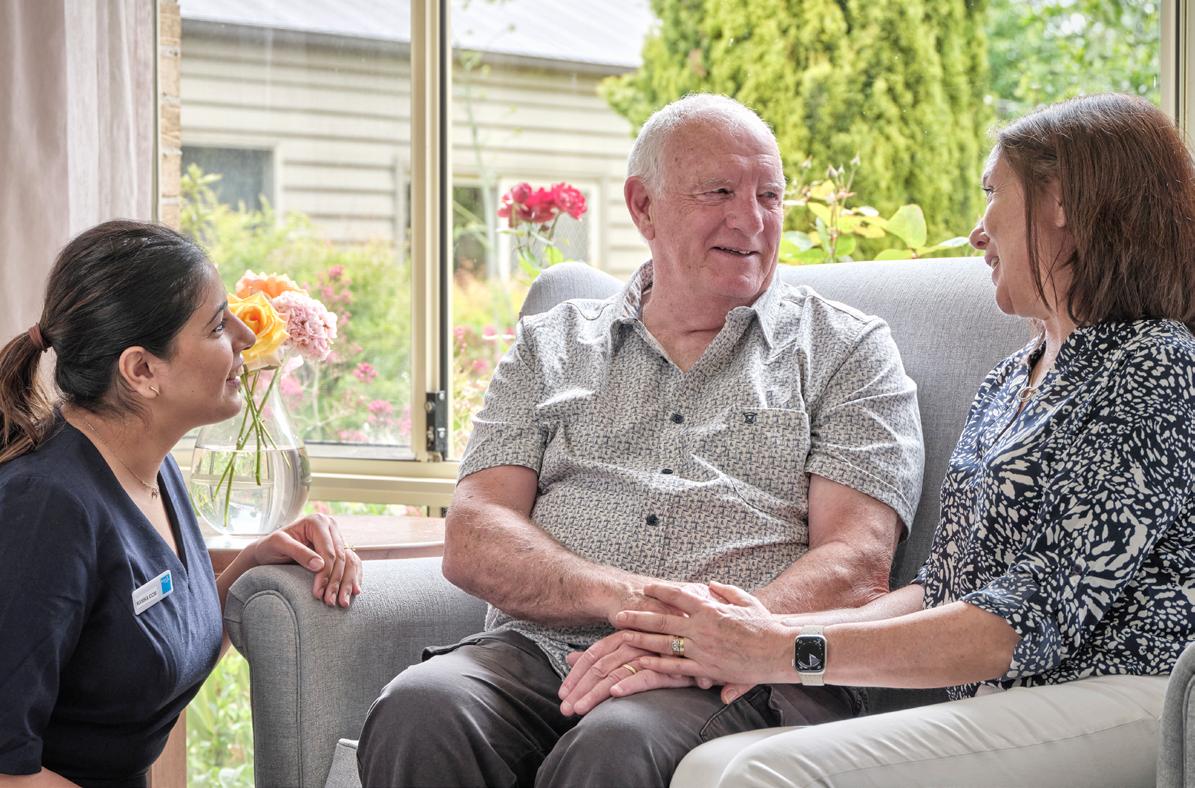
We embrace and support residents to live their day their way, with teams dedicated to their well-being.
People rarely expect to need aged care, but if your family does, we’ll guide you through the steps.
New residents welcome.
For more information or to book a visit, call 1800 785 592 and mention this ad to access the Australian Carers Guide Reader’s respite offer (Ts&Cs apply).*
*Offer details and Ts&Cs available at bupaagedcare.com.au/carer









































 All images by freepik
All images by freepik

















 BY PAULK
BY PAULK














































































































































































































































































 Swimming is a wonderful way to get a cardiovascular workout
Swimming is a wonderful way to get a cardiovascular workout





























































































